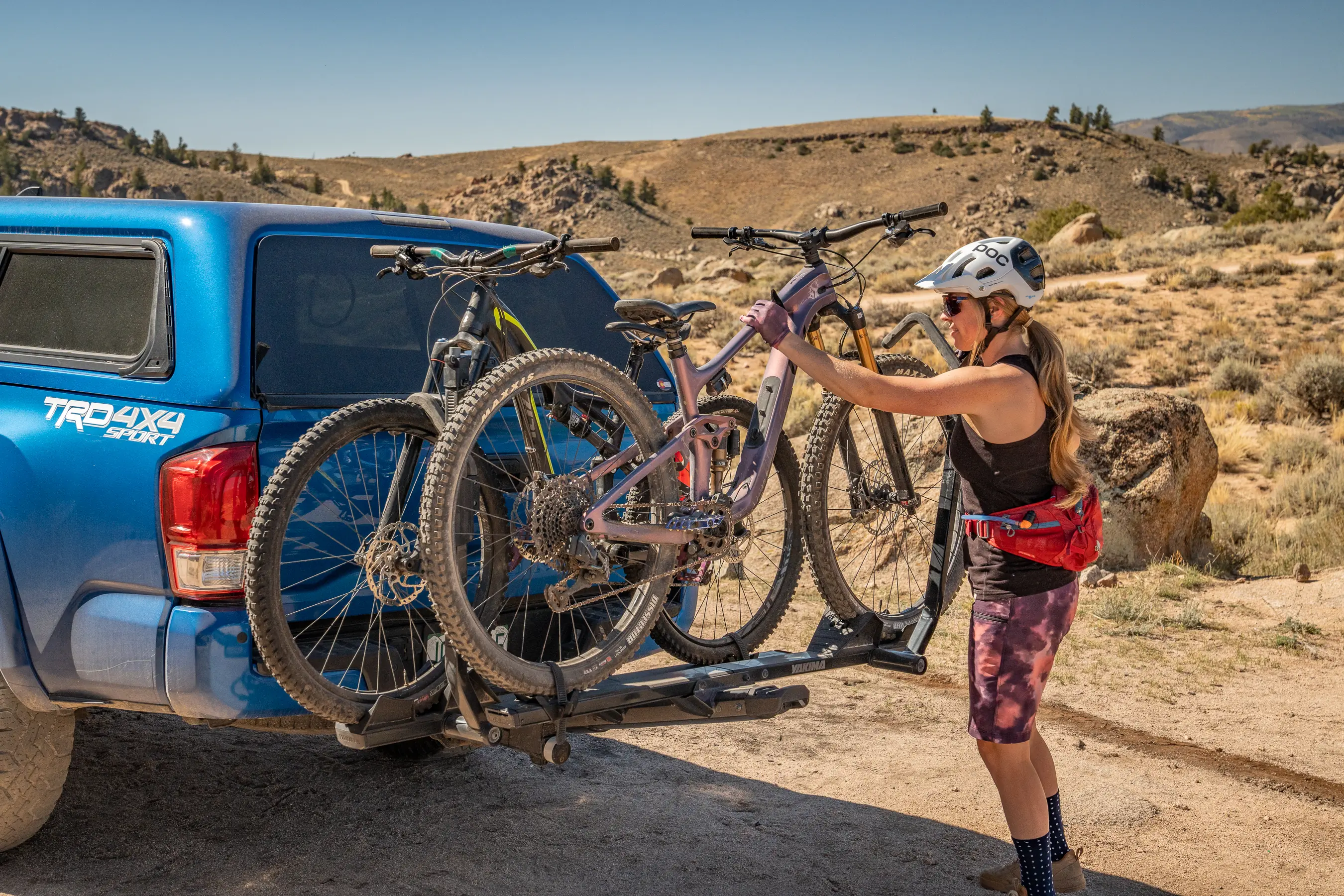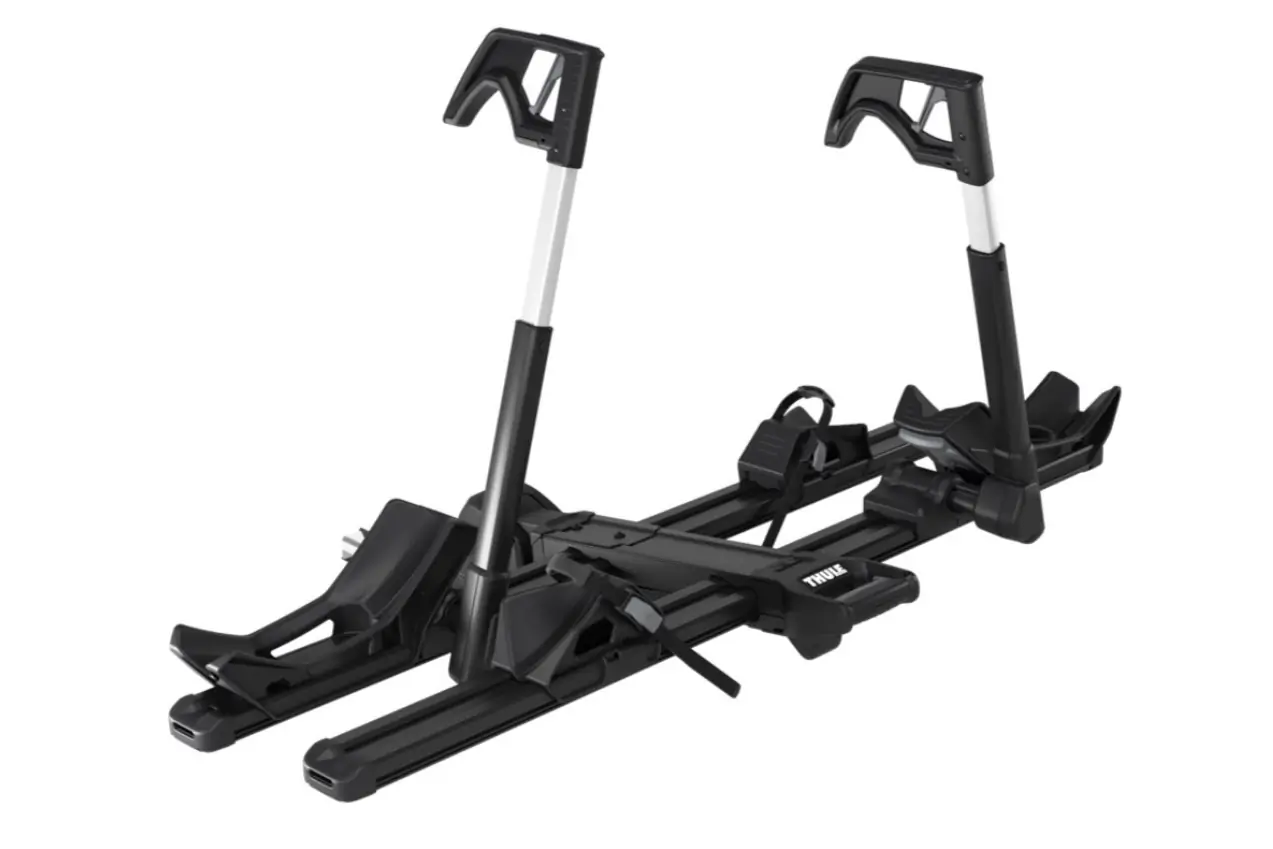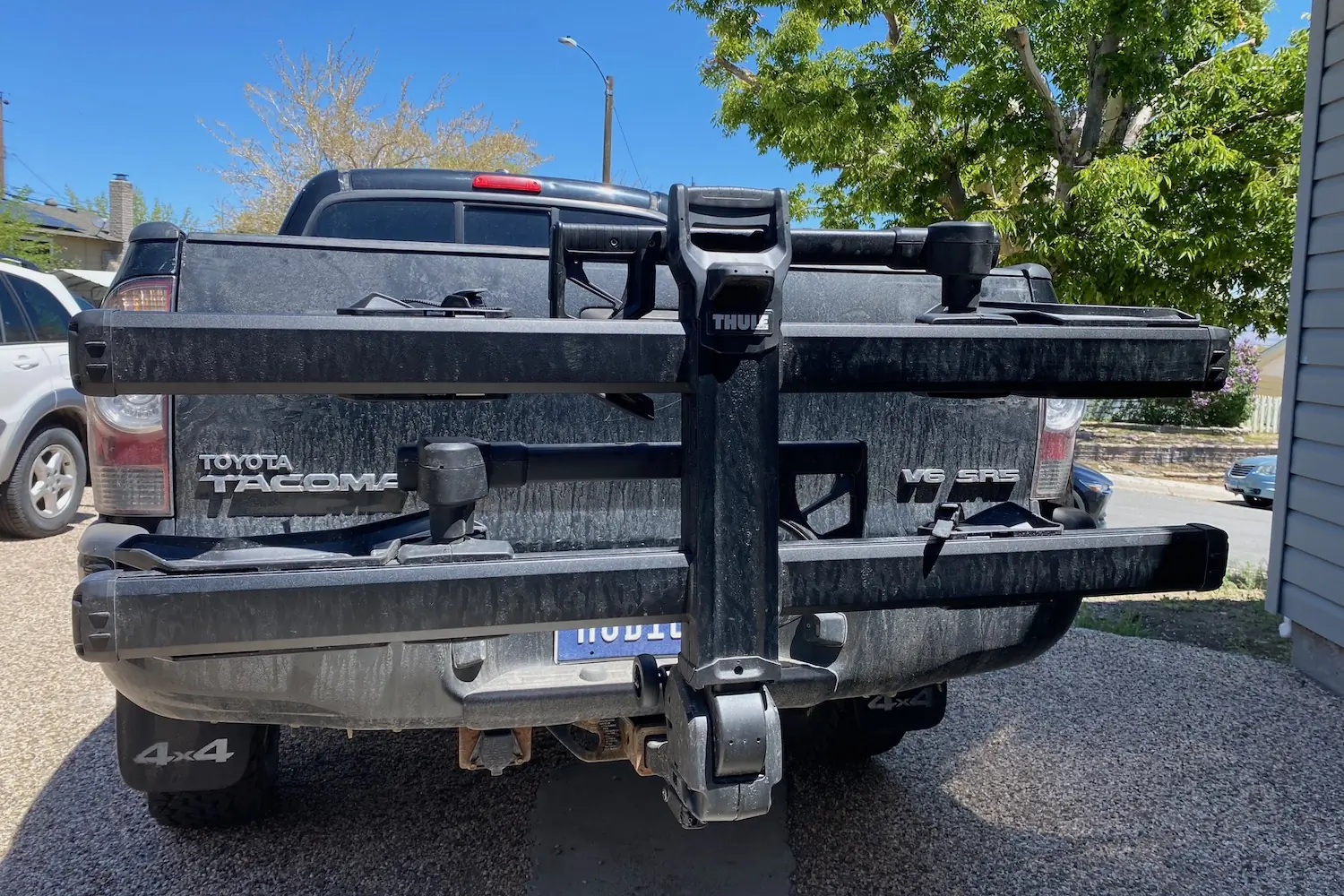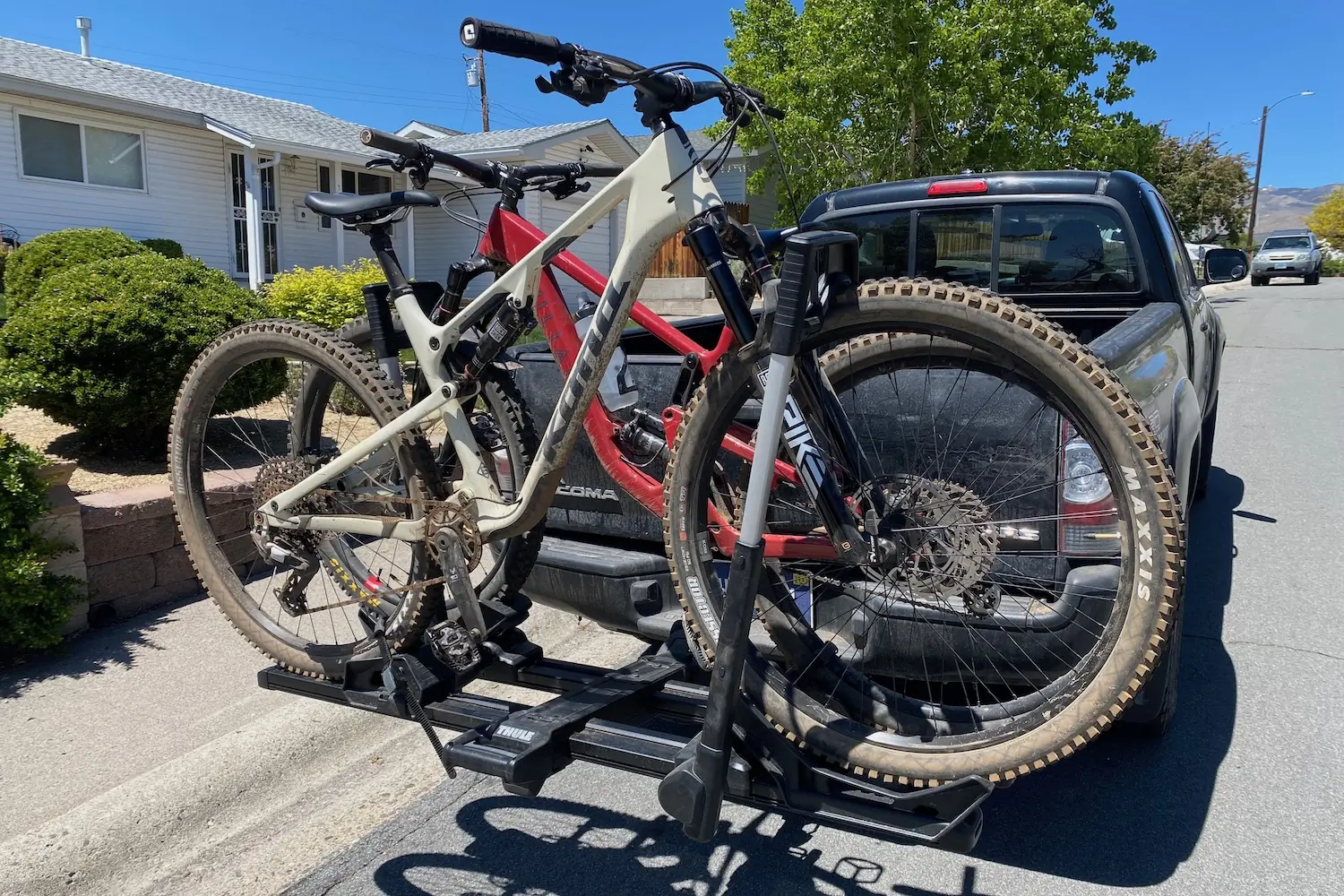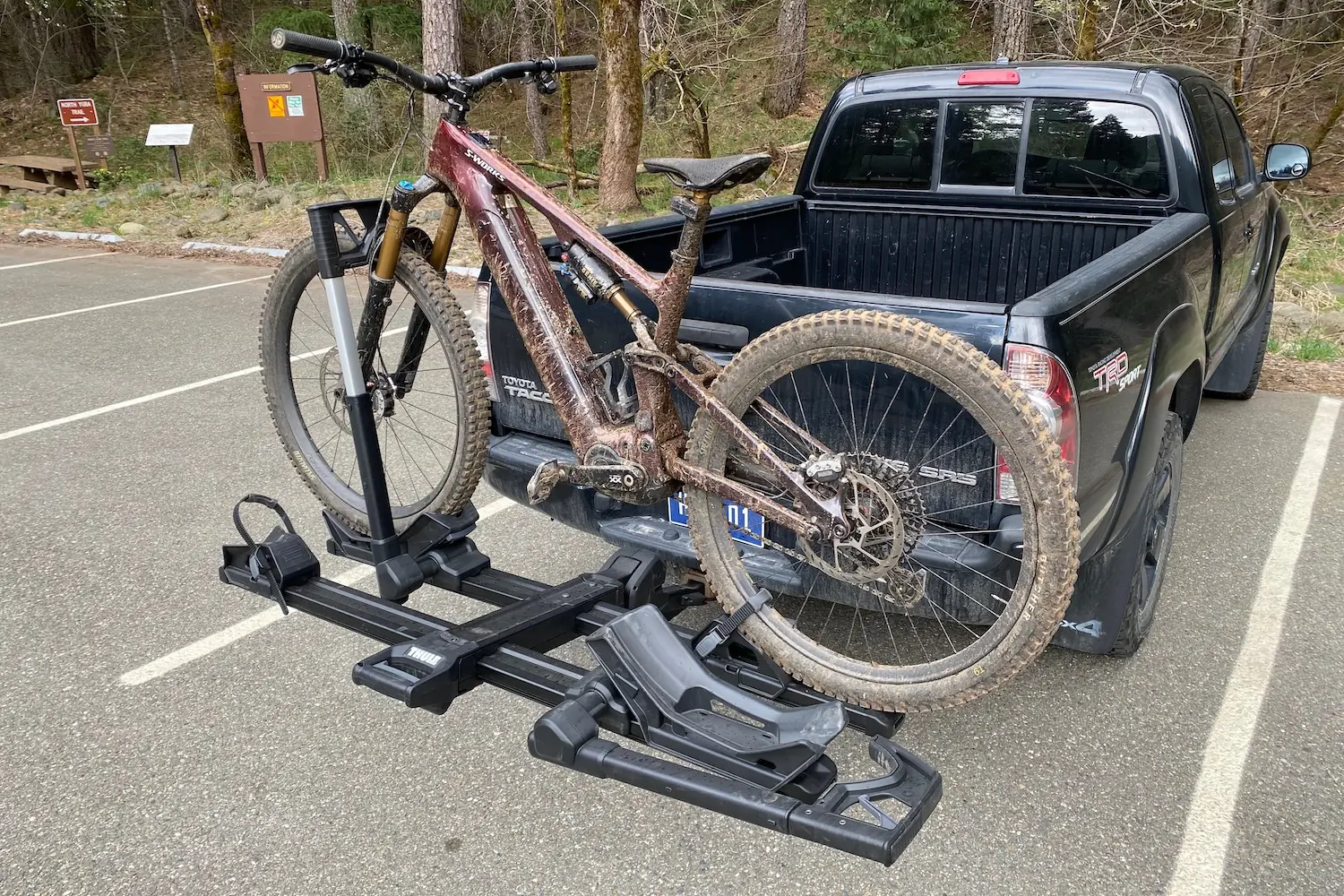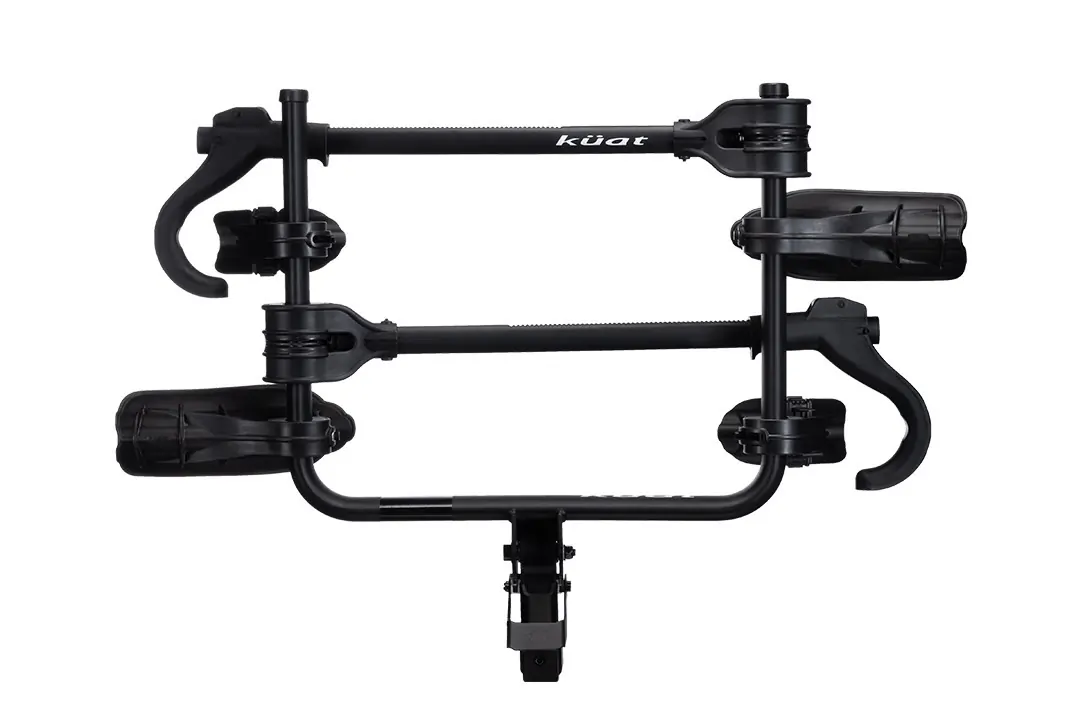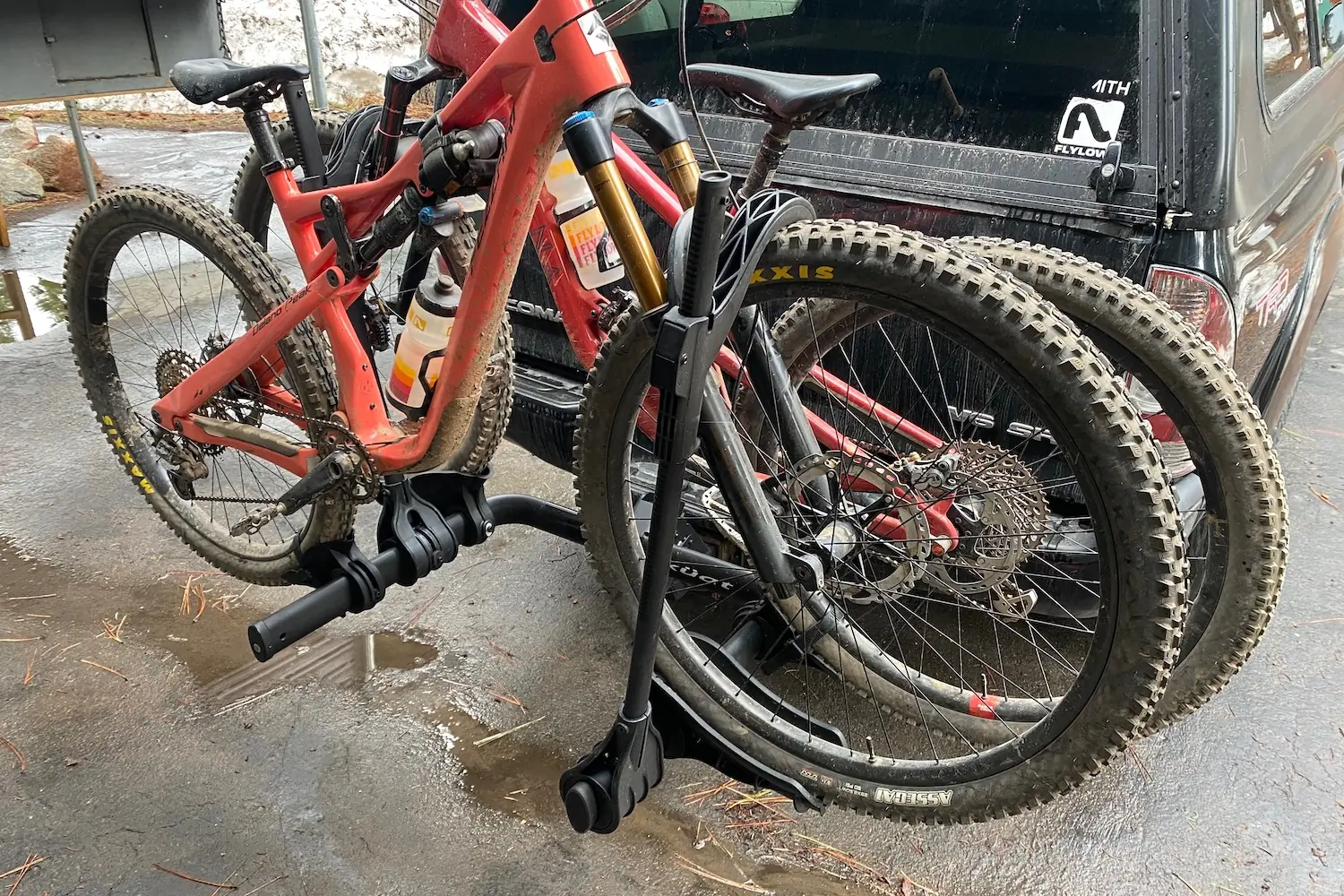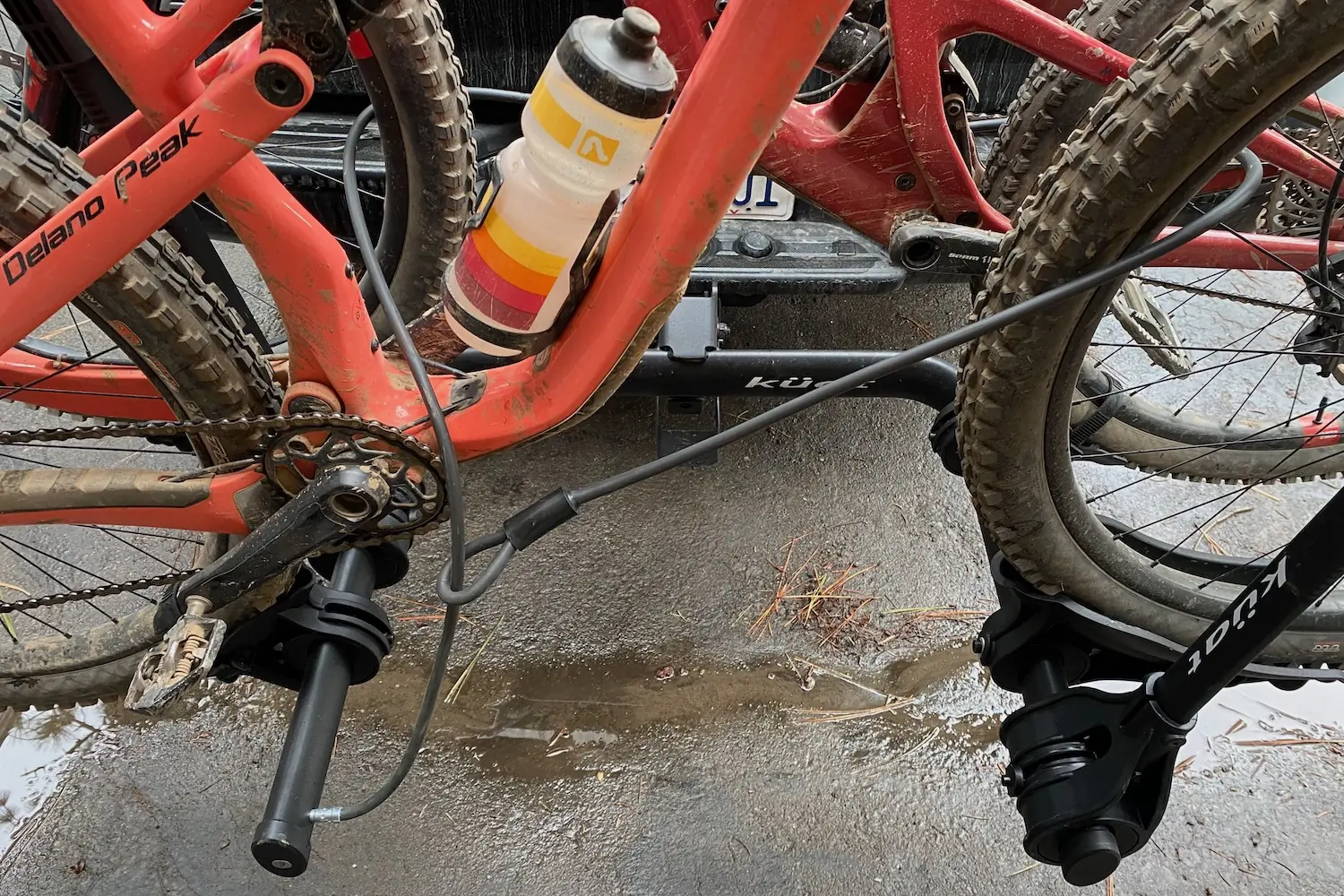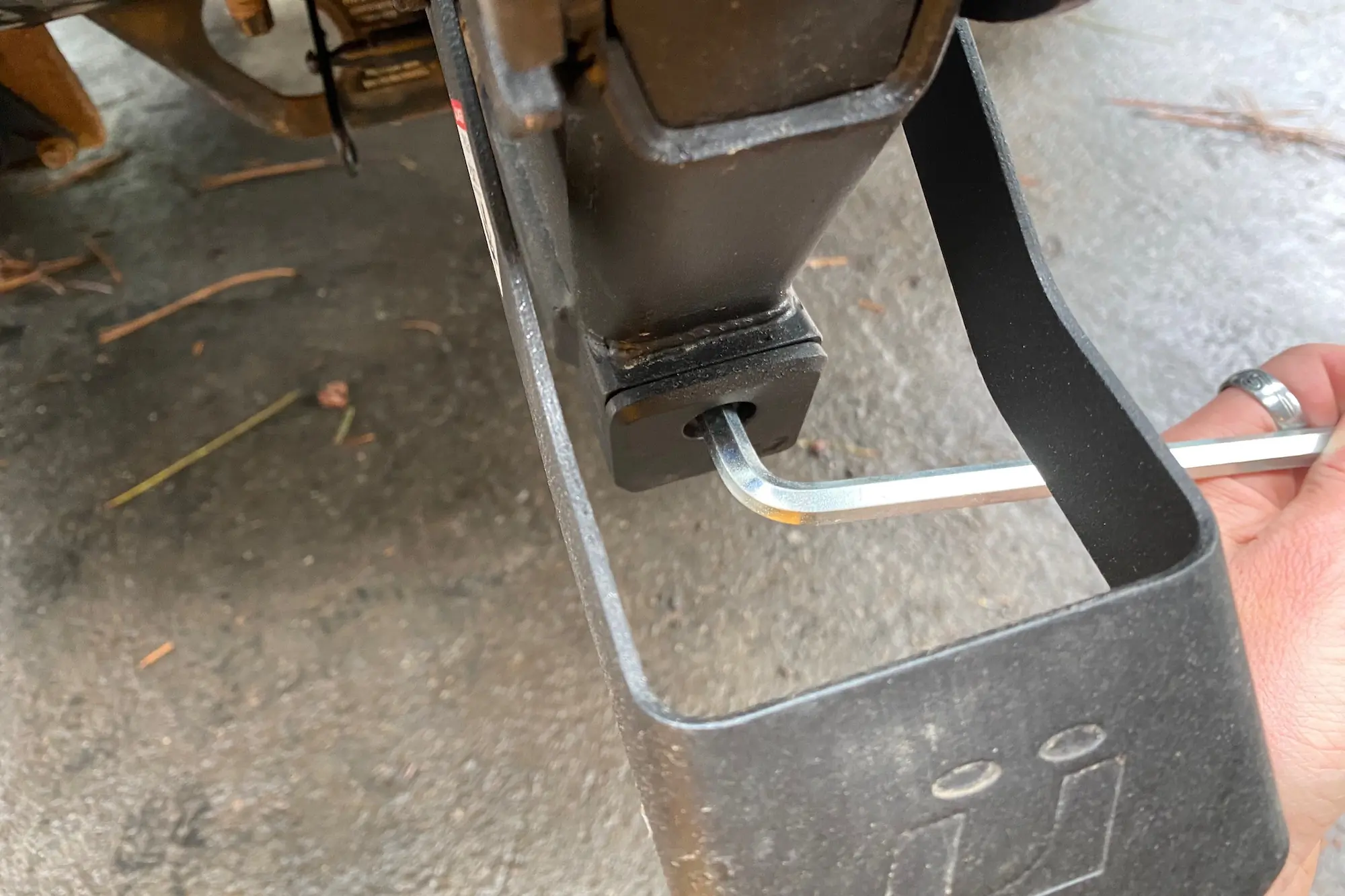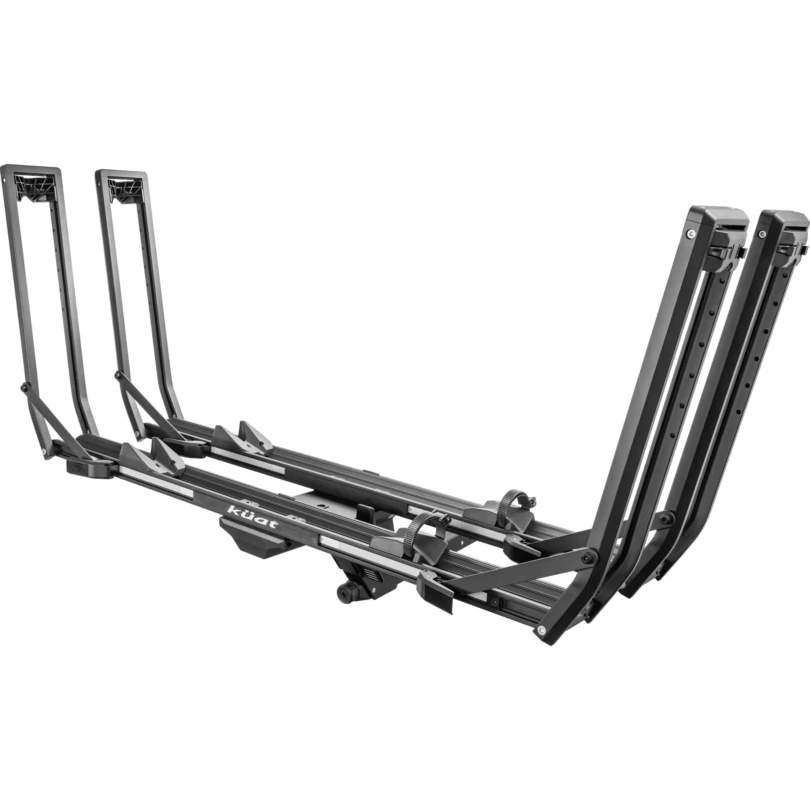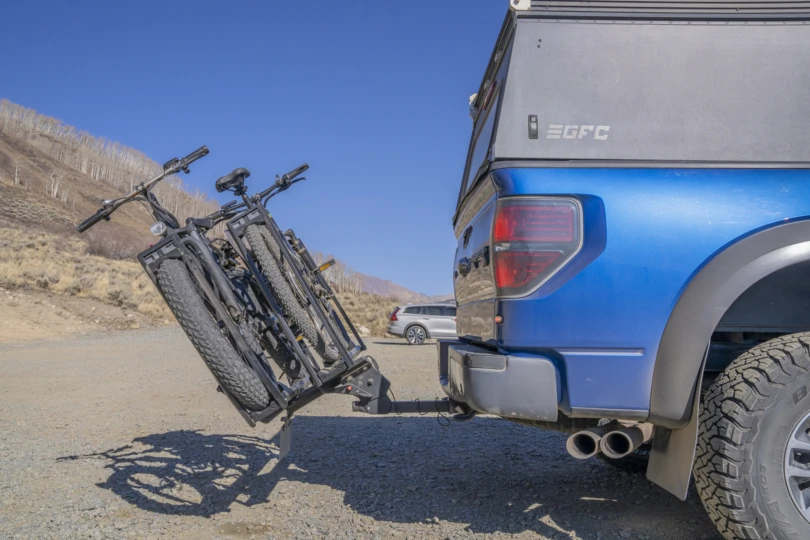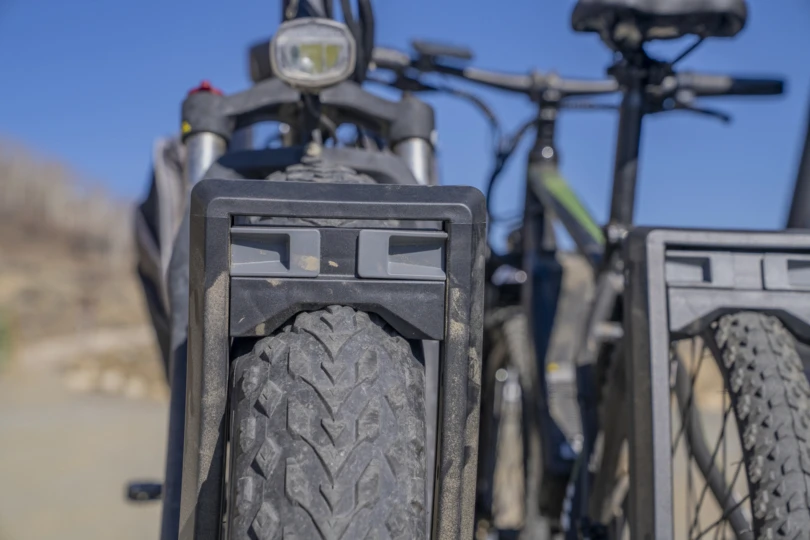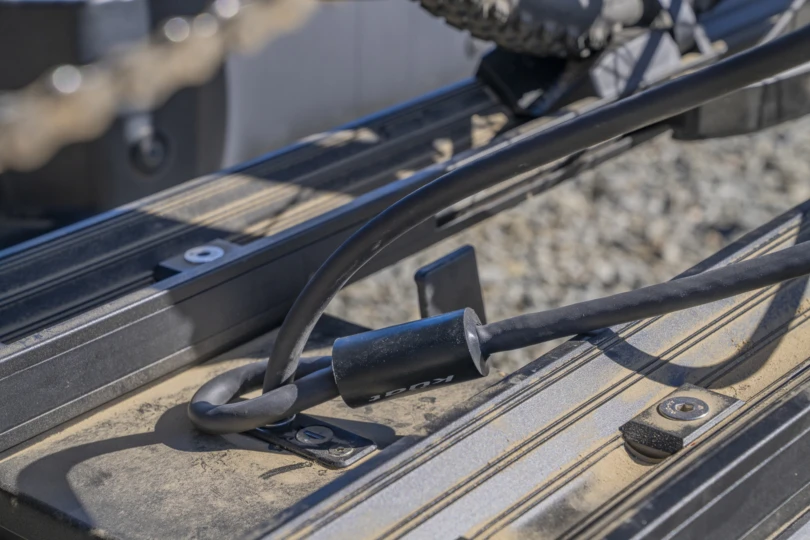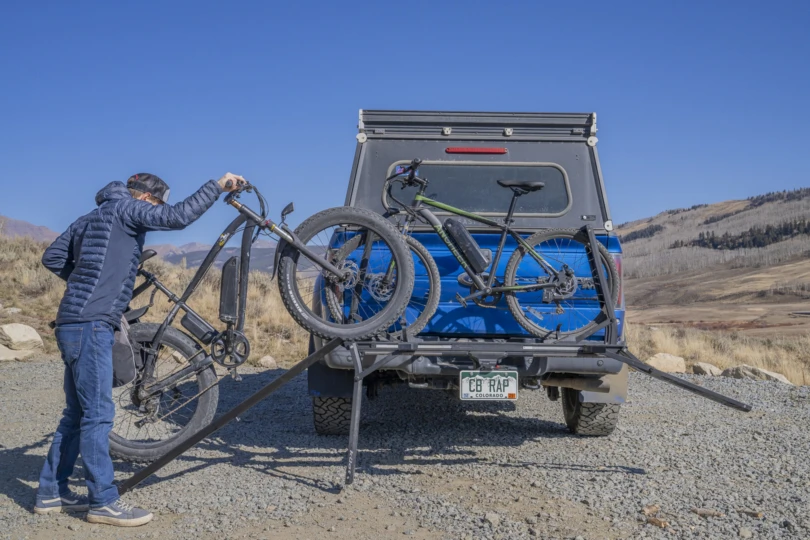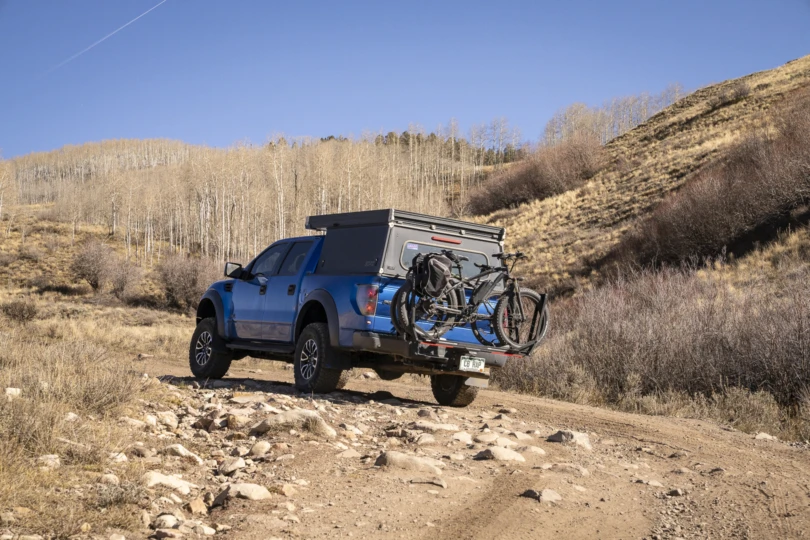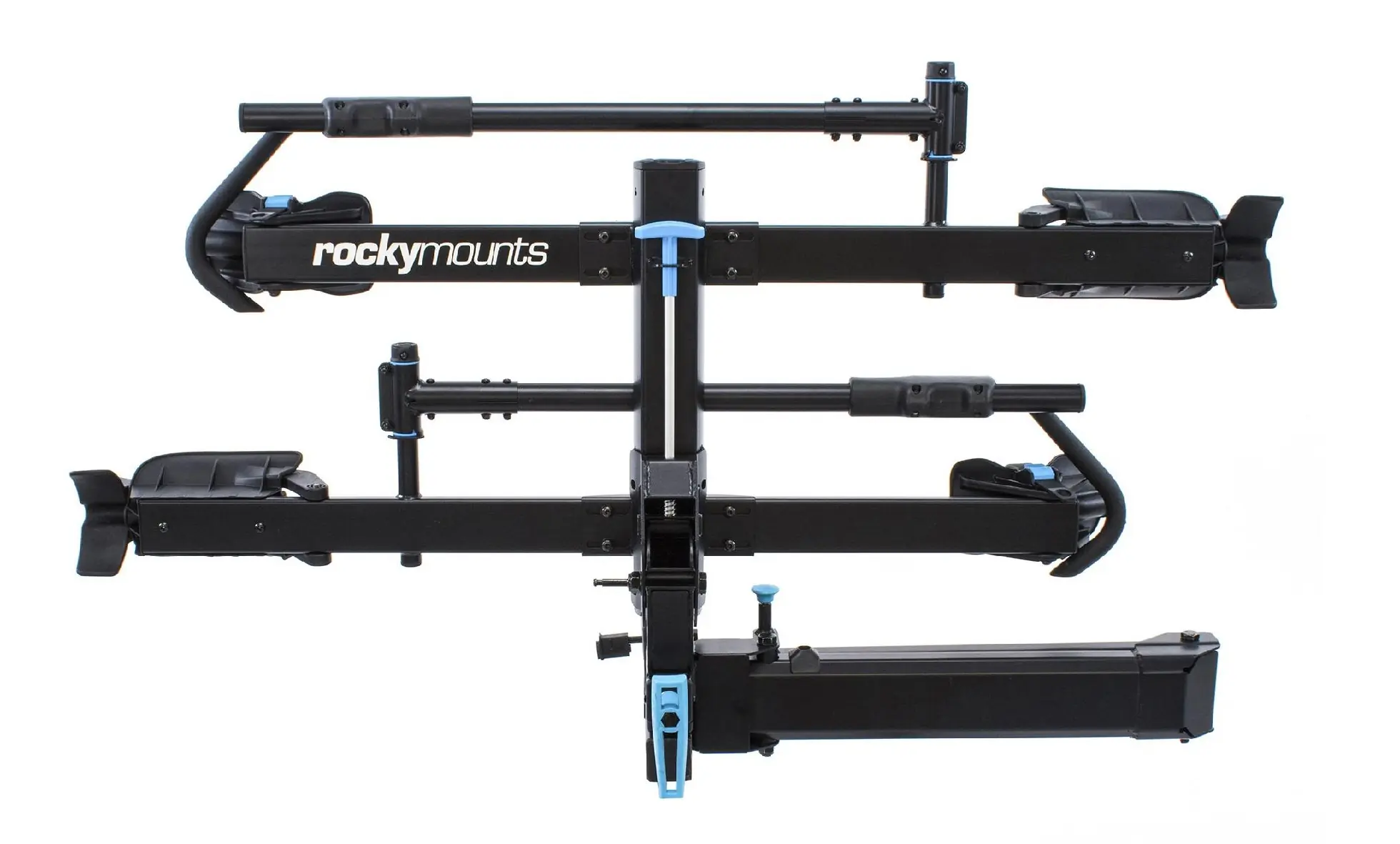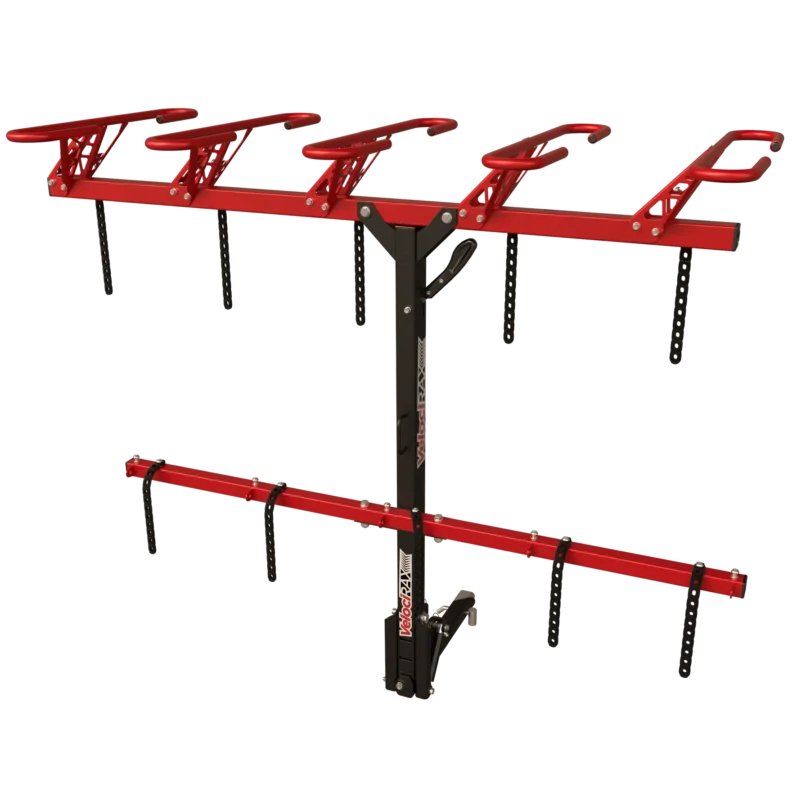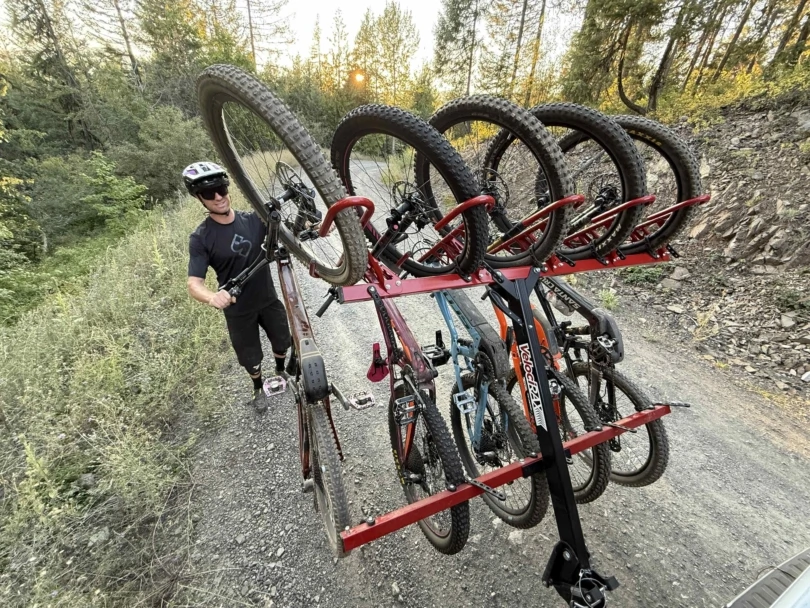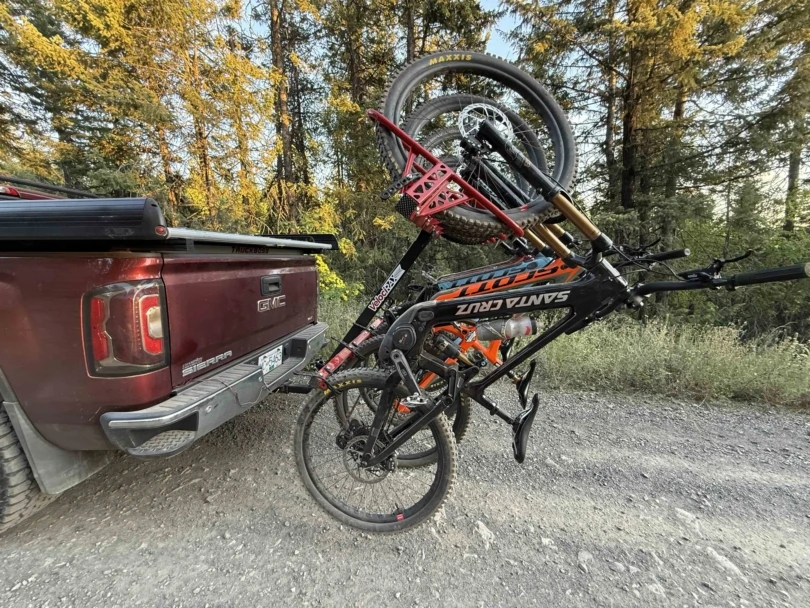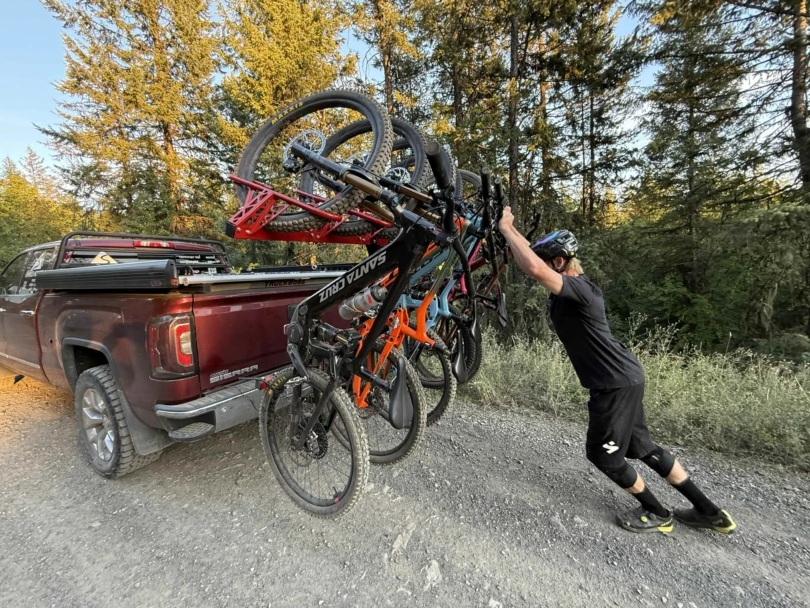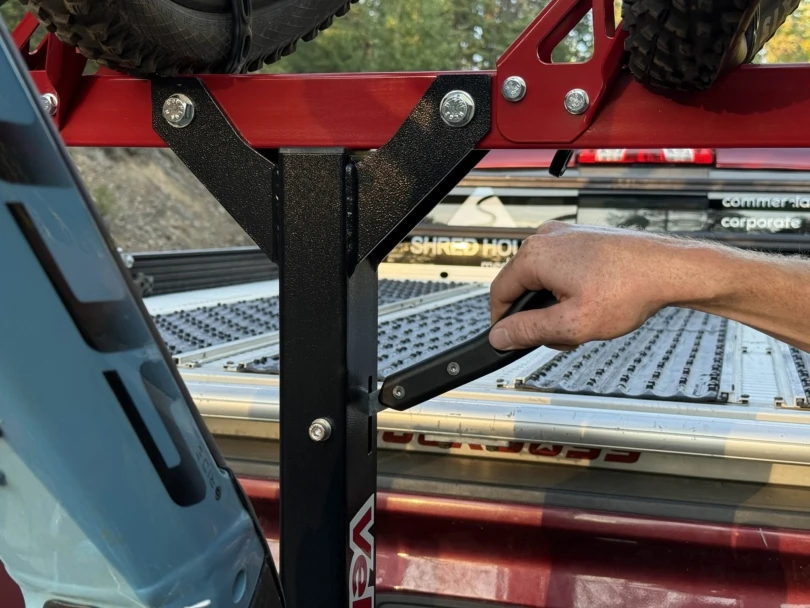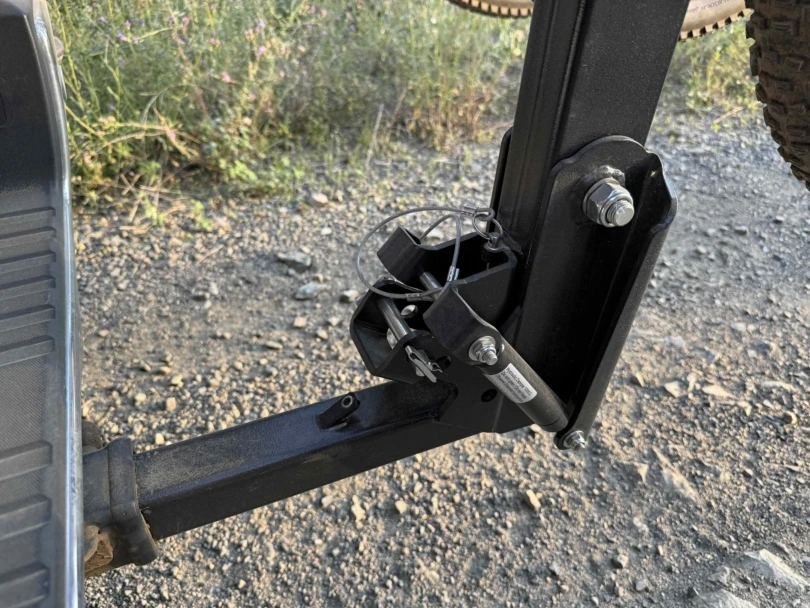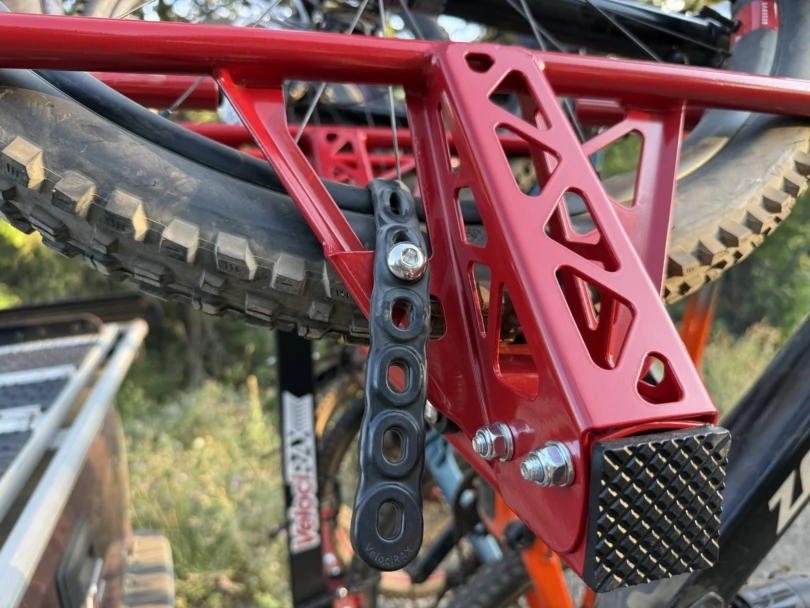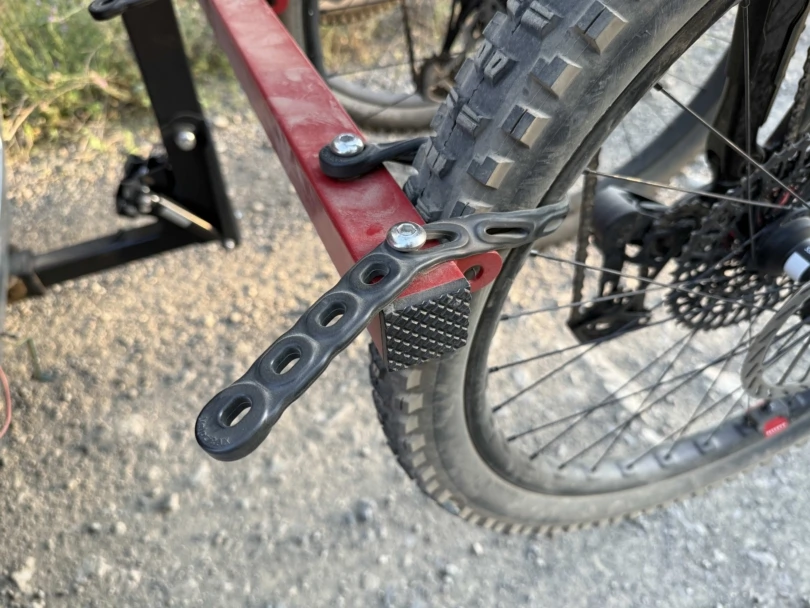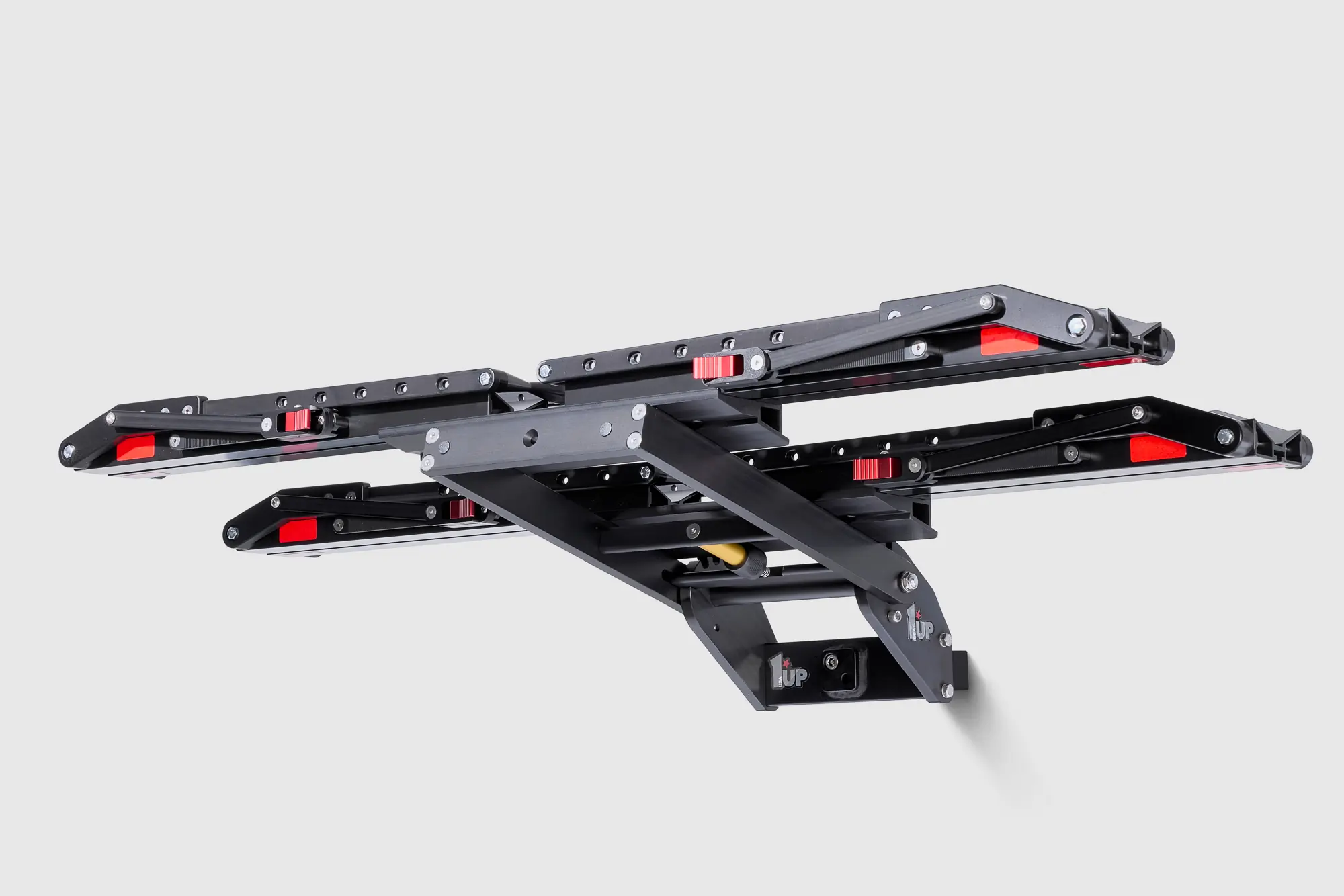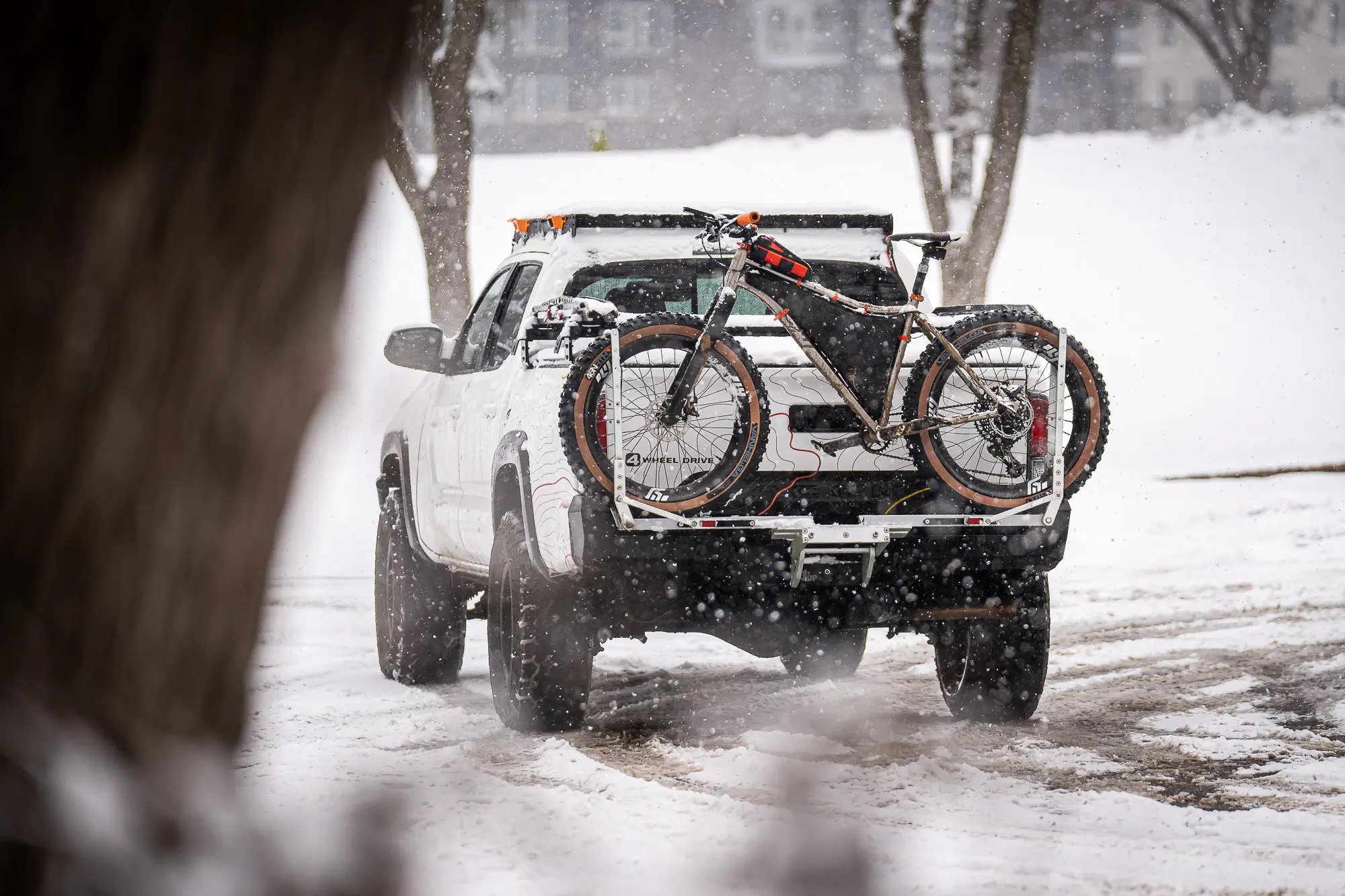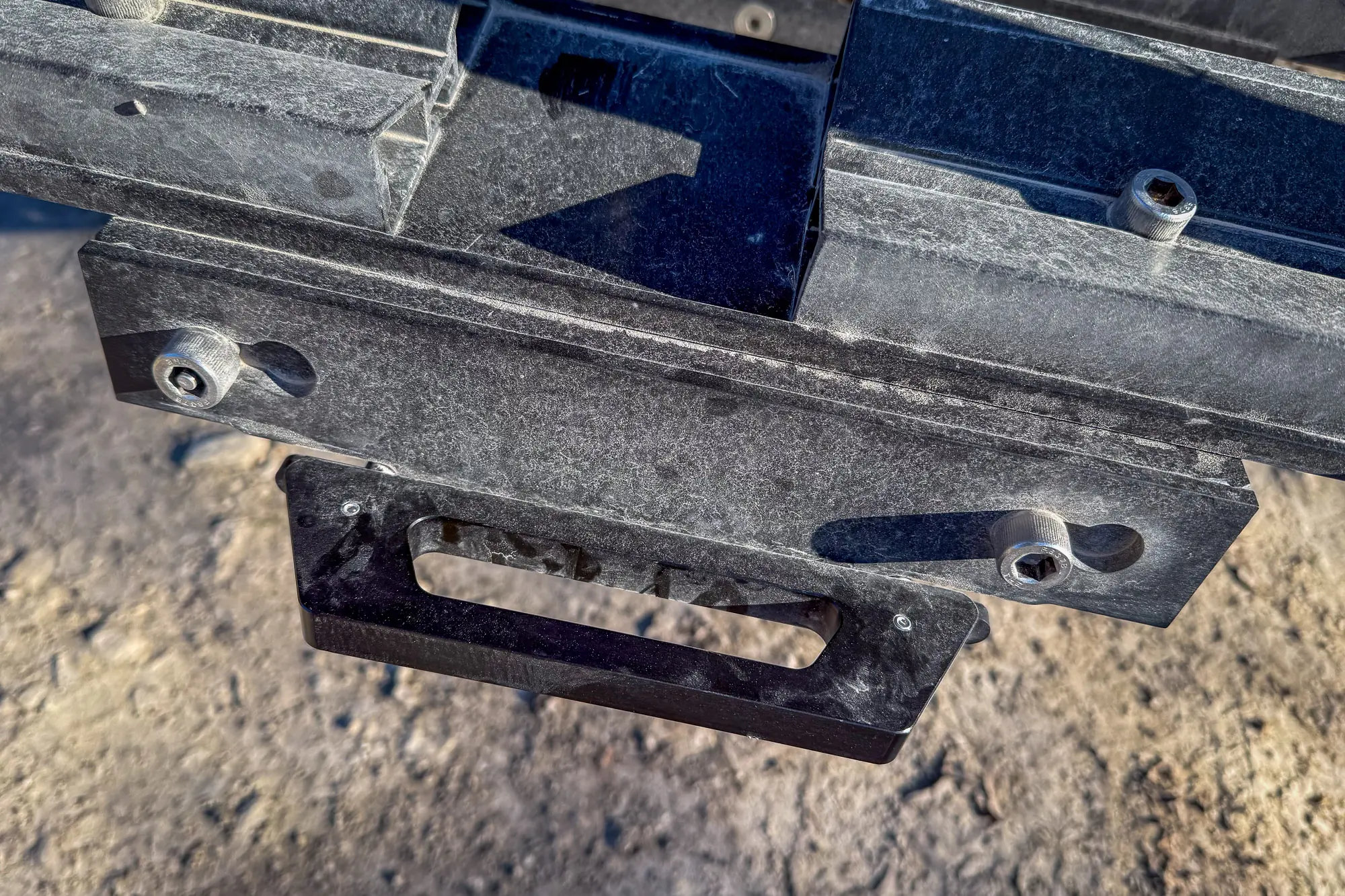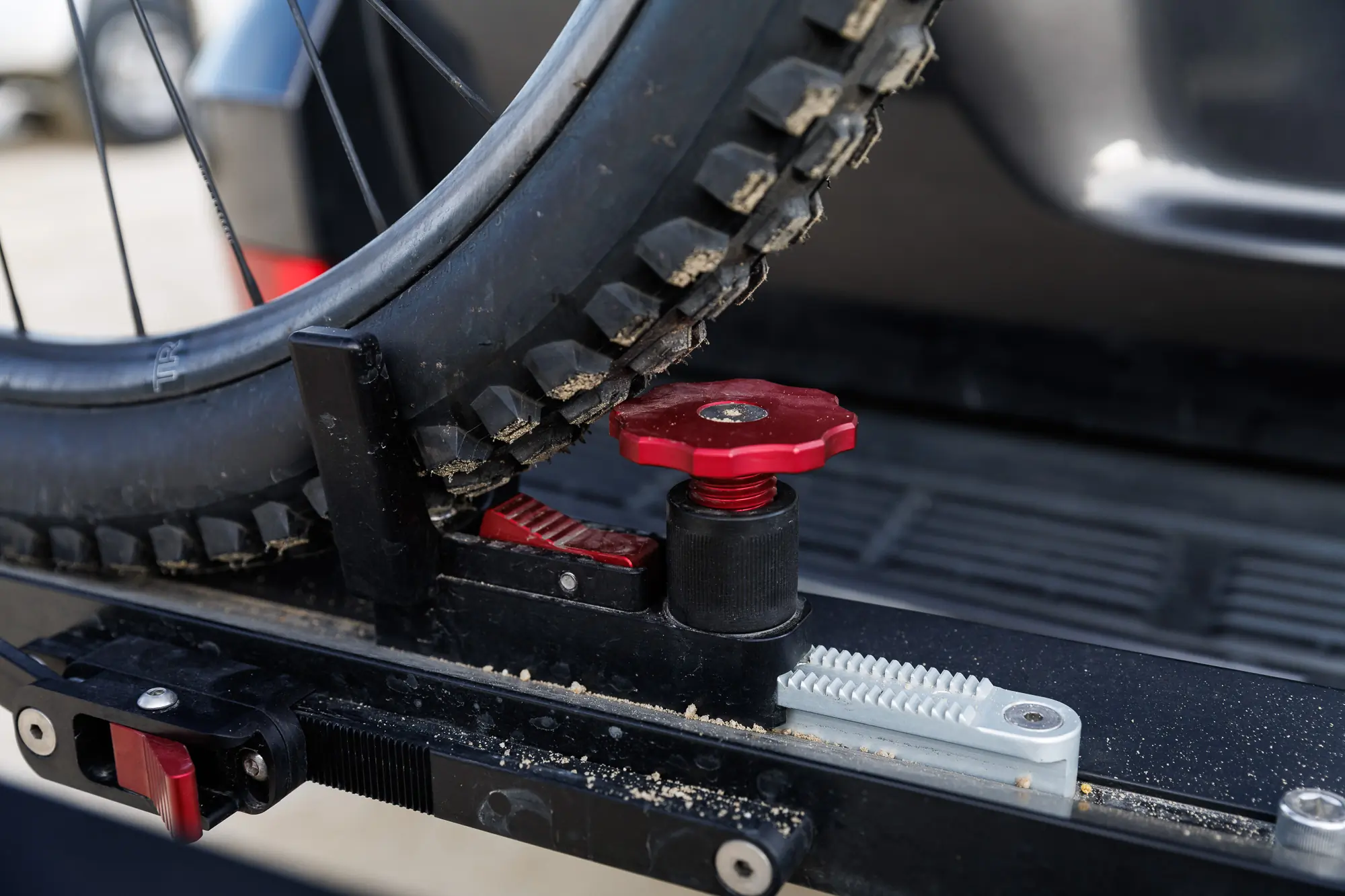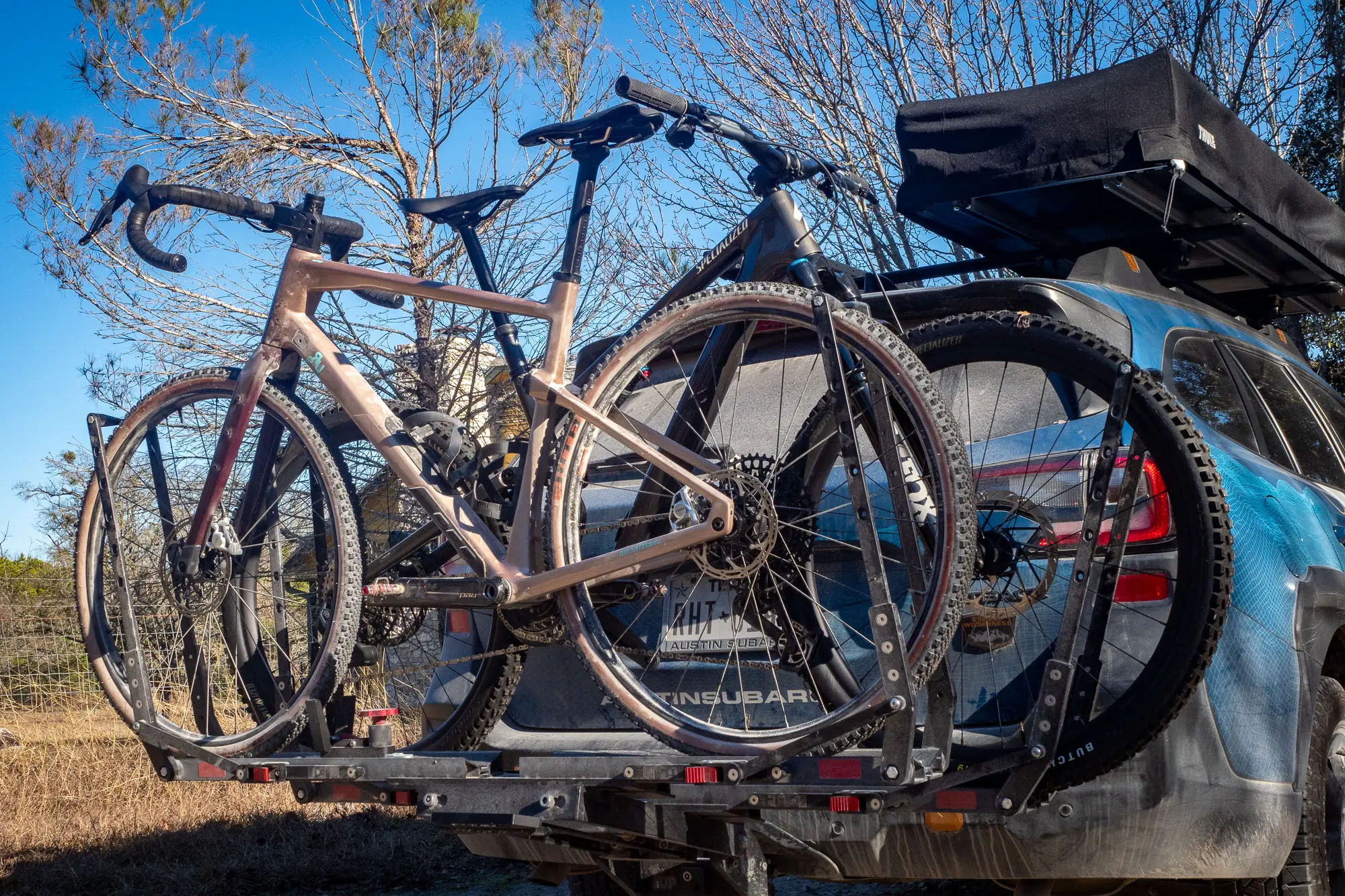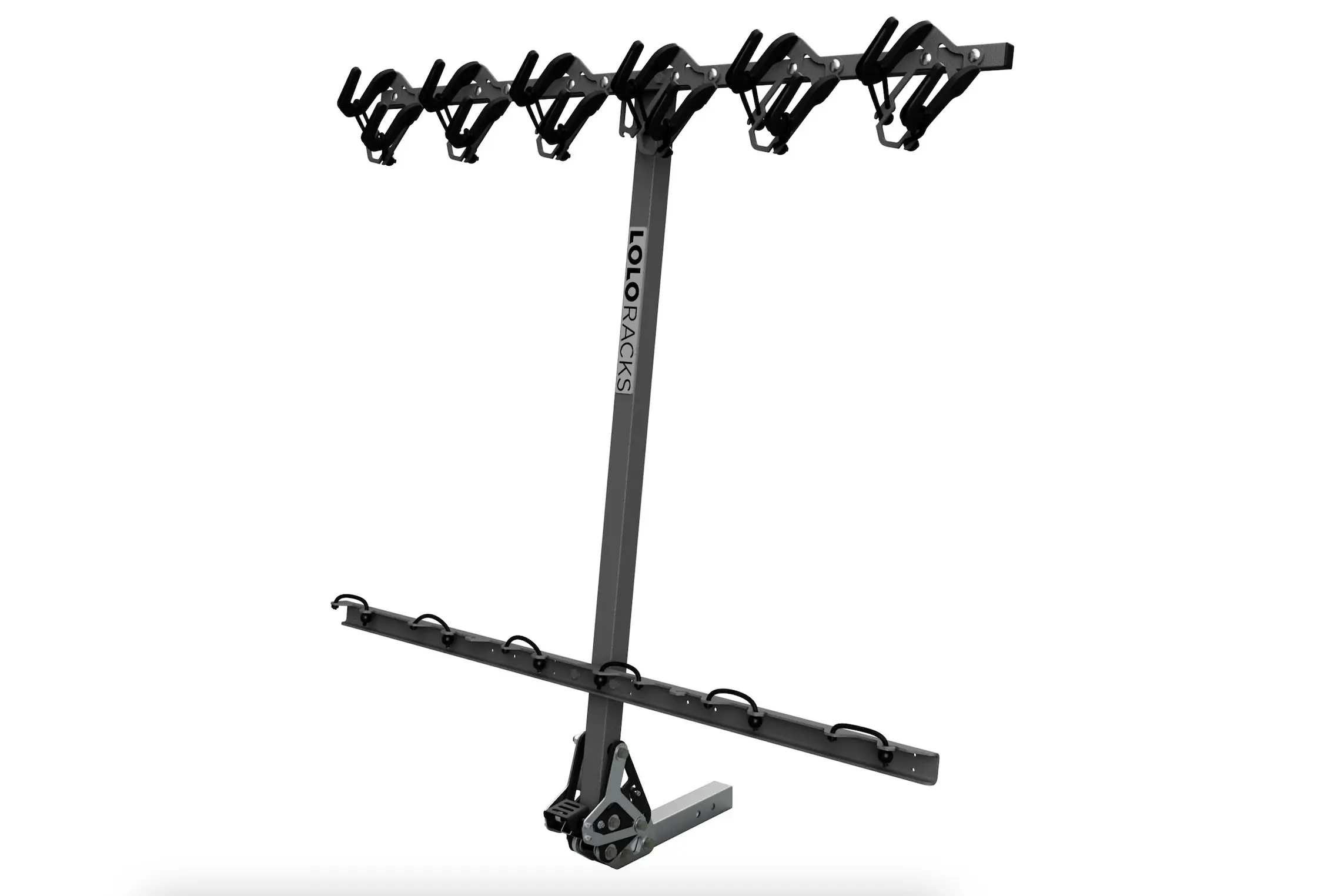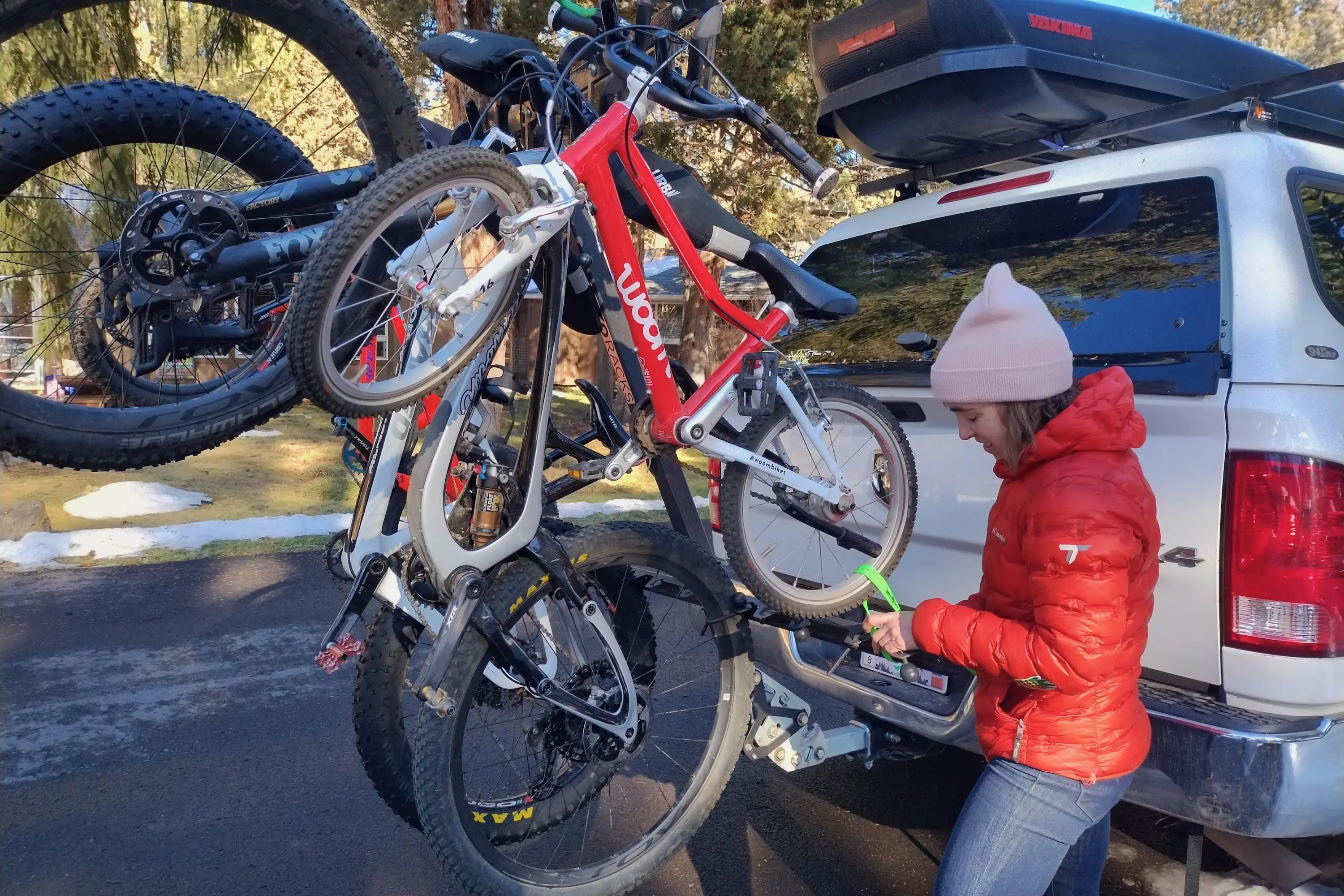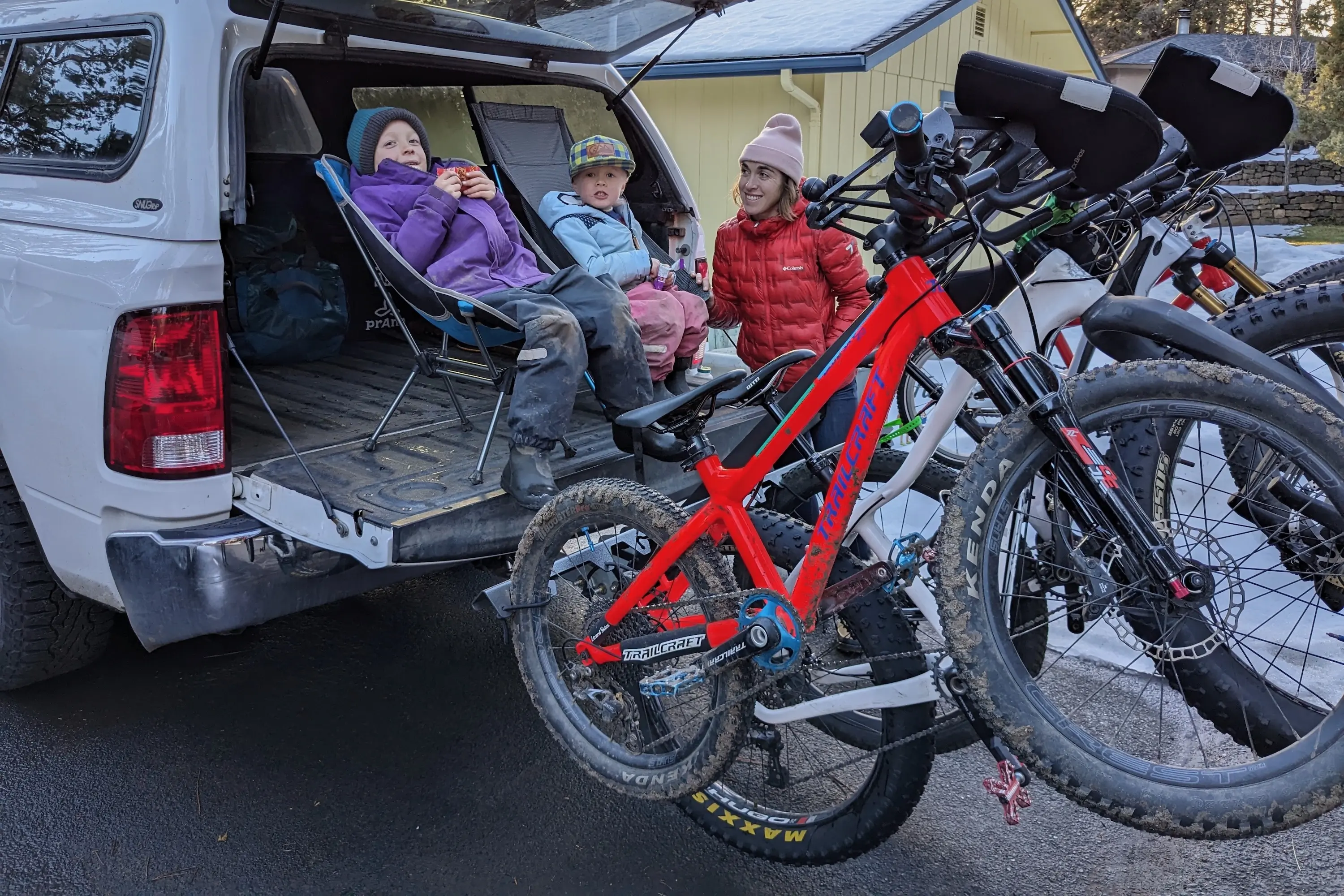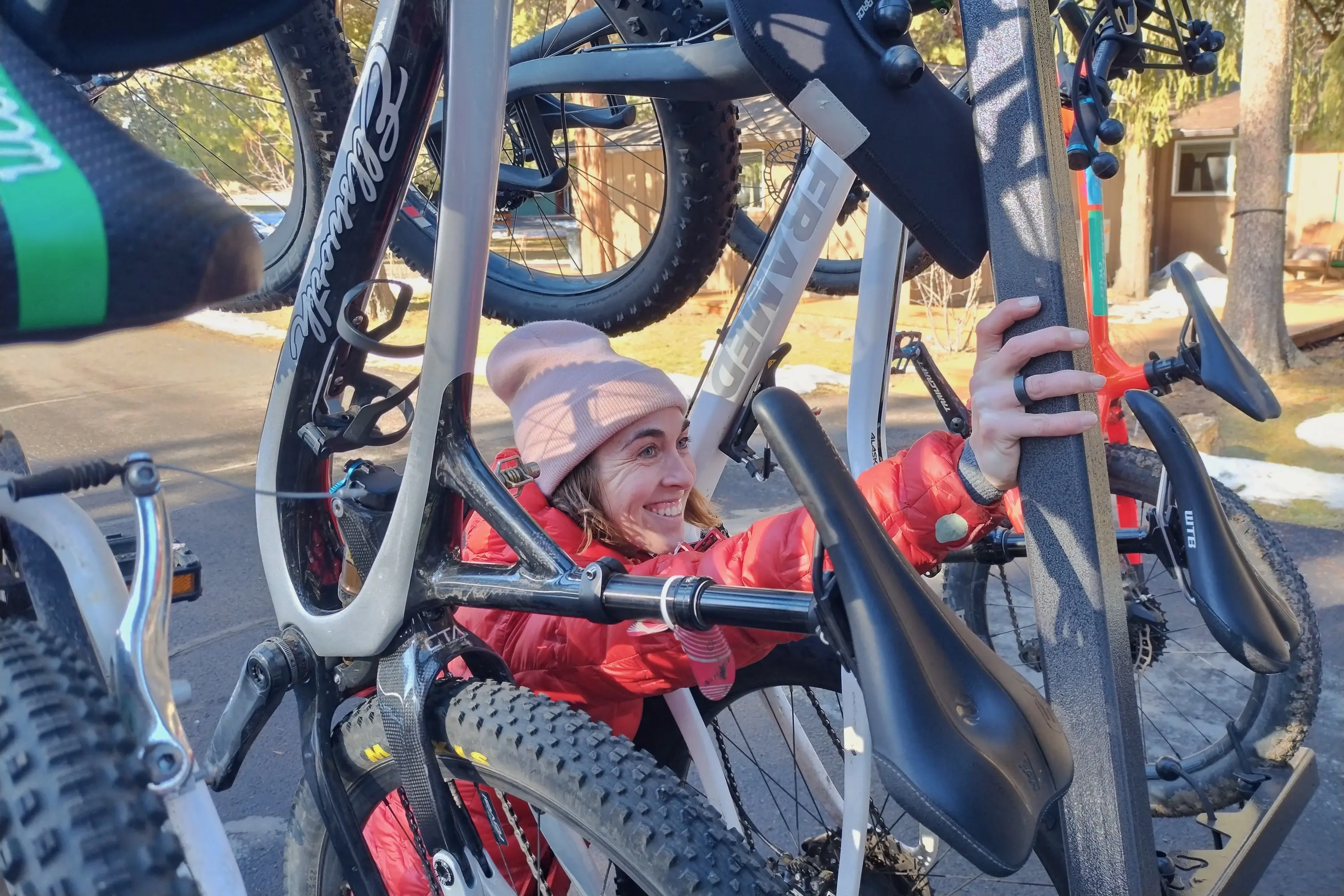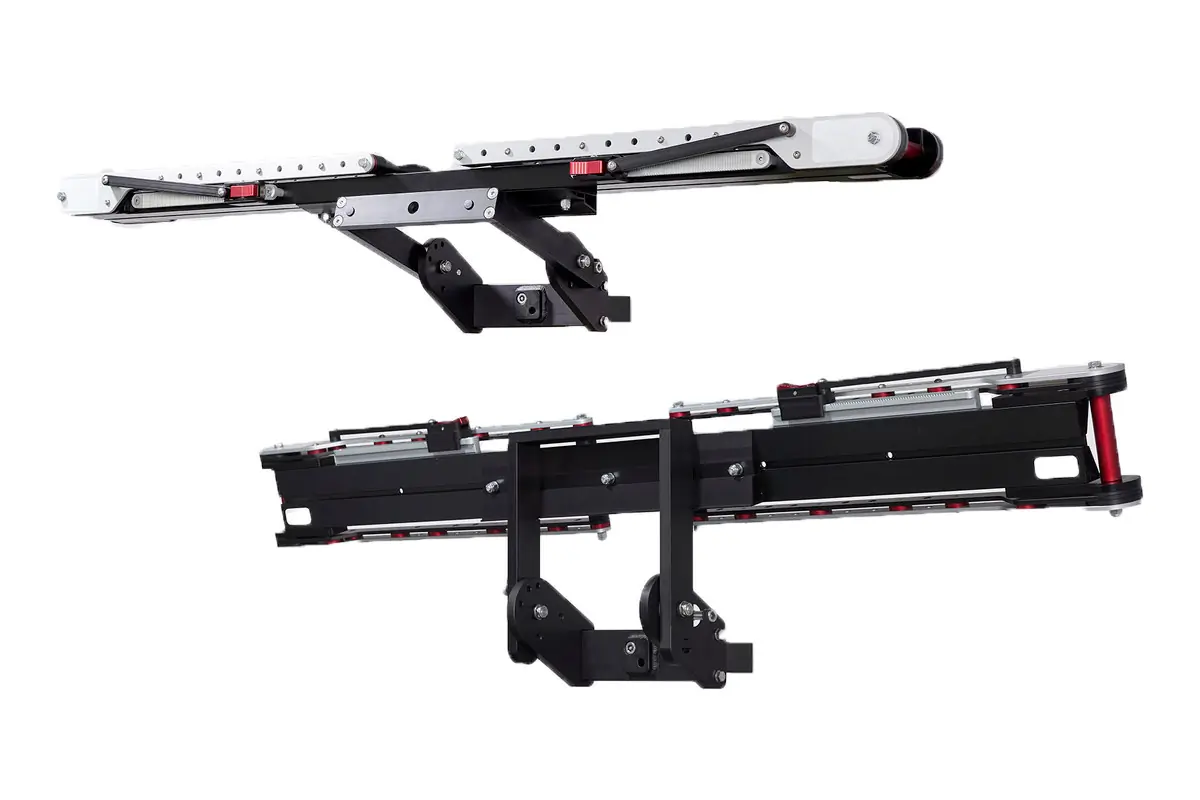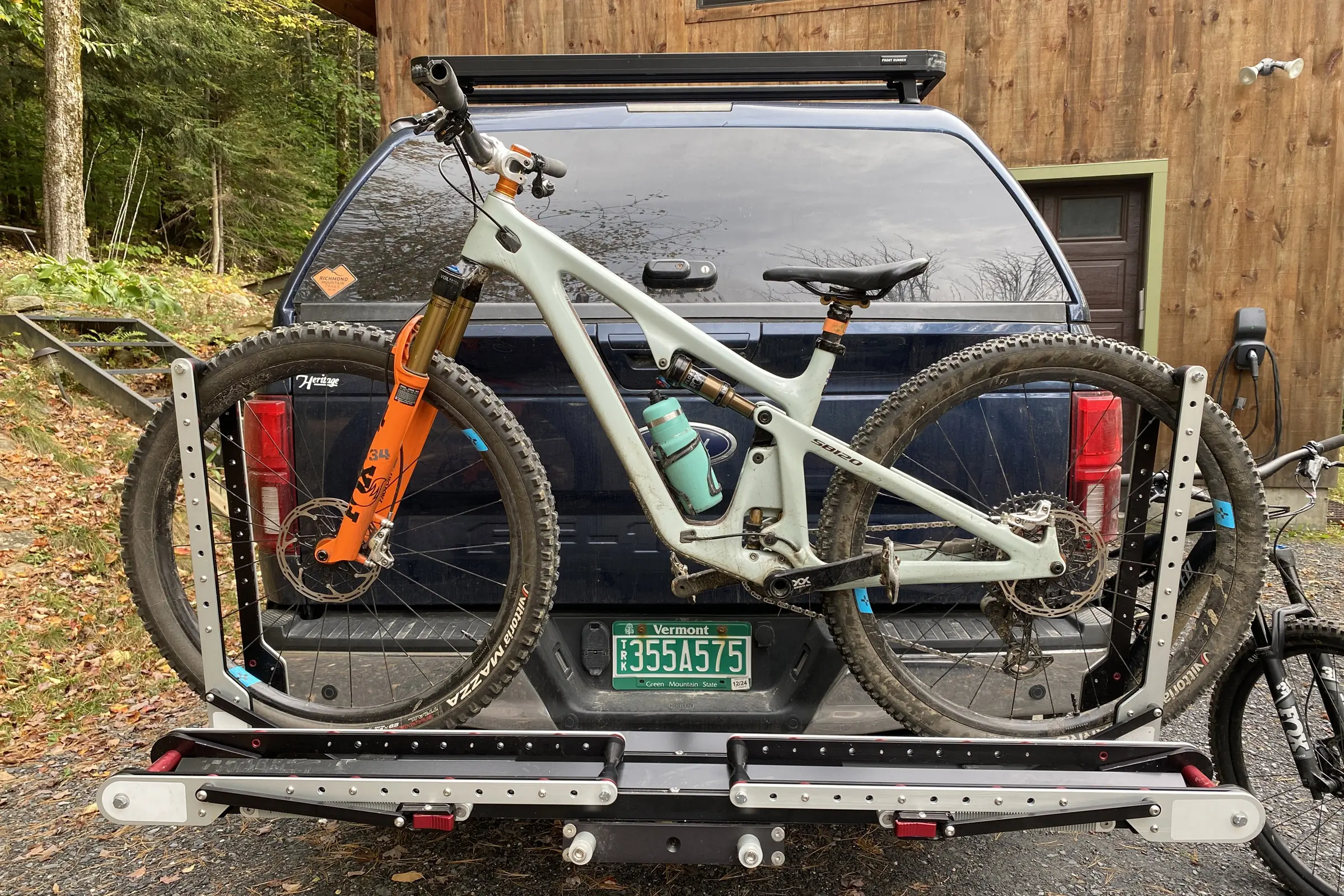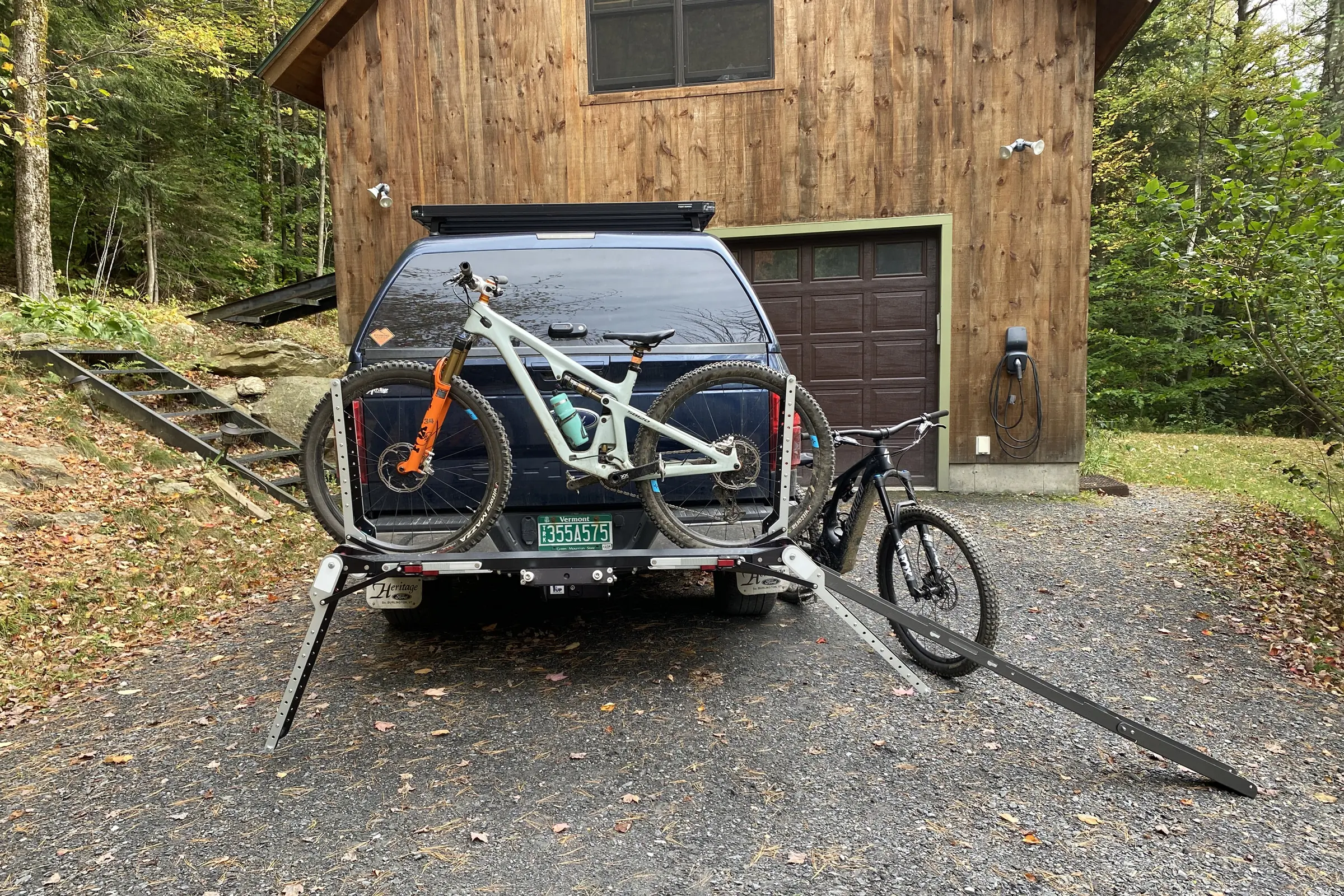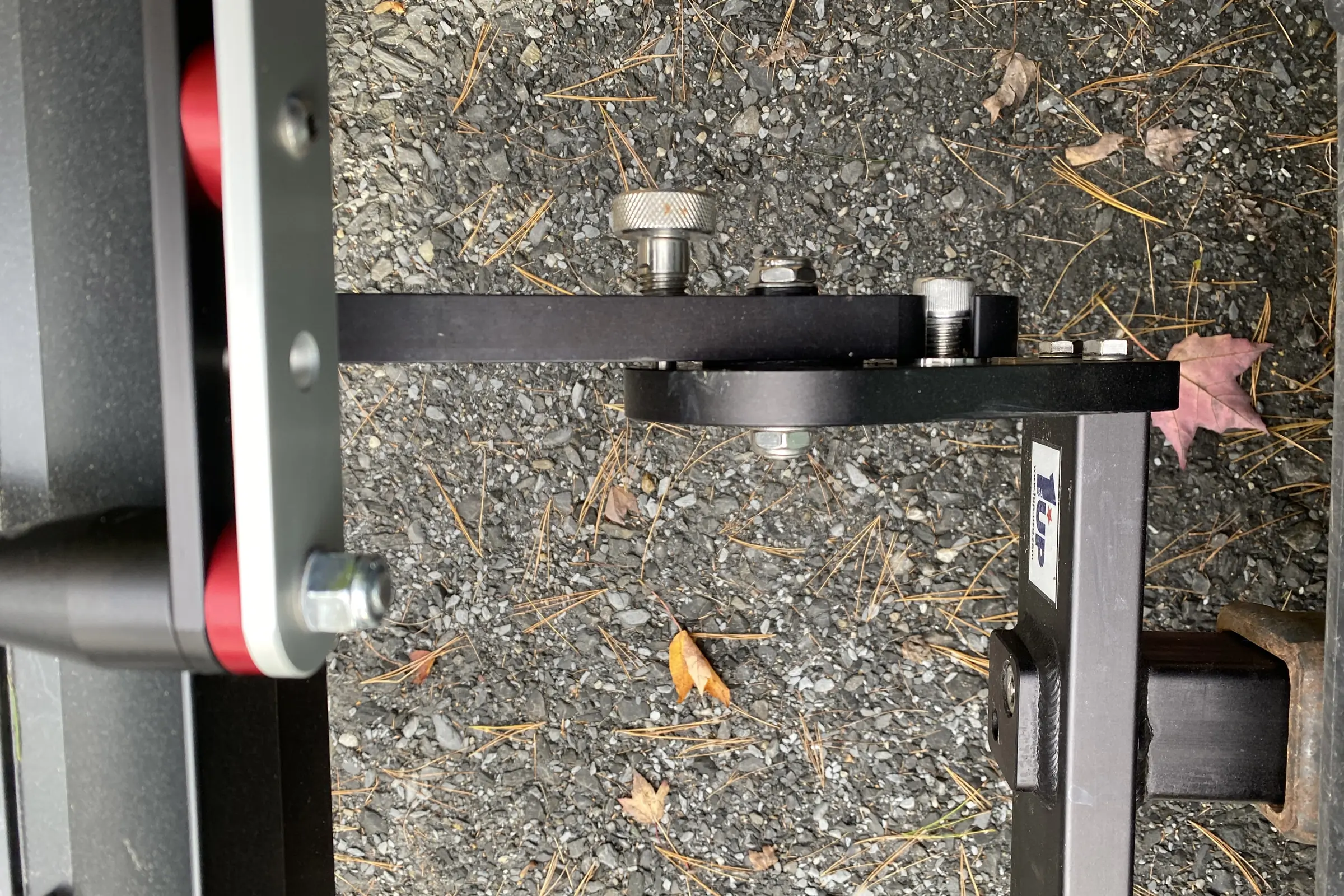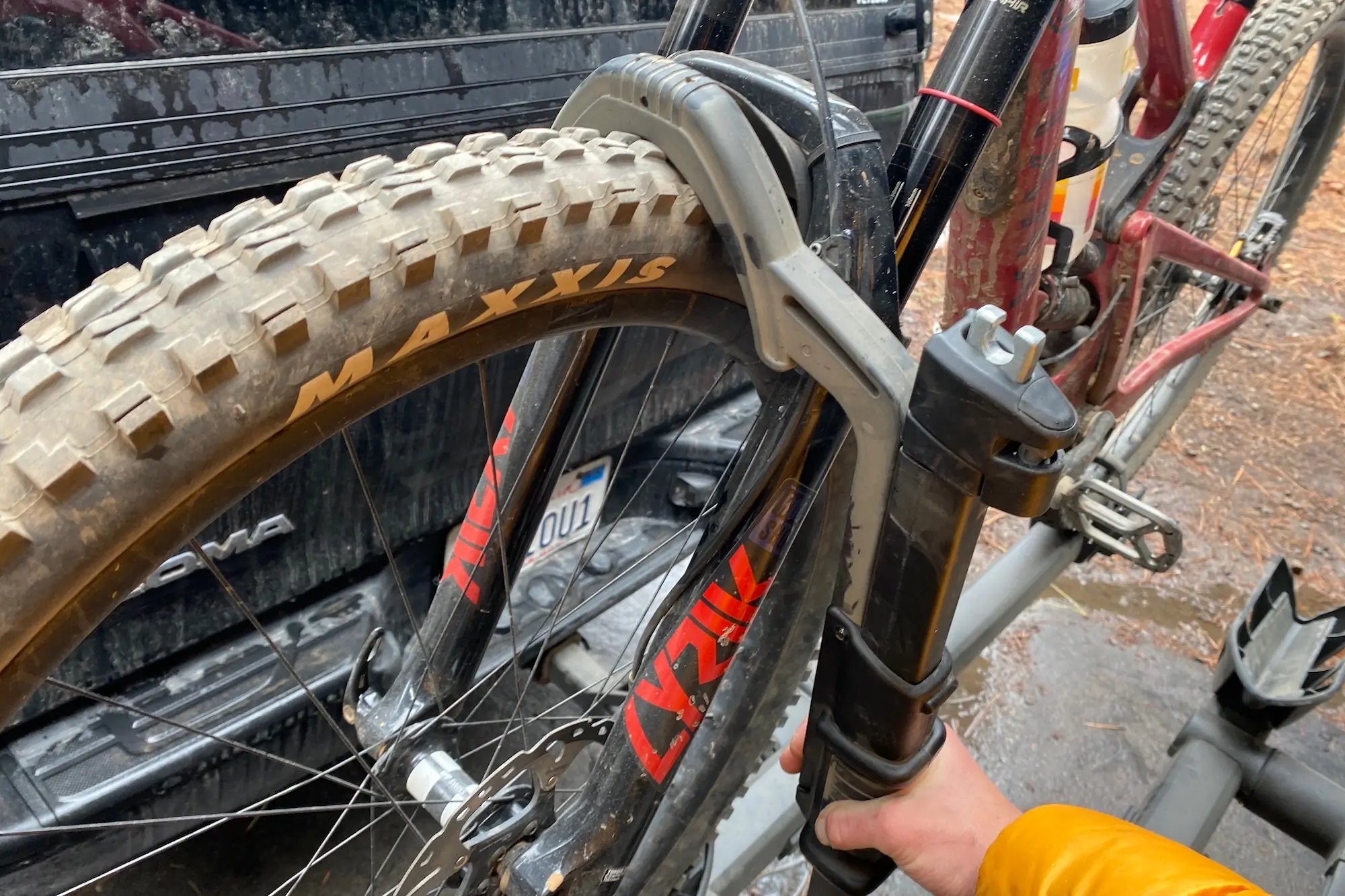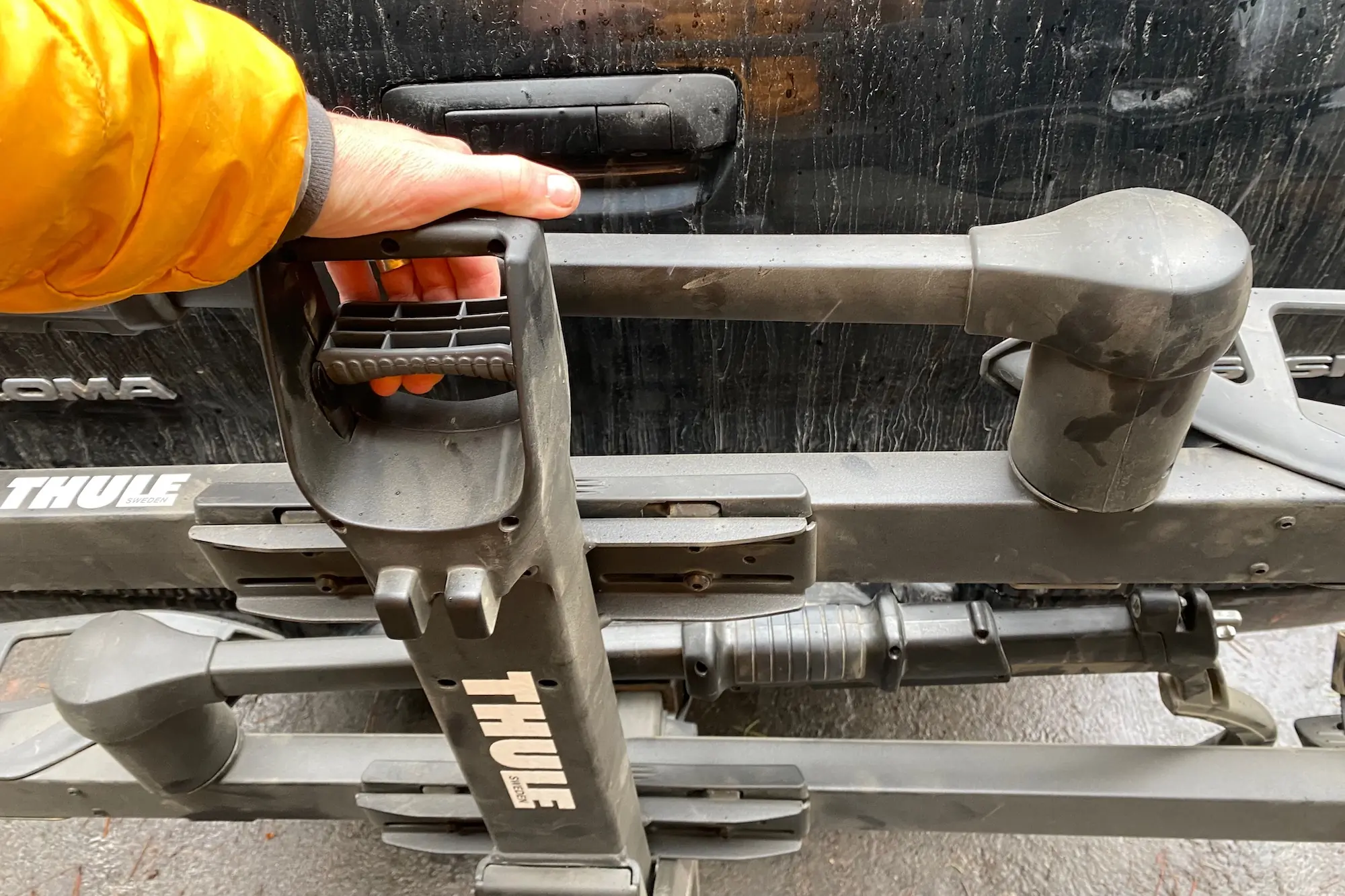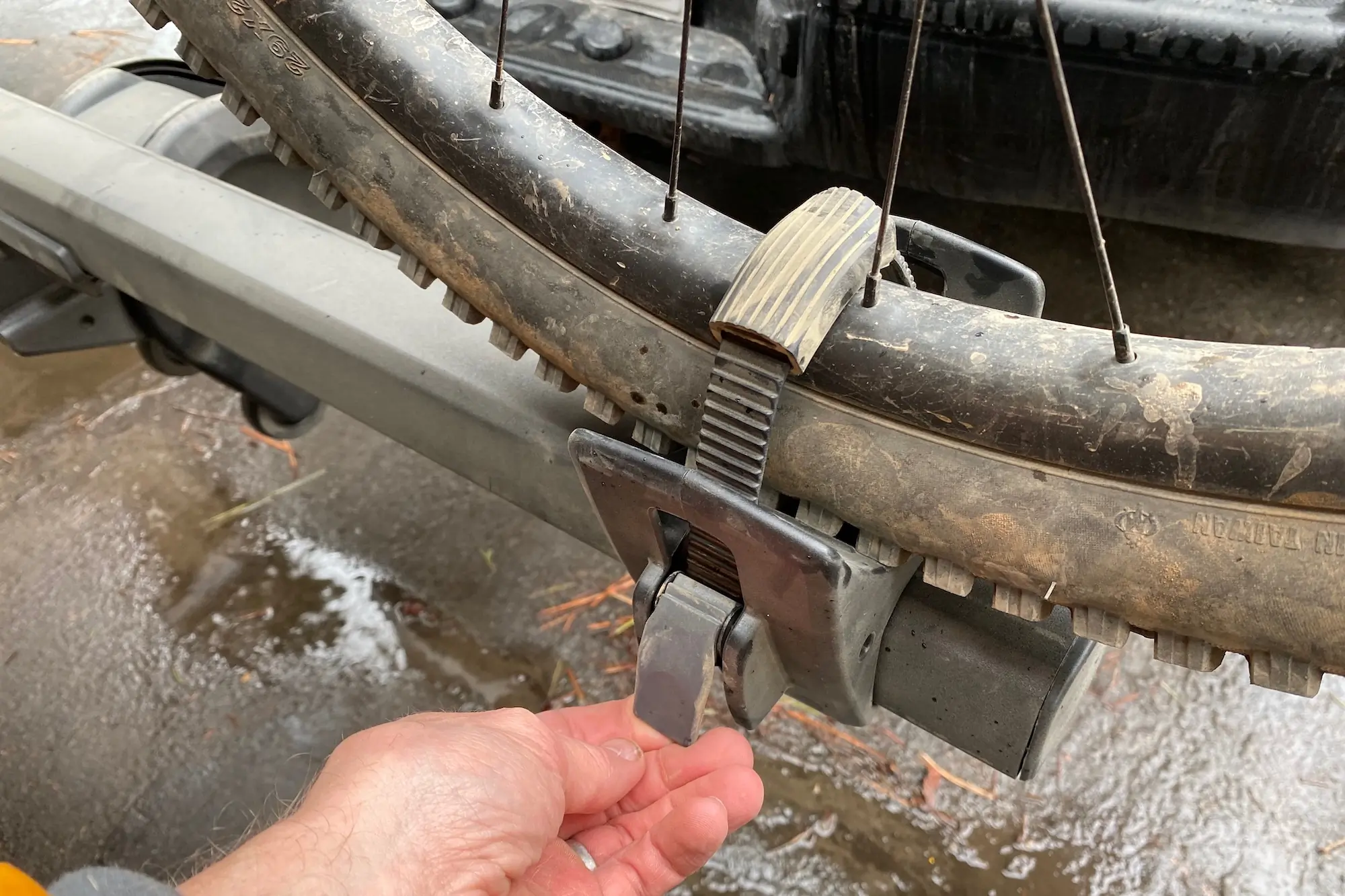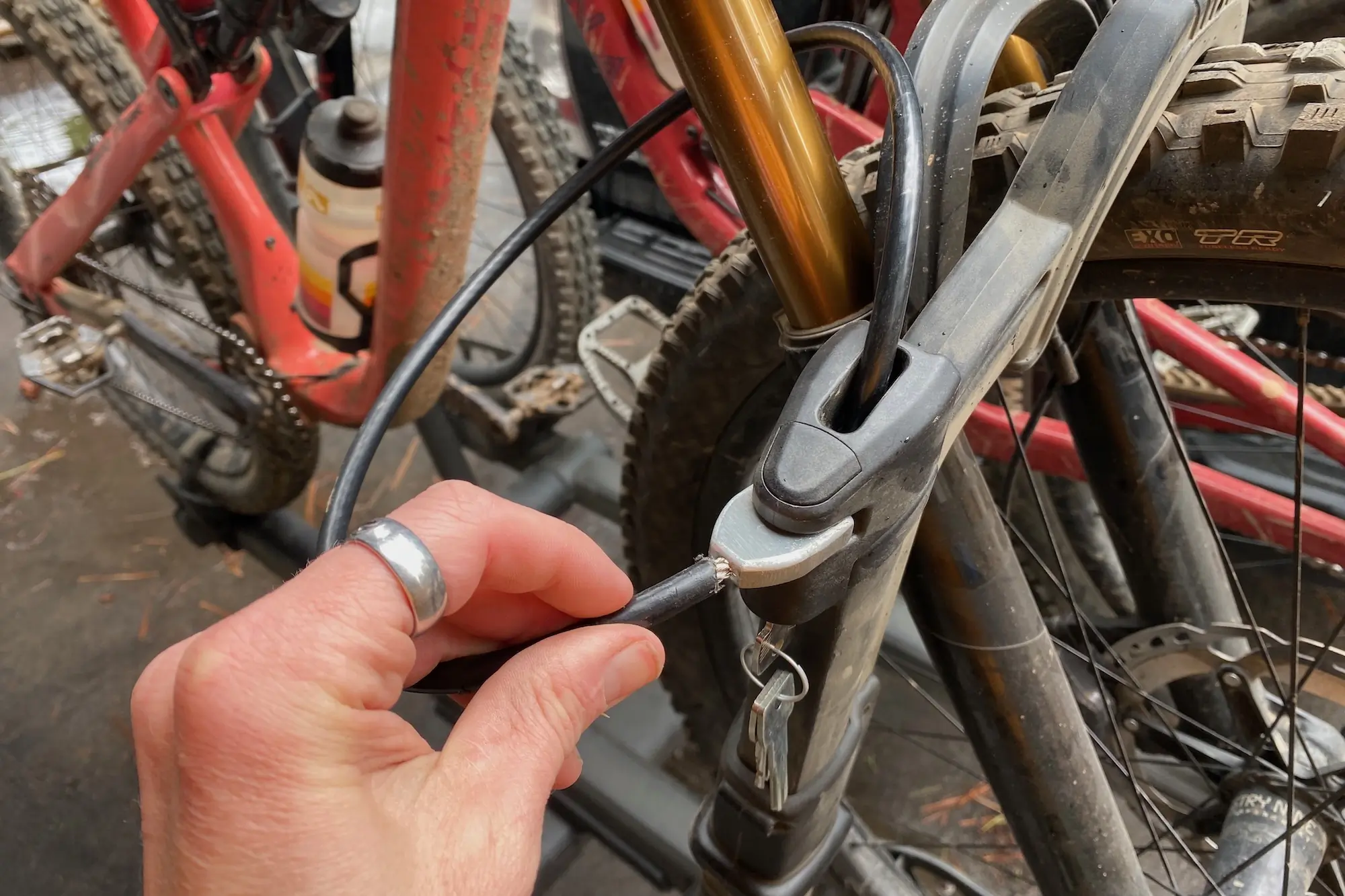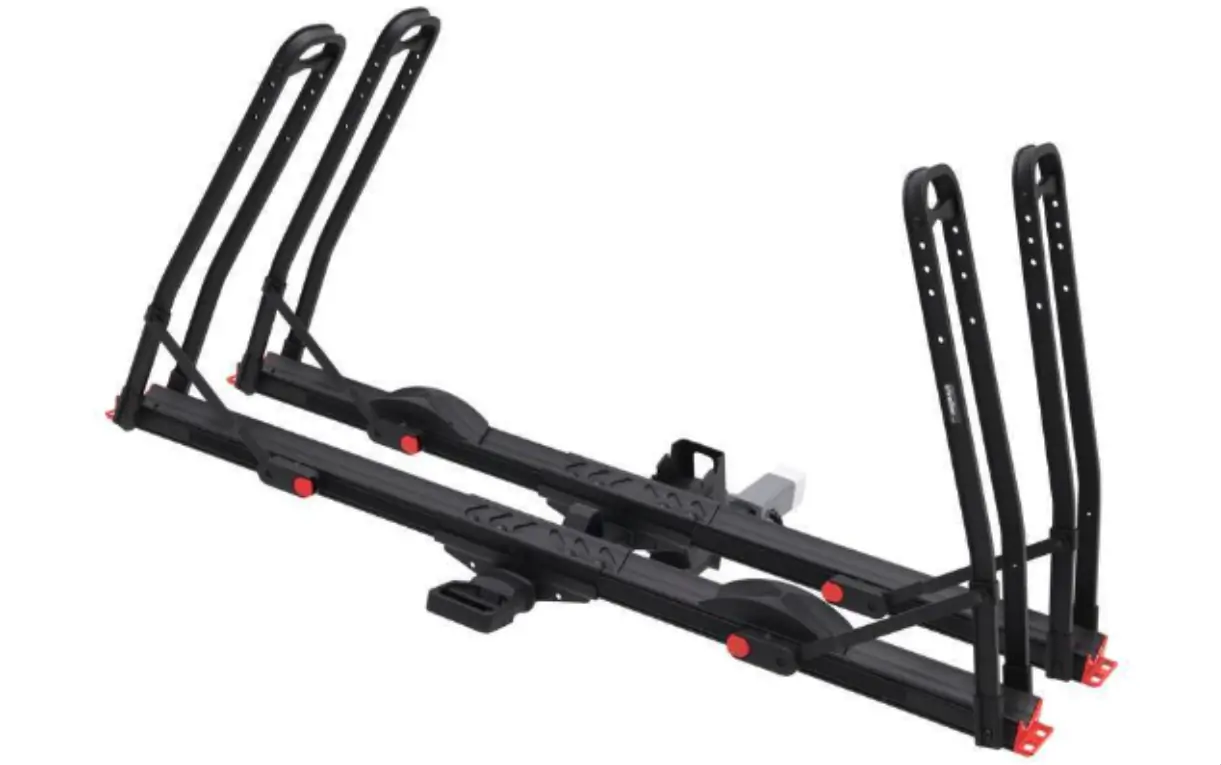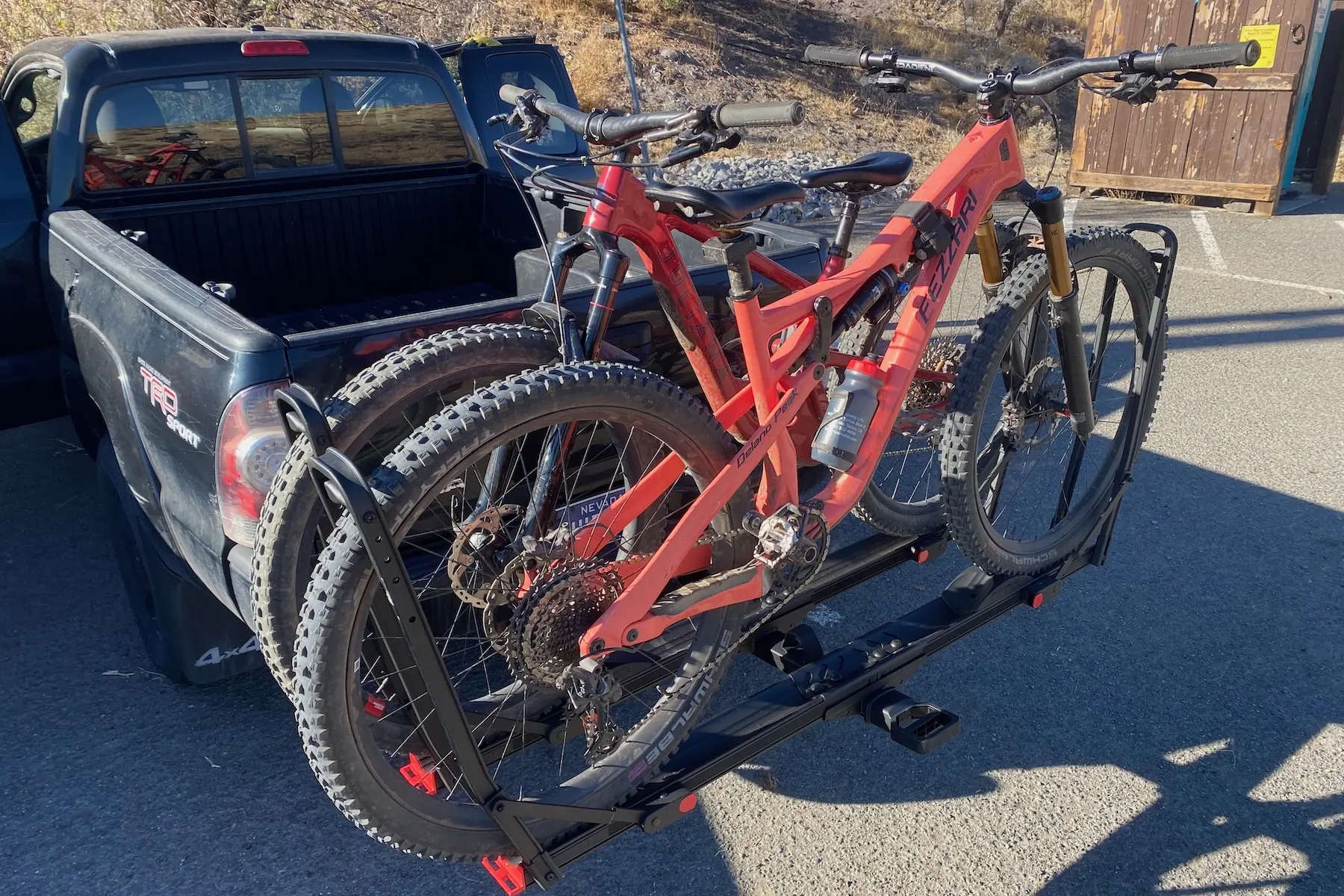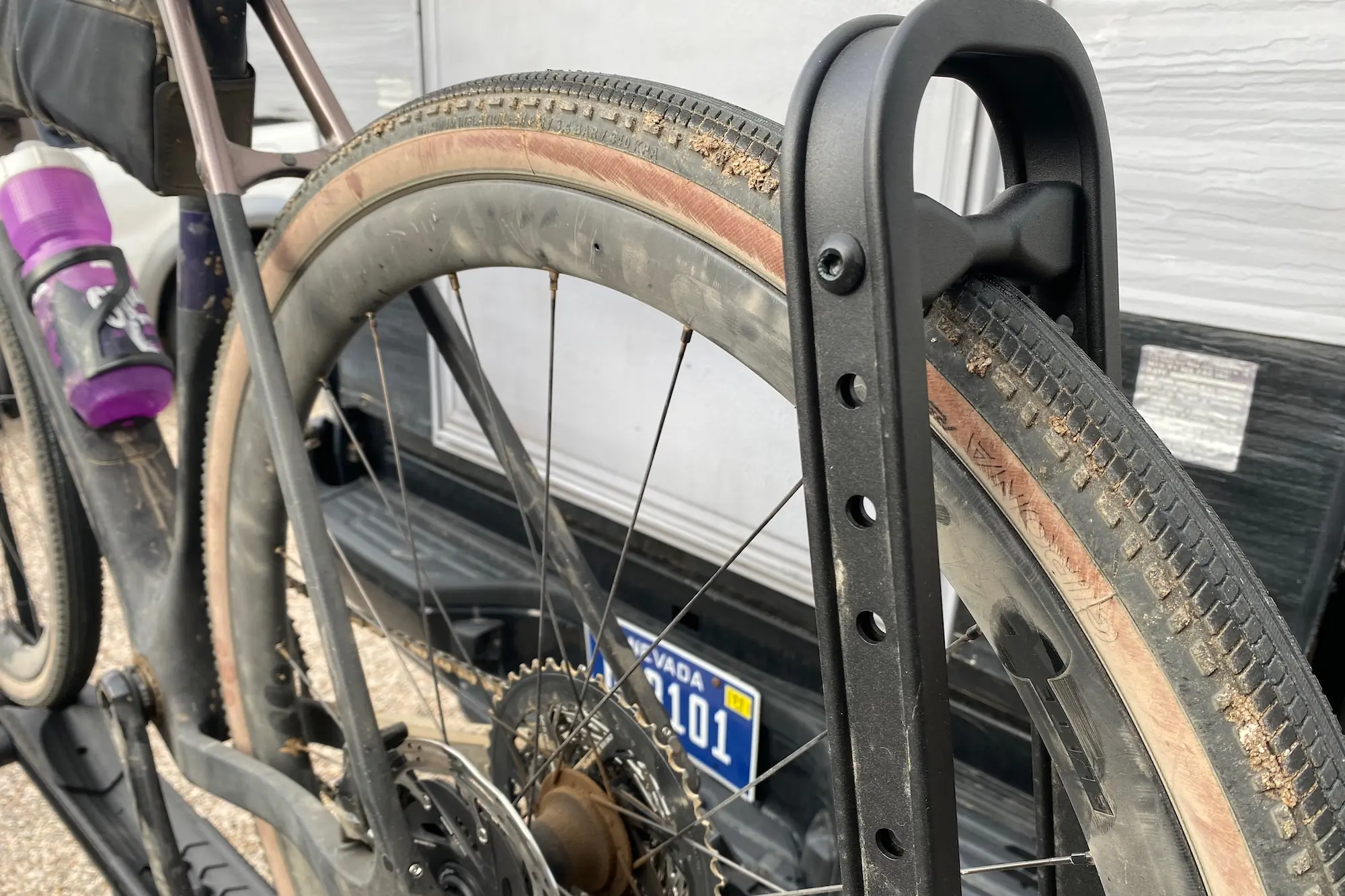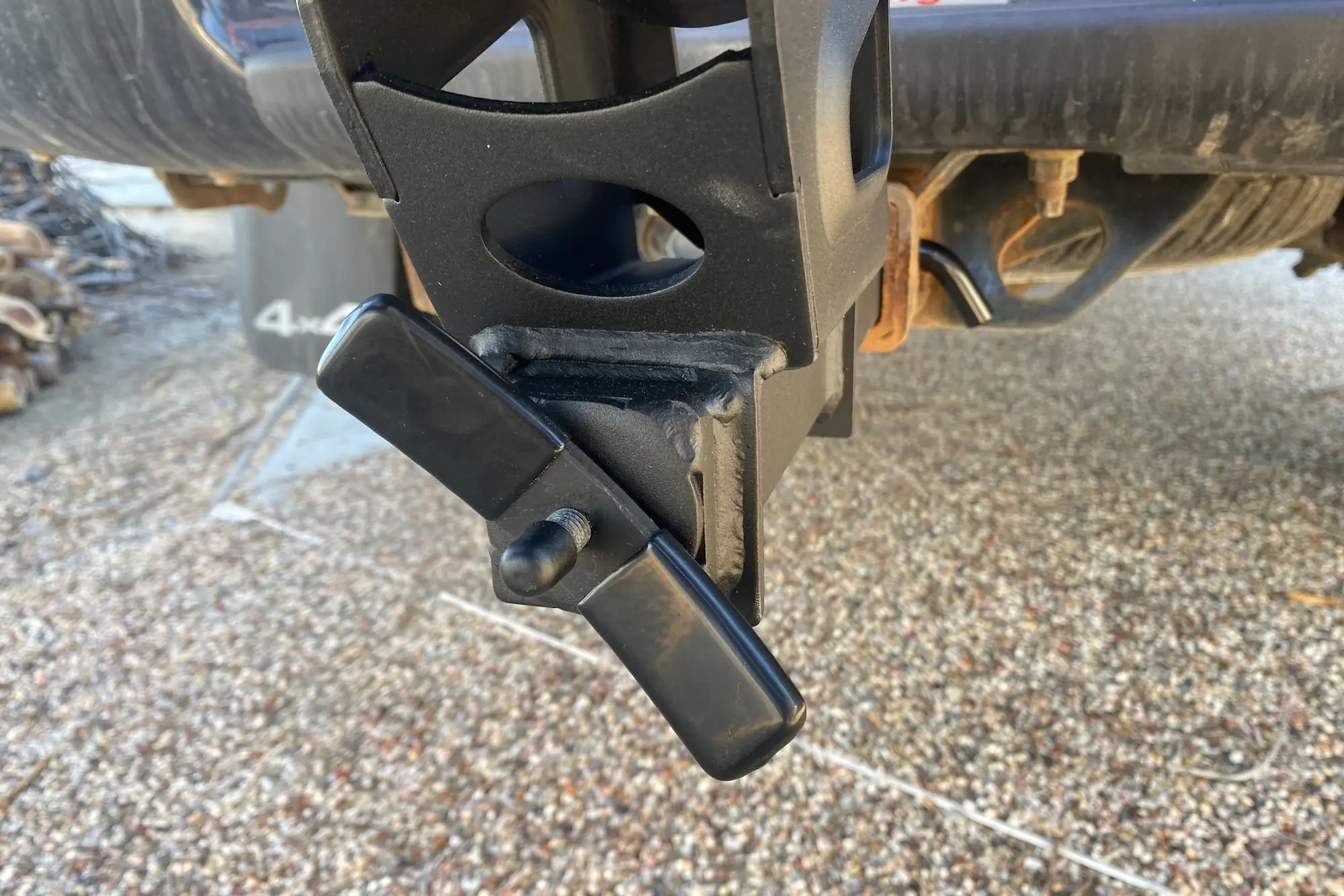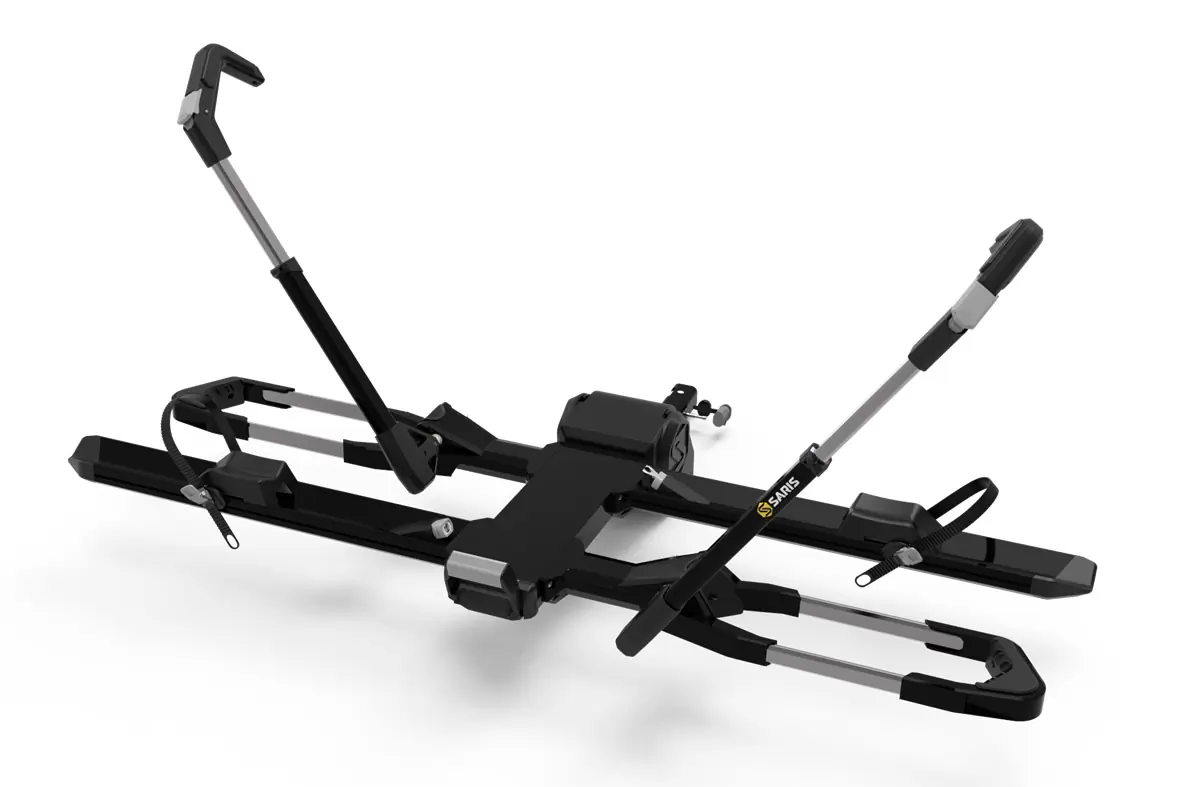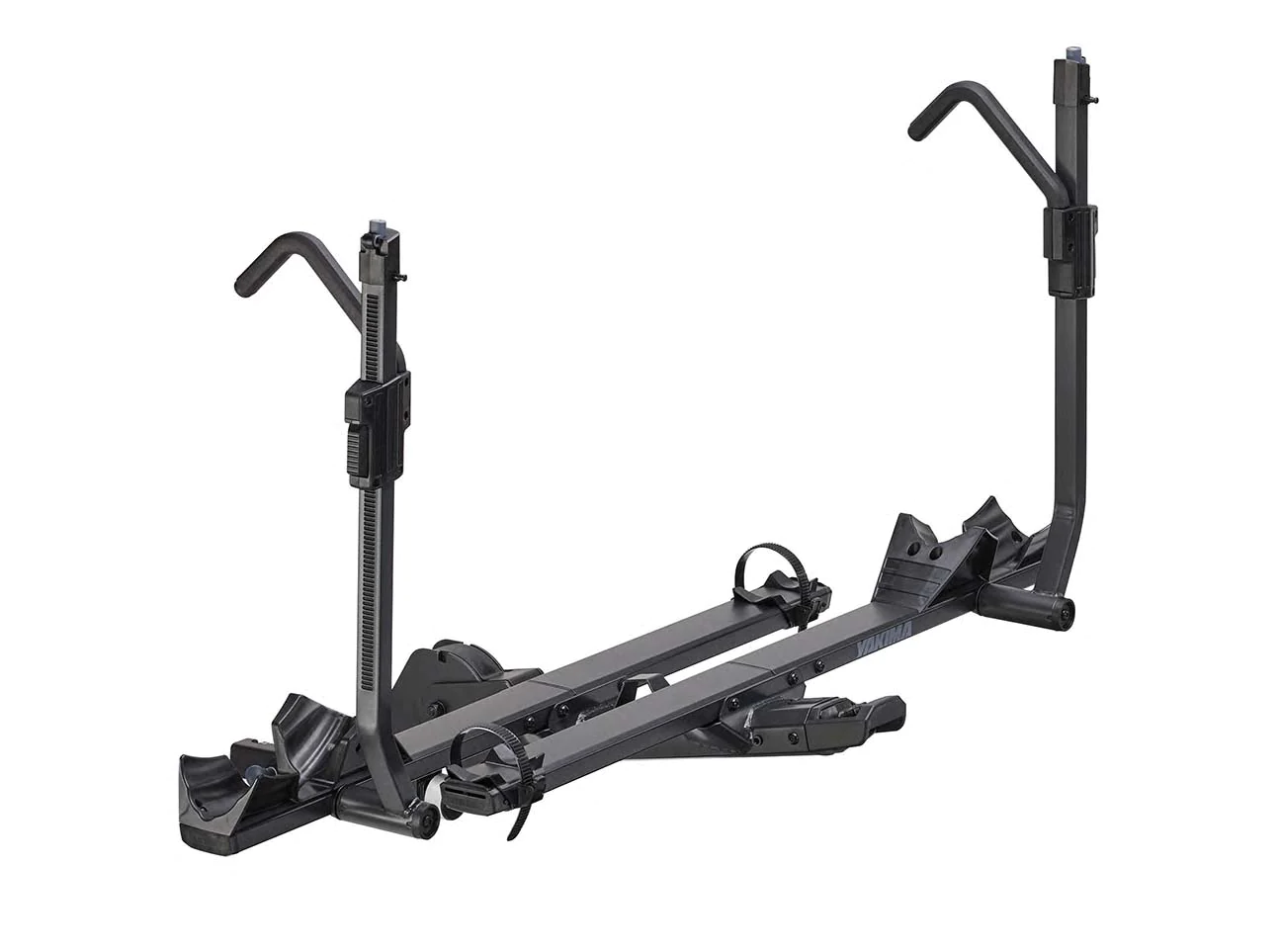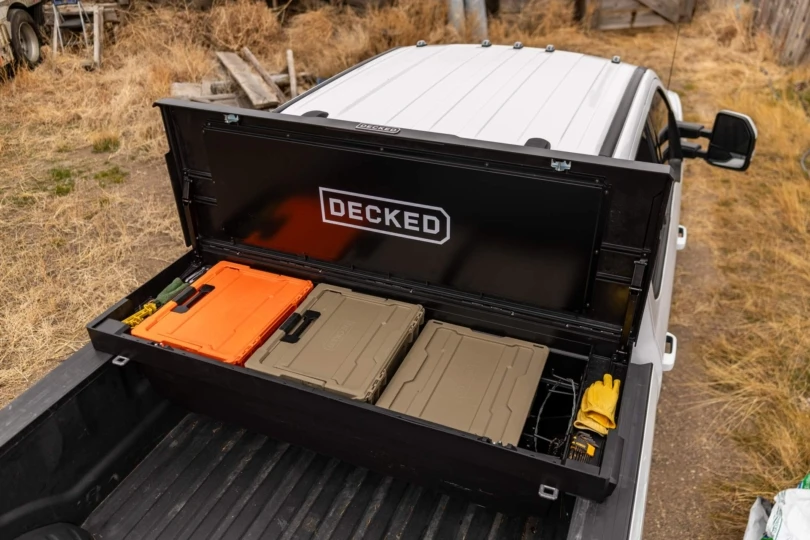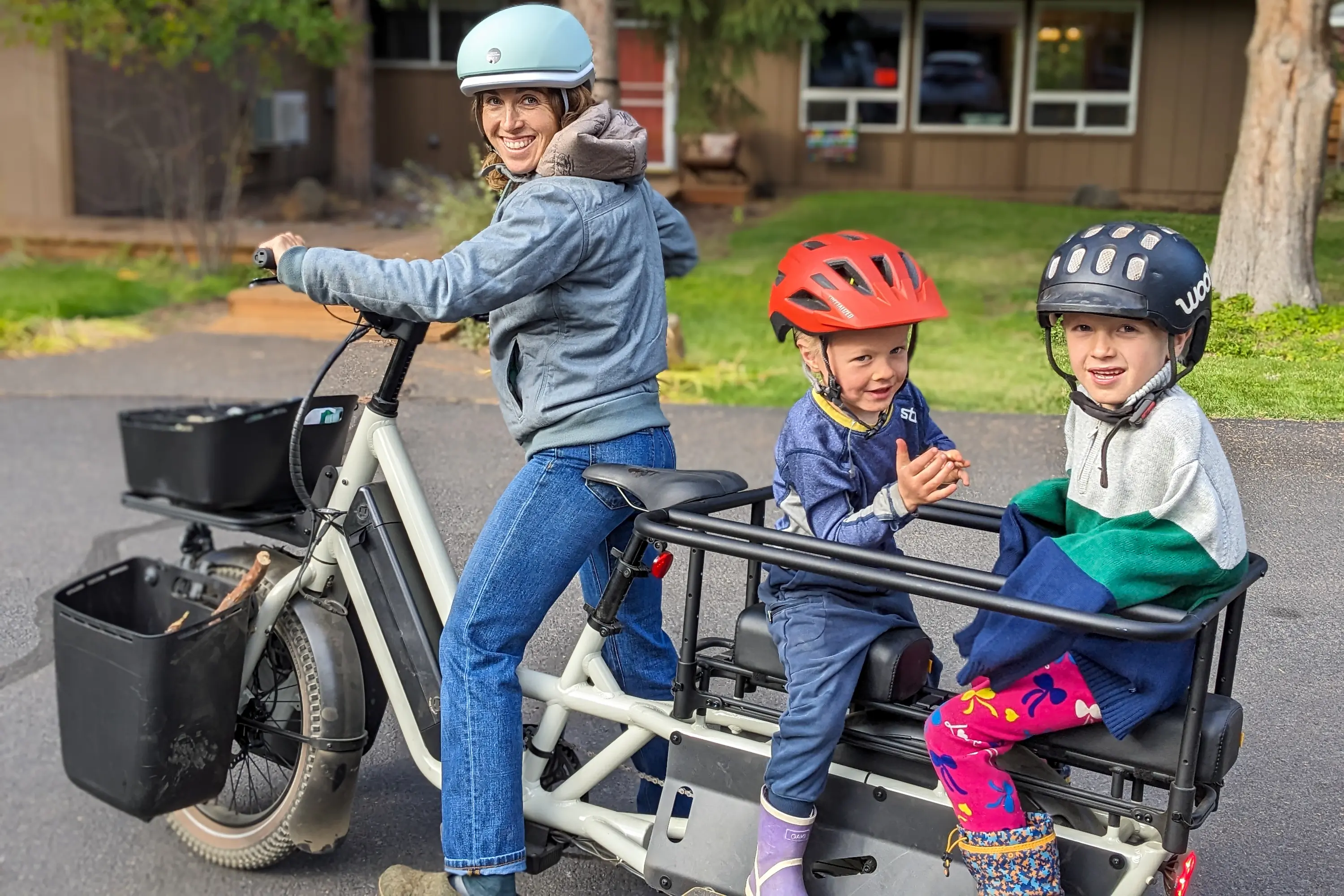Hitch bike racks are arguably the best way to transport your bikes safely to any destination. The best hitch racks are easy to use, stable, and can carry a range of bike sizes and styles securely and with little fuss.
Choosing a hitch bike rack, however, isn’t that simple. Factors like bike compatibility, weight limits, bike attachment style, and the number of bikes they can carry all play a role in finding the right rack that suits your needs and meets your budget.
Our team of hitch bike rack testers uses bike racks daily and has been testing and reviewing them for years. From family outings, trips to trailheads, and weekend getaways, we put these racks through their paces while examining the characteristics that matter most. From the top-rated Thule Verse to the wallet-friendly Kuat Transfer, we’ve got recommendations to suit your needs and meet your budget.
Editor’s Note: We refreshed our Hitch Bike Racks buyer’s guide on December 18, 2025, with the brand new award-winning Kuat Piston Ion, a rockstar hitch rack for heavy e-bikes that’s also certified for RVs and off-road travel.
The Best Hitch Bike Racks of 2026
Thule Verse
-
Ease of Assembly
7.0
-
Ease of Installation
9.0
-
Ease of Loading
10.0
-
Security & Stability
9.0
- Weight: 58 lbs.
- Number of bikes: 2 (up to 4 with add-on)
- Carry capacity: 60 lbs. per bike (2"), 55 lbs. (1.25")
- Hitch receiver options: 1.25", 2"
- Locks: Integrated receiver lock, included cable lock
- Type: Platform
Pros
- Easy to load and unload
- Wide range of bike fit
- Hold bikes securely and with no frame contact
- Stable in transit
- Cable lock for bikes included
Cons
- Lots of plastic parts
- 60-pound weight limit is no longer class-leading
- Expensive
Küat Transfer V2
-
Ease of Assembly
4.0
-
Ease of Installation
8.0
-
Ease of Loading
7.0
-
Security & Stability
7.0
- Weight: 37 lbs. (2-bike, 2" receiver size)
- Number of bikes: 2 (up to 4 with add-ons), also comes in 1-bike and 3-bike versions)
- Carry capacity: 60 lbs. per bike (2" receiver size), 40 lbs. per bike (1.25" receiver size)
- Hitch receiver options: 1.25" and 2"
- Locks: Semi-integrated cable lock and FlatLock Hitch Cam (2" receiver size)
- Type: Platform
Pros
- Comparatively affordable
- Wide range of bike fit
- Lightweight
- Add-ons available to increase capacity
Cons
- Lots of plastic parts
- Less refined than more expensive options
- Quite a bit of assembly required
Küat Piston Ion
-
Ease of Assembly
6.0
-
Ease of Installation
5.0
-
Ease of Loading
9.5
-
Security & Stability
10.0
- Weight (lbs.): 68lbs
- Number of bikes: 2
- Carry capacity: 100lbs per tray, 80lbs mounted to RV
- Hitch receiver options: 2”
- Locks: Integrated Hitch Lock, Integrated Cable Lock
- Type: Tray Rack
Pros
- RV and off-road rated (100lbs capacity)
- Quick-adjust fender compatibility
- Integrated hitch and cable locks
- Light and license plate kit maintains full legality
Cons
- Pricey
- Tilt-away feature could interfere with truck tailgates
Yakima RidgeBack
-
Ease of Assembly
8.0
-
Ease of Installation
9.0
-
Ease of Loading
5.0
-
Security & Stability
6.0
- Weight: 35 lbs.
- Number of bikes: 4
- Carry capacity: 40 lbs. per bike
- Hitch receiver options: 1.25" and 2"
- Locks: SpeedKnob locks rack to vehicle, cable lock for bikes sold separately
- Type: Hanging
Pros
- Ease of use
- Lightweight and easy to store
- Affordable
- Integrated bottle opener
Cons
- Cable lock not included
- Impossible to avoid frame contact
- Frame adapters are separate purchases
RockyMounts BackStage Swing Away Platform
-
Ease of Assembly
6.0
-
Ease of Installation
5.0
-
Ease of Loading
8.0
-
Security & Stability
8.0
- Weight: 63 lbs.
- Number of bikes: 2
- Carry capacity: 60 lbs. per bike
- Hitch receiver options: 2"
- Locks: Integrated hitch lock and bike cable lock
- Type: Platform
Pros
- 180-degree arm swing for full use of the back of the vehicle even with bikes loaded
- Less expensive than a swing-away extension plus bike rack
- User-friendly rack with versatile bike fit
Cons
- Complicated assembly takes some trial and error to get right
- Add-on for additional bikes not available
VelociRAX 5X Max
-
Ease of Assembly
6.0
-
Ease of Installation
5.0
-
Ease of Loading
9.0
-
Security & Stability
8.0
- Weight: 94 lbs.
- Bike Capacity: 5 (3 to 7, depending on the model)
- Carry Capacity: 100 lbs. per bike (2")
- Hitch Receiver Compatibility: 2" (2.5" and 3" using hitch adaptor)
- Locks: Integrated locking pin for hitch attachment, loop for after-market cable lock
- Type: Vertical
Pros
- Excellent release lever and hydraulic dampers provides slow lower
- Generous 15-inch spacing between baskets
- Anti-rattle hitch expander works well
- Excellent ground clearance
Cons
- No integrated locks for bikes
Other Hitch Racks to Transport Your Bikes
- Weight: 64 lbs. double, 37 lbs. single, 2" receiver size
- Number of bikes: 1 or 2, expandable to 4
- Carry capacity: 100 lbs. per bike up to 2 bikes
- Hitch receiver options: 2" and 2.5"
- Locks: Integrated pin locks for both bikes and hitch receiver
- Type: Platform
Pros
- Extremely durable
- Every part is replaceable with hand tools
- Nothing touches the bike frame
- All-aluminum construction resists rust and corrosion
Cons
- Heavy
- Weight: 76 lbs.
- Number of bikes: 6 (also comes in 4-bike version)
- Carry capacity: 240 lbs. total (roughly 40 lbs. per bike, suitable even for a heavy 55-lb. e-bike positioned in the middle)
- Hitch receiver options: 2"
- Locks: Yes, locking hitch bolt and the option to use your cable and U-lock.
- Type: Vertical, handlebar hang
Pros
- Impressive carrying capacity
- Foot-activated tilt
- Accommodates all types of bikes (and even snowboards and skis!)
- Durable and proudly made in the USA
- Avoids bike compatibility pitfalls of some other vertical racks
Cons
- Does not come with an integrated lock for bikes
- Heavy and requires significant storage space when taken off car
- Expensive
- Bike capacity: Up to 3
- Weight capacity: 3,415 lbs.
- Maximum bike wheelbase: 57"
- Bike wheel size compatibility: 16" to 29"
- Hitch size: 2"
- Rack weight: 44 lbs., single tray
Pros
- Super stable with heavy e-bikes over rough terrain
- Has capacity for e-motos
- Incredibly solid billet aluminum construction
- All parts are replaceable
- Nothing touches the bicycle or e-moto frame
Cons
- Heavy, especially with two bike trays
- Lowering rack to clear hatches and tailgates requires extra steps
- Expensive for a single bike hitch rack
-
Ease of Assembly
7.0
-
Ease of Installation
9.0
-
Ease of Loading
8.0
-
Security & Stability
8.0
- Weight: 52 lbs.
- Number of bikes: 2 (up to 4 with add-on)
- Carry capacity: 60 lbs. per bike
- Hitch receiver options: 1.25", 2"
- Locks: Integrated bike lock, included receiver lock
- Type: Platform
Pros
- User-friendly
- Secures bikes with no frame contact
- Easy to install and remove from vehicle
- Wide range of bike fit
Cons
- Moderately pricey
- Integrated locks feel pretty flimsy
- Weight: 60 lbs.
- Number of bikes: 1 or 2 bike options
- Carry capacity: 66 lbs. per bike
- Hitch receiver options: 1.25", 2"
- Locks: Included cable lock and locking hitch pin (keyed alike)
- Type: Platform
Pros
- Dual clamp arms only contact bike tires
- High weight limit – 66 lbs. per bike
- Comes with locks
- Convenient tilt-release handle
- Secure bike hold – included wheel chocks
- Stable – good anti-wobble system on 2" version
Cons
- Fairly expensive
- Fairly heavy
- No add-ons to expand capacity
-
Ease of Assembly
6.0
-
Ease of Installation
6.0
-
Ease of Loading
8.0
-
Security & Stability
8.0
- Weight: 66 lbs.
- Number of bikes: 2
- Carry capacity: 80 lbs. per bike
- Hitch receiver options: 2”
- Locks: Hitch pin lock and integrated cable lock
- Type: Platform
Pros
- 80-pound weight limit — can handle heavy e-bikes
- Tool-free installation
- Sturdy, wobble-free
- Very secure bike hold
- No frame contact — front wheel hook can’t even scuff up forks
Cons
- Expensive
- Heavy and bulky when not in use
- No add-ons to expand capacity
- No compatible loading ramp accessory
-
Ease of Assembly
9.0
-
Ease of Installation
9.8
-
Ease of Loading
4.0
-
Security & Stability
3.0
- Weight: 23 lbs.
- Number of bikes: 4
- Carry capacity: 35 lbs. per bike
- Hitch receiver options: 1.25" and 2"
- Locks: None
- Type: Hanging
Pros
- Very inexpensive
- Lightweight and easy to store
- Easy installation
Cons
- No security features
- Frame contact carry
- Rack and bikes wobble around
-
Ease of Assembly
7.0
-
Ease of Installation
6.0
-
Ease of Loading
9.0
-
Security & Stability
9.0
- Weight: 66 lbs.
- Number of bikes: 2
- Carry capacity: 70 lbs. per bike on road; 42 lbs. per bike off-road
- Hitch receiver options: 1.25" and 2"
- Locks: Integrated bike lock and hitch receiver lock
- Type: Platform
Pros
- Accommodates a wide range of bike sizes and types
- High weight limit — good for e-bikes
- Ramp add-on available for loading heavy bikes
- Durable and secure while driving off-road
- Integrated bike lock is streamlined
Cons
- Tilt lever needs mindfulness — make sure it’s fully latched
- Significant max weight difference between paved and off-road use
- Heavy and bulky — difficult to move around and store
-
Ease of Assembly
7.0
-
Ease of Installation
9.0
-
Ease of Loading
8.0
-
Security & Stability
7.0
- Weight: 32 lbs.
- Number of bikes: 2
- Carry capacity: 40 lbs. per bike
- Hitch receiver options: 1.25", 2"
- Locks: Hitch pin lock and cable lock for bikes
- Type: Platform
Pros
- Easy install
- Lightweight and low profile
- Good-looking
- Tilts away from vehicle while fully loaded
Cons
- Lower weight capacity- 40 lbs.
- Limited wheelbase length – doesn't work with longer bikes
- Not compatible with add-ons
- Weight: 85 lbs.
- Number of bikes: 4
- Carry capacity: 60 lbs. per bike
- Hitch receiver options: 2"
- Locks: Included for hitch and bikes
- Type: Platform
Pros
- Frameless contact
- Rock-solid stability
- Good weight capacity
Cons
- Pricey
- Doesn’t fit fat bikes
- Heavy and very bulky
- Weight: 28 lbs.
- Number of bikes: 2
- Carry capacity: 35 lbs. per bike
- Hitch receiver options: 1.25" and 2"
- Locks: None
- Type: Platform with wheel cradles and frame hooks
Pros
- Secure cradle system
- Great price point
- Lower weight
Cons
- No access to the rear of your vehicle when bikes are on the rack
- Hold bikes by frame contact
- Somewhat cheap overall feel
-
Ease of Assembly
5.0
-
Ease of Installation
4.0
-
Ease of Loading
8.0
-
Security & Stability
7.0
- Weight: 105 lbs. (2 33-lb. trays, 39-lb. base hitch)
- Number of bikes: 2 (3 bikes with add-on)
- Carry capacity: 80 lbs. per bike
- Hitch receiver options: 2"
- Locks: Locking hitch pin, integrated bike lock cables
- Type: Platform
Pros
- Easy to operate
- Quick load time
- Modular system to dial it in to your needs
- High weight limit
Cons
- Cost-wise the pieces add up
- On the arms, the release levers can get a tad stubborn
- The rack and bikes wobble on rocky, bumpy terrain
Hitch Bike Racks Comparison Chart
| Racks | MSRP | Rack Weight | Number of Bikes | Carry Capacity (per Bike) |
|---|---|---|---|---|
| Thule Verse | $1,000 | 58 lbs. | 2 (4 with add-on) | 60 lbs. (2″), 55 lbs. (1.25″) |
| VelociRAX 5X Max | $1,149 | 94 lbs. | 5 (3 to 7, depending on the model) | 100 lbs. (2″) |
| Kuat Piston Ion | $1,289 | 68 lbs. | 2 | 100 lbs. (80 lbs. when mounted to RV) |
| Kuat Transfer V2 | $549 (2-bike) | 37 lbs. | 2 (up to 4 with add-ons) | 60 lbs. |
| RockyMounts BackStage Swing Away | $800 | 63 lbs. | 2 | 60 lbs. |
| 1UP USA Super Duty | $950 | 64 lbs. | 2 (up to 4 with add-ons) | 100 lbs. (less for add-ons) |
| Lolo 6-Bike Rack with Foot Activated Tilt | $1,175 | 76 lbs. | 6 (4-bike version available) | 240 lbs. total capacity |
| Kuat Piston Pro X | $1,589 | 63 lbs. | 2 (up to 3 with add-ons) | 67 lbs. (2″), 60 lbs. (1.25″) |
| Yakima RidgeBack | $459 | 35 lbs. | 4 | 40 lbs. |
| 1Up USA Xtreme Duty Single | $850 | 44 lbs., single tray | 3 | 150 lbs. |
| Thule T2 Pro XTR | $900 | 52 lbs. | 2 (4 with add-on) | 60 lbs. |
| Hollywood Racks CrossTrack | $750 | 60 lbs. | 2 (1-bike version available) | 66 lbs. |
| Saris Edge | $1,414 | 66 lbs. | 2 | 80 lbs. |
| Allen Sports Deluxe Hitch Bike Rack | $190 | 23 lbs. | 4 | 35 lbs. |
| Yakima StageTwo | $949 | 66 lbs. | 2 (up to 4 with add-ons) | 70 lbs. on-road, 42 lbs. off-road |
| Kuat Sherpa 2.0 | $759 | 32 lbs. | 2 (4 with add-on) | 40 lbs. |
| INNO Tire Hold Bike Hitch 4 | $1,000 | 85 lbs. | 4 | 60 lbs. |
| Swagman XC2 | $150 | 28 lbs. | 2 | 35 lbs. |
| Saris MHS DUO 1-Bike & Base | $240 and $350 | 105 lbs. (2-bikes) | 2 (3 bikes with add-on) | 80 lbs. |
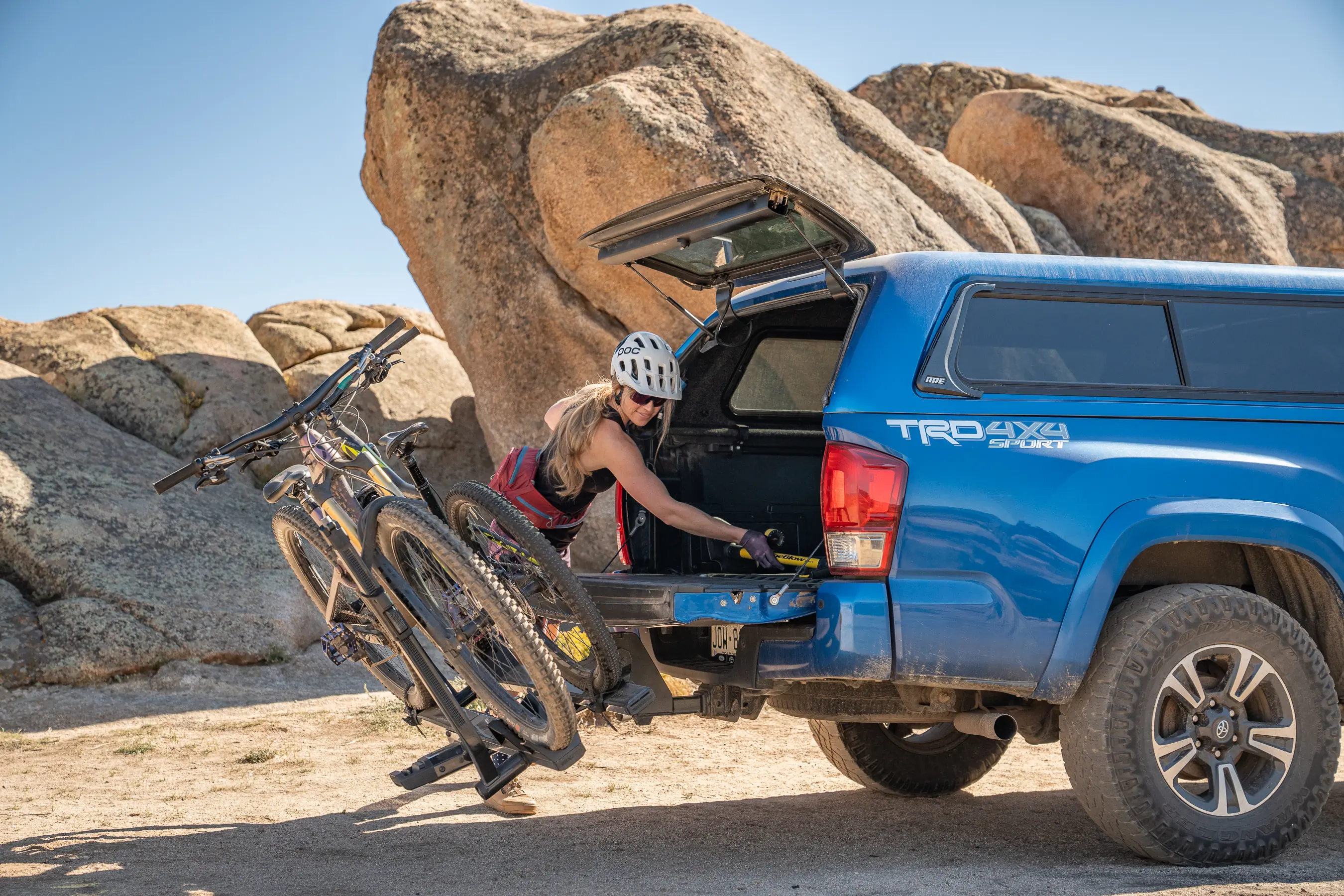
Our Expert Testers
The folks at GearJunkie spend a lot of time in the saddle. Two of our primary testers, Senior Editor Morgan Tilton and professional photographer and gear writer Eric Phillips, live in Crested Butte, Colo., where more than 750 miles of mountain bike trails exist in the Gunnison Valley and surrounding area.
They also drive to other trail systems in the Southwest, racking up hundreds of miles on each hitch rack per road trip. Tilton and Phillips have each tested most of the racks you see in this guide in the past few years. In doing so, they have developed a keen sense of what sets the best racks apart from the rest.
GearJunkie former Editor Jeremy Benson lends experience and expertise to this guide. Benson has been professionally testing bikes, accessories, and related gear for 8 years and has personally tested over 20 different hitch bike racks in that time.
He is constantly using bike racks to transport his expensive bikes to local trailheads, gravel and mountain bike races, and on weekend getaways to mountain bike destinations across the west. Having tested virtually every bike rack currently on the market, he knows exactly how they perform, compare, and their best applications.
Berne Broudy and Chelsey Magness have also contributed to this buyer’s guide. Magness is a professional adventure racer, parent, and event organizer who travels frequently with bikes to trailheads, races, and weekend getaways with family and friends. She’s been using and abusing hitch bike racks for many years — even before testing and reviewing them for GearJunkie — and knows the importance of having the right rack to make transporting bikes easy and stress-free.
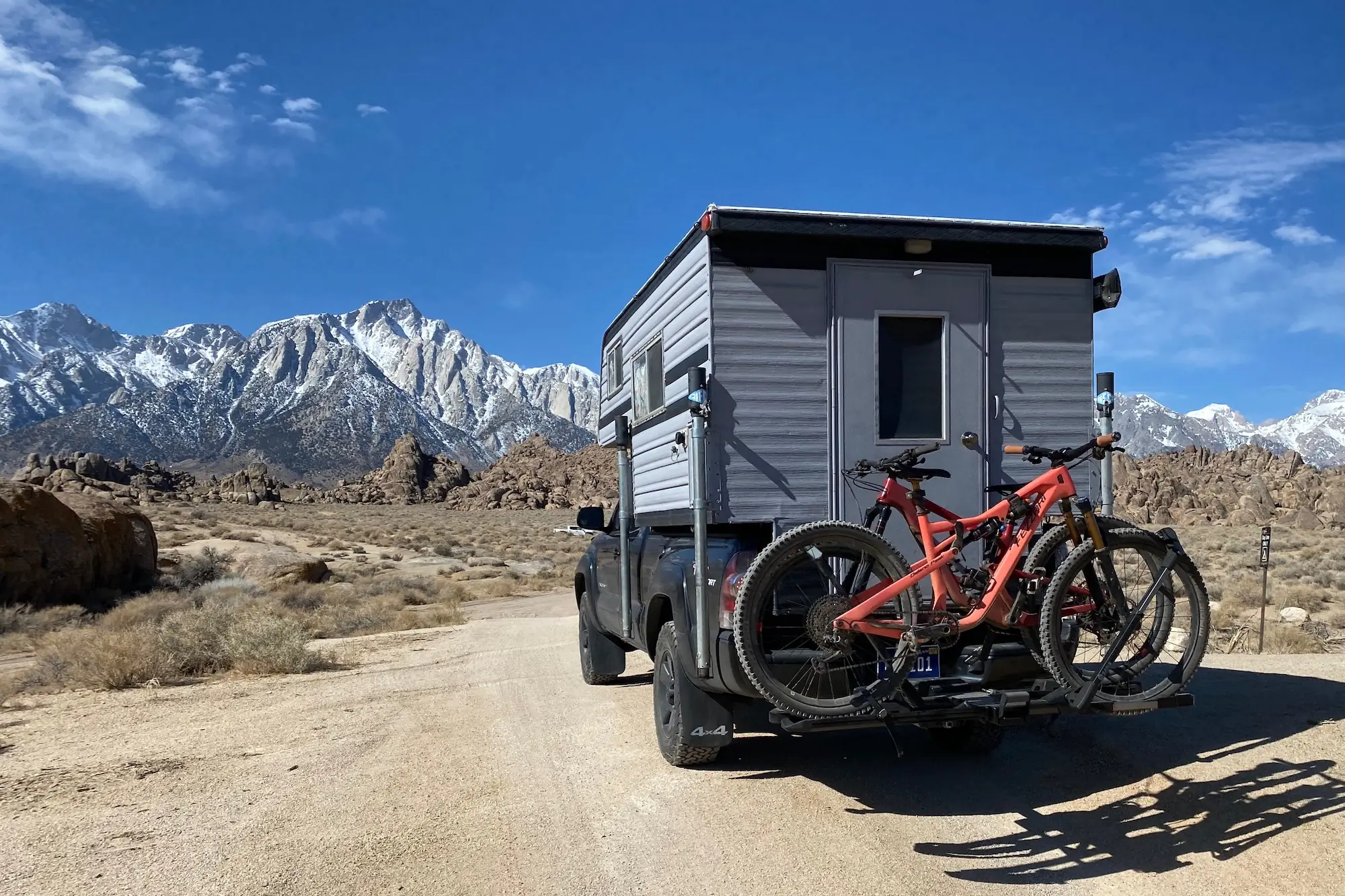



How We Tested Hitch Bike Racks
After researching the best hitch bike racks on the market, we chose the models included in this guide to put through real-world testing. We aren’t just concerned with specs. Rather, we put them through an extended period of rigorous testing to see how they actually perform. From daily trips around to local riding spots to weekend adventures with the whole crew, we use each of these racks as any consumer would.
We assemble the racks ourselves, install and remove them from our vehicles, and load and unload our bikes countless times. While testing, we examine bike compatibility, bike attachment systems, ease of loading/unloading, rack stability, bike stability, and security features.
From highways to rough gravel roads and hot summer days to cold, rainy, and snowy conditions, these racks have seen it all, with the goal of exposing their strengths and weaknesses.
Many of the racks featured here have been with us for many years. Even after regular exposure to the elements and many miles of rough roads, they’re still going strong. Whether you’re pedaling a gravel bike, electric bike, or commuter, we’re confident you’ll find a rack to help transport your steed. As new racks roll out in the future, we’ll be sure to test them, too, and update our list to reflect the latest and greatest models on the market.
If you’re looking for more ways to outfit your adventure rig, be sure to check out comprehensive guides to the best rooftop tents, spacious cargo boxes, and car and truck awnings.
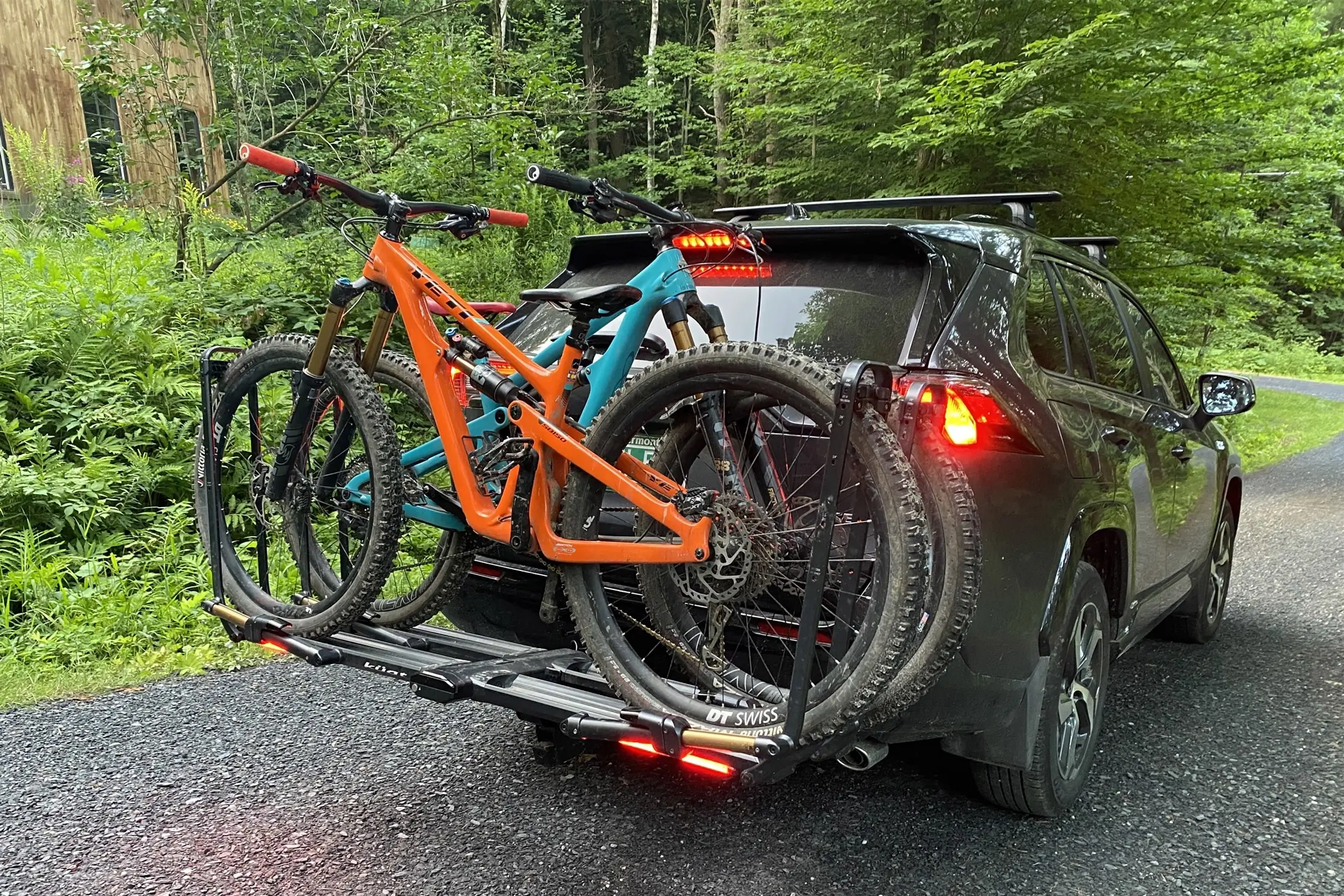



Buyer’s Guide: How to Choose a Hitch Bike Rack
There’s a lot to consider when searching for the right hitch bike rack to suit your needs. The different styles of hitch bike racks all have their pros and cons, but you’ll also want to consider the type of bikes you have, how much they weigh, and how many bikes you need to carry.
Those factors should help you narrow down the choice to find the best rack for you. If you’re looking for alternative ways to transport your bikes, check out our comprehensive guide to the best roof bike racks.
Types of Hitch Bike Racks
These days, hitch bike racks come in three basic styles. Platform racks are the most common, holding the bikes horizontally and supporting them from the bottom on a “platform” or tray. Hanging racks carry the bikes horizontally, but as the name suggests, they hang the bikes from a support arm by the top tube of the frame.
Vertical racks are a bit newer on the scene, but this style hangs the bikes vertically from either the front wheel, fork, or handlebar. We’ll explain the different types of racks in more detail below.
Platform
Platform-style racks use a platform, or tray, on which the bike rests. Compared to other styles of hitch racks, platform racks typically have the lowest loading height, making it fairly easy to lift bikes into position. The bikes are held in place using various methods, the most common of which is the front wheel clamp/hook.
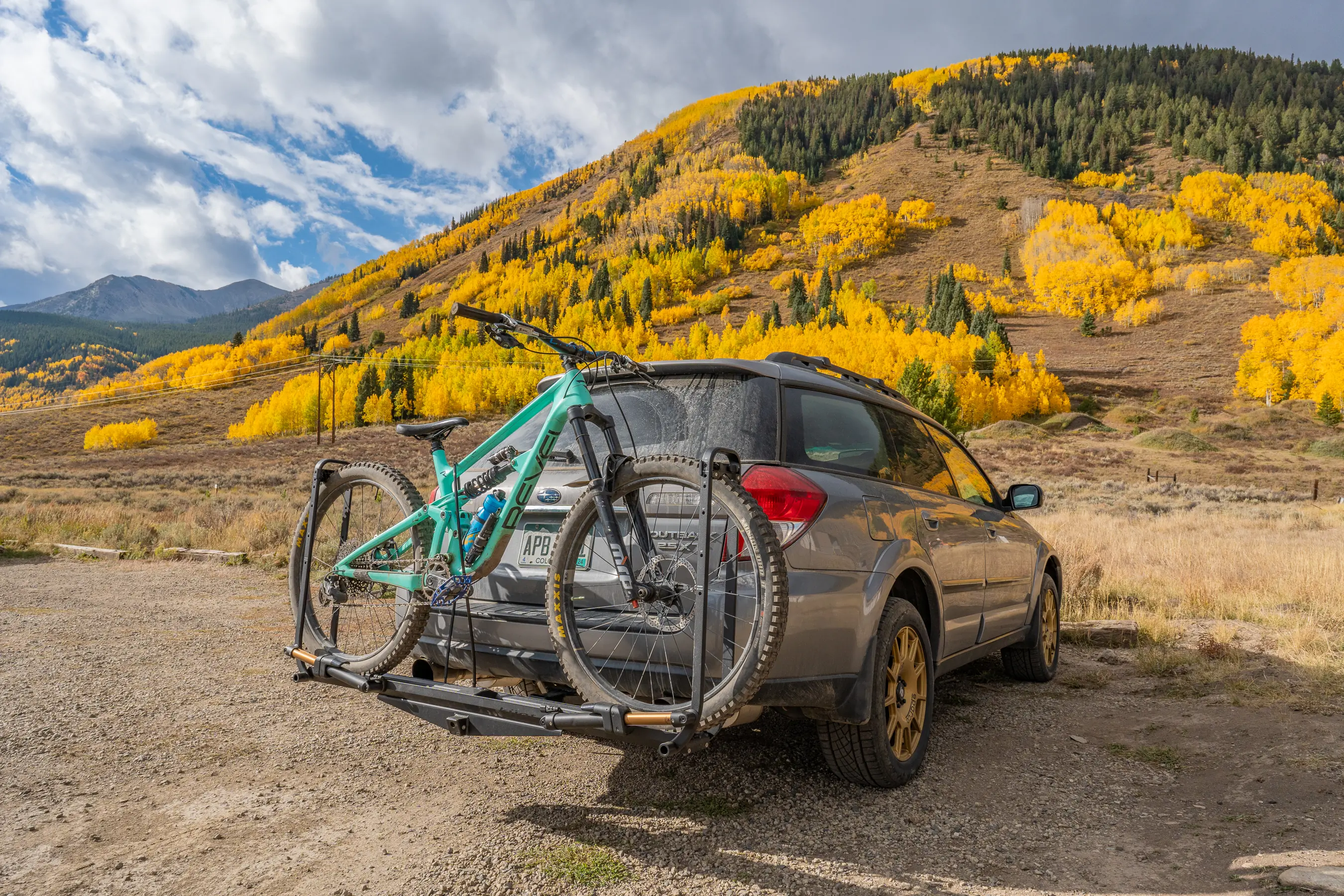



Most platform racks have the benefit of not touching the bike frame at all — they only touch the tires or wheels. This makes them ideal for people who don’t want to risk damaging their bike frames. Plus, the trays can often be adjusted to avoid or minimize bike-on-bike interference. This also allows platform racks to fit all kinds of bikes regardless of overall size, suspension style, or wheel size.
This combination of versatility and ease of use makes platform-style racks very popular among serious cyclists. The downsides are that they’re typically more expensive than hanging-style racks, and they are often heavy and quite bulky. They also usually only carry two bikes at a time, but often have the option to increase capacity with add-ons for an additional cost.
Hanging
Hanging racks typically have two support arms that hold bikes by the frames, letting the bikes hang down. The advantage here is that many of these racks can hold up to four bikes without added hardware, and they are typically less expensive than platform racks. Hanging racks are usually lighter weight as well, making them easier to install, remove, and store when not in use.
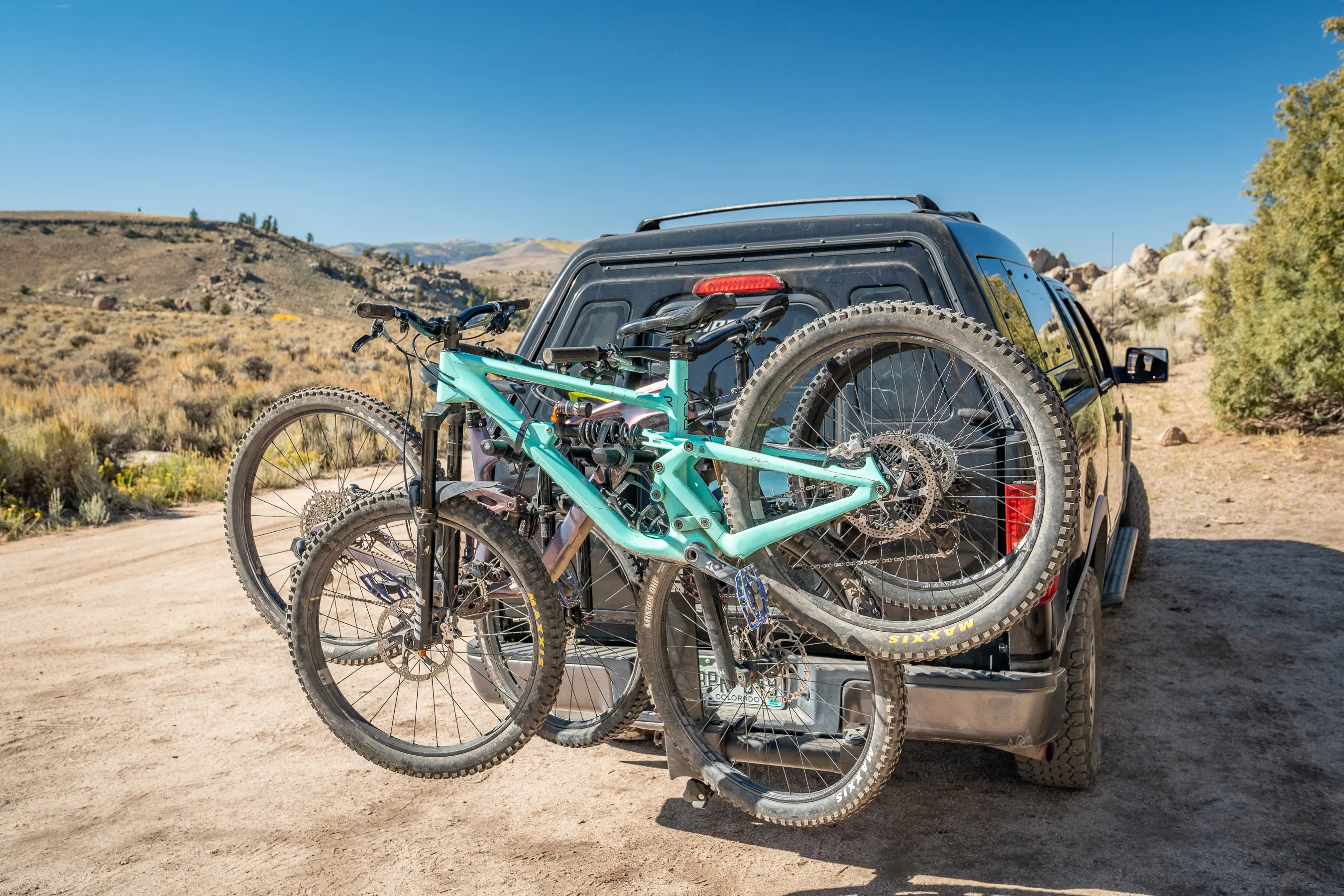



The main disadvantage is that contact with the frame can lead to abrasion and, in some cases, damage. This is a huge consideration when carrying a bike with a carbon fiber frame. Hanging racks also may not accommodate bikes with unusual frames (like step-through bikes) or full-suspension mountain bikes.
You may also want to secure the front tires to the frame with a bungee cord or a strap. This helps prevent the wheels from rotating and bumping into other bikes.
Vertical
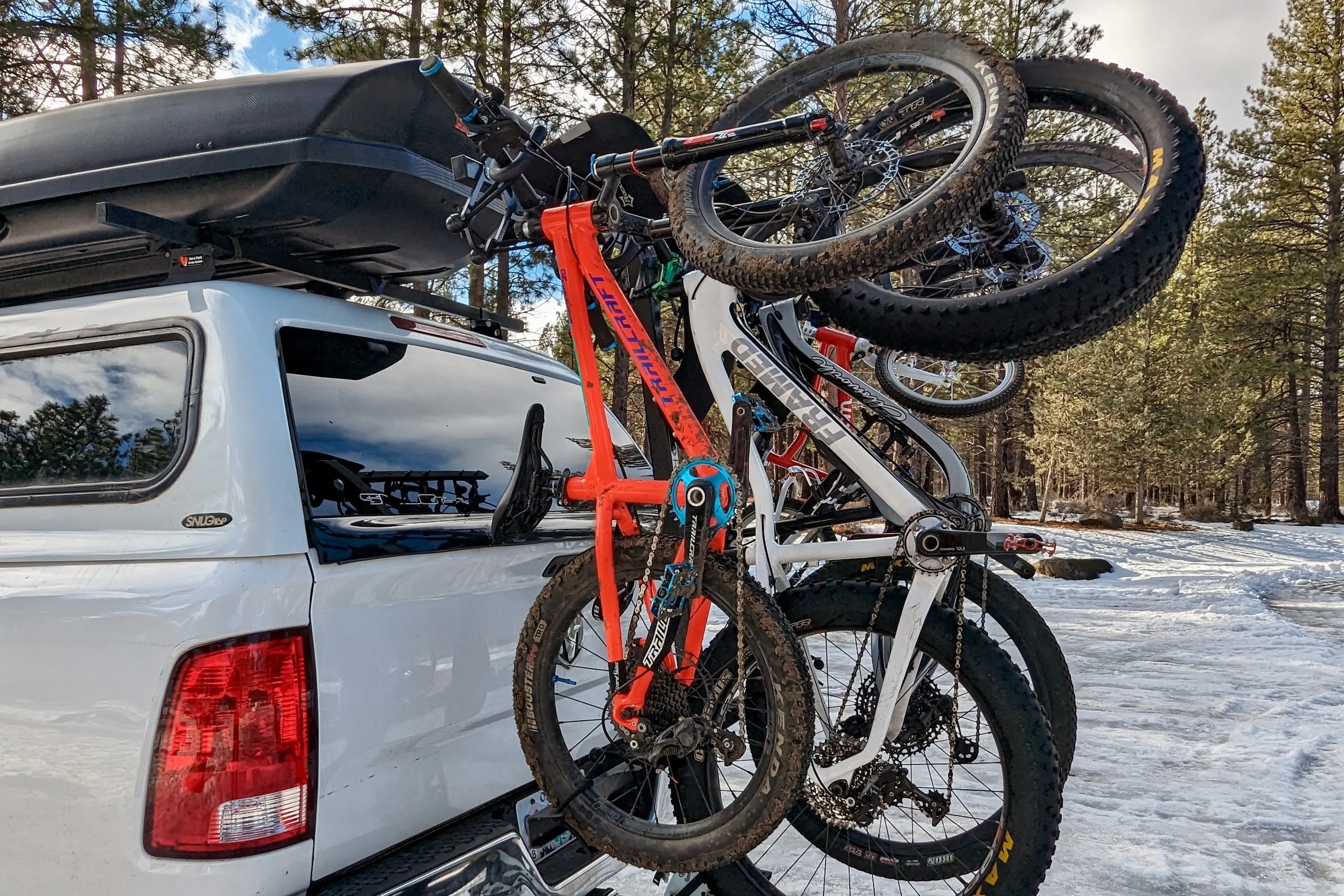



Vertical racks are a newer style that initially came about as a way to carry numerous mountain bikes for shuttle runs. By hanging the bikes vertically, it is possible to transport as many as six bikes at a time. While the early models held bikes by the crown of suspension forks and were limited to carrying mountain bikes only, more recent designs carry bikes by the front wheel or handlebar and are compatible with other types of bikes too. Vertical racks are a solid choice for families, people who ride with lots of friends, and mountain bike shuttles.
The main benefit of vertical racks is being able to transport more than four bikes at a time. The drawbacks are that they are heavy, bulky and difficult to store, and they are often quite expensive. That said, they end up being less expensive than many platform racks with add-ons.
Platform vs. Hanging vs. Vertical: Which Is Best?
Choosing between the rack styles really comes down to considering the type and number of bikes you need to carry. If you’re an infrequent rack user and you simply need to transport some older bikes to and from a vacation home a couple of times a summer, then an inexpensive hanging rack may suit your needs just fine.
If keeping your bikes stable, secure, and in pristine condition is important to you, platform racks are ideal. Most platform racks secure the bikes via the tires and/or wheels, avoiding frame contact entirely. They’re also easy to load and use, especially platform racks with a roll-up feature (or those compatible with aftermarket ramps). This is ideal for people transporting heavier bikes like cruisers or e-bikes.
Platform racks also win out if you transport bikes with unique frames (like a step-through bike) or full-suspension mountain bikes. You won’t have to find a way to weave any hanging arms through the frames.
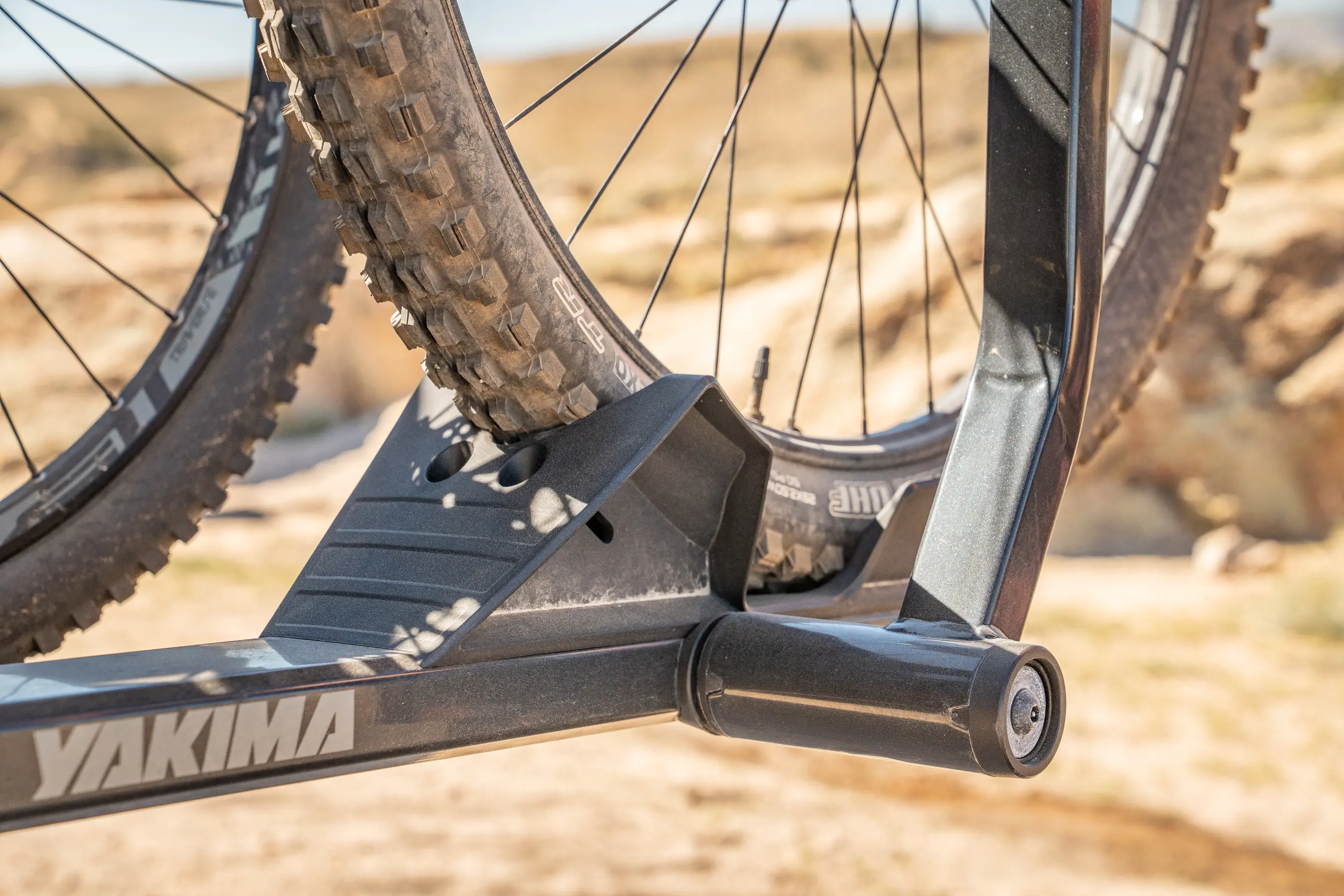



Generally speaking, platform racks as a whole typically come with bigger price tags than hanging racks. And, if you want to carry more than two bikes at a time, you’ll need to factor in the cost of add-ons too. If the price is no object and keeping your bike looking new is your priority, choose a platform rack. If you want to save money and aren’t concerned about wear, a hanging rack is a great choice.
Vertical racks are often the best choice for those who need to transport a larger number of bikes. While the upfront cost may seem high, they cost less than many platform racks with add-ons and are typically the only option for carrying more than four bikes at a time (other than tailgate pads).
And, while they used to be more limited in terms of bike fit, some of the newer models that hold bikes by the wheels or handlebars (like the Lolo Racks) will work with most bikes, including kids, road, gravel, etc. Bear in mind that they are much larger and will dominate the back of your vehicle a bit, so they may look a little out of place on smaller vehicles.
Bike Attachment
Bike attachment systems feature various ways to secure your bike to the rack. It varies depending on the style of the rack, but even then, there are often multiple different attachment systems within each style.
Straps
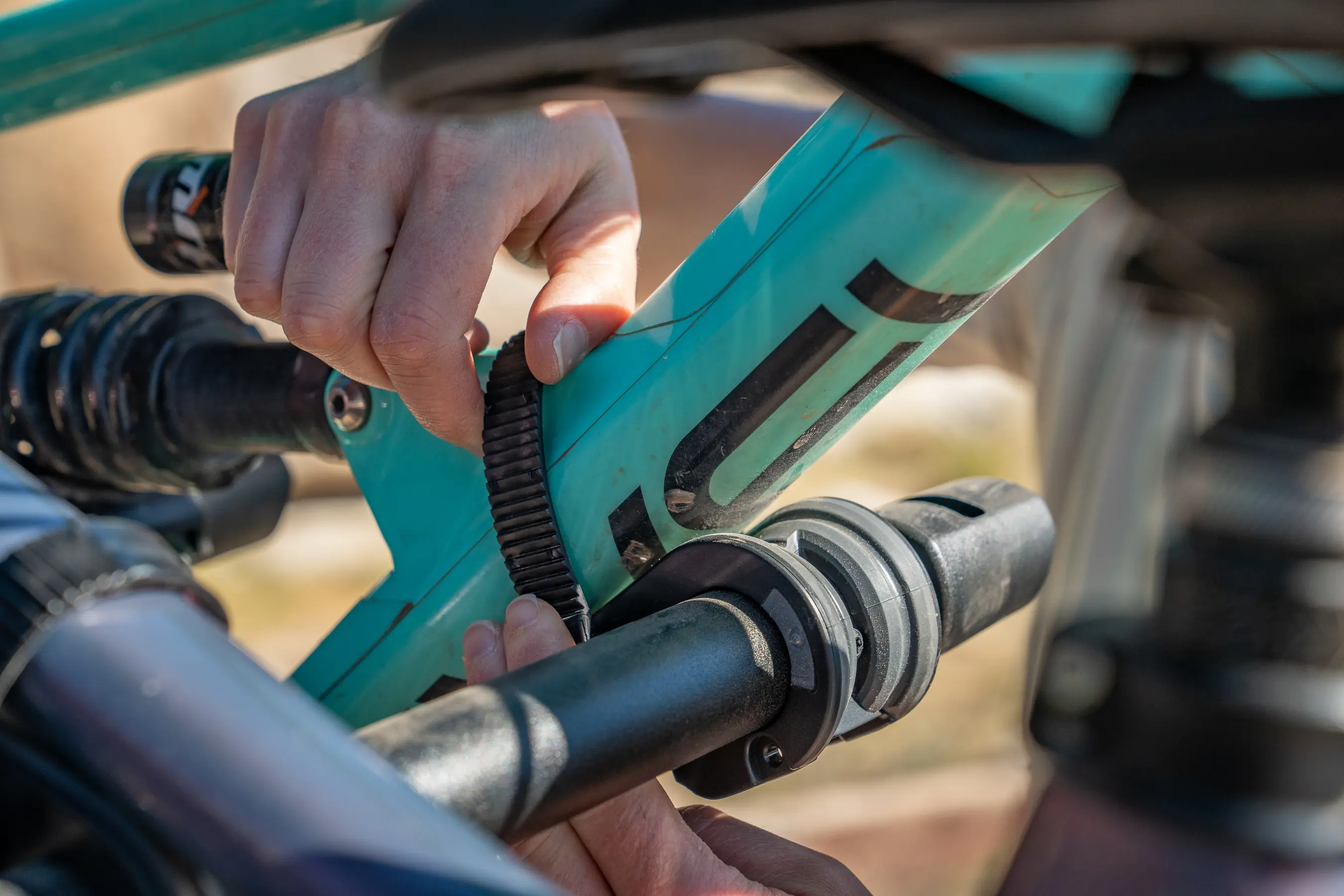



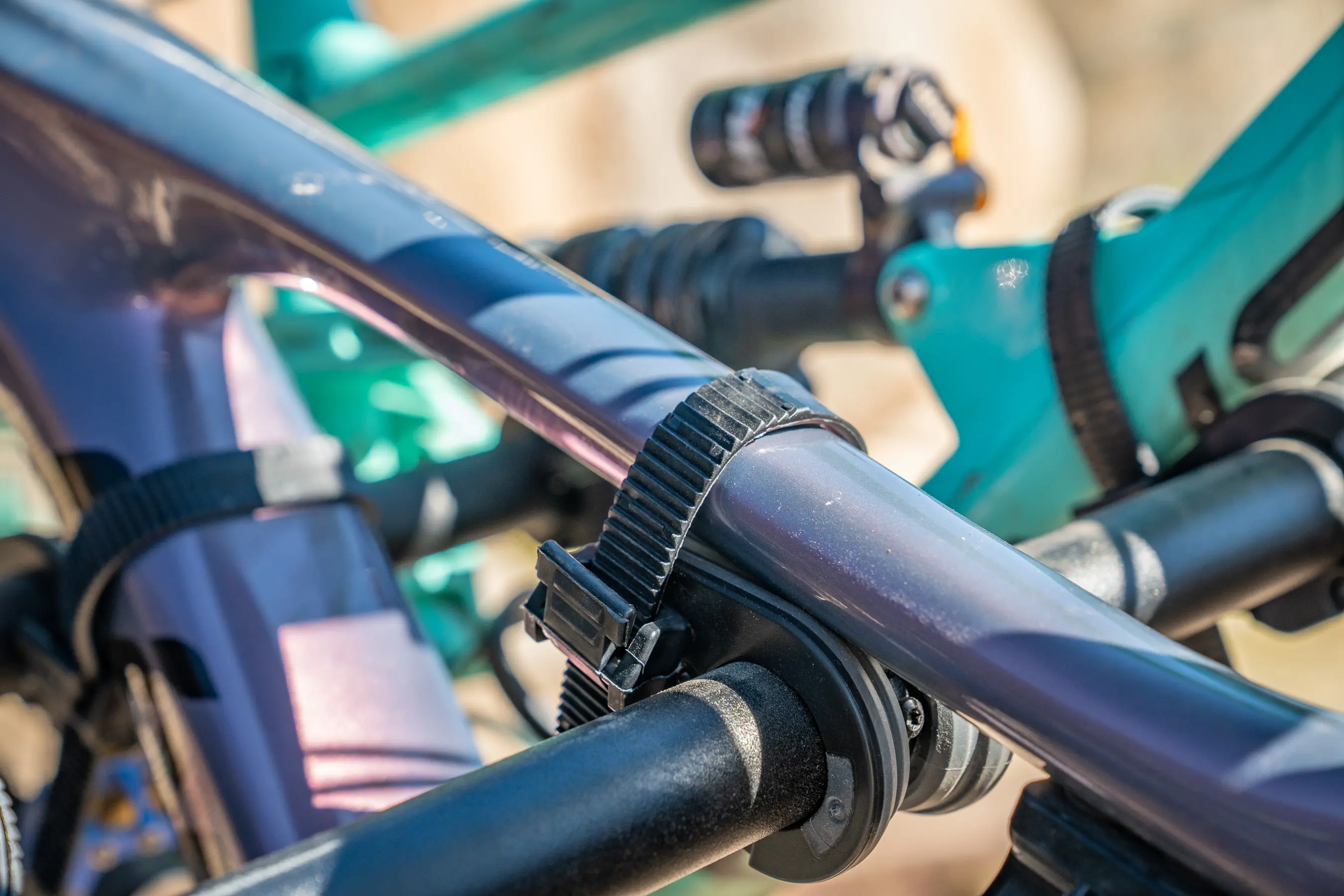



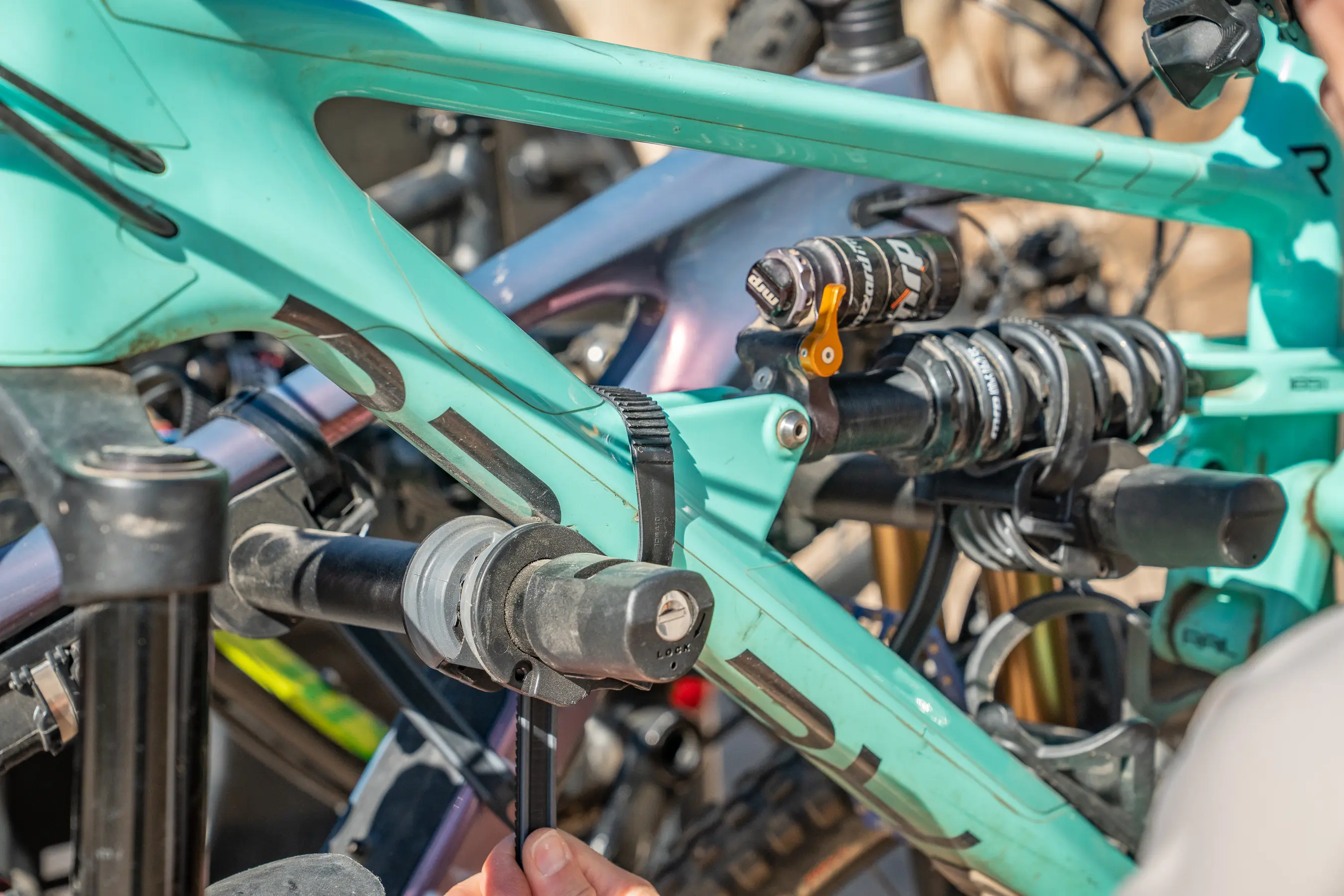



The first and most basic is the strap system which is most common on hanging racks. Small cradles on the support arms support the weight of the bike while a zip strip or cam strap holds the bike down in the cradle. While it’s a solid and secure system (user error is the most common issue), straps can degrade and break. Because of this, many strap systems secure the bike with two straps at each attachment point as a contingency.
Most riders’ main concern with a hanging rack is that it could potentially damage the bike’s finish over time through contact and abrasion. We’ve heard horror stories about hanging racks wearing the paint down to the metal or carbon beneath on long road trips.
While that’s an extreme case, slower wear over years of use isn’t. Because of this, hanging racks tend to feature padded cradles to minimize frame damage, but the best way to guarantee your frame is safe is to eliminate frame contact altogether.
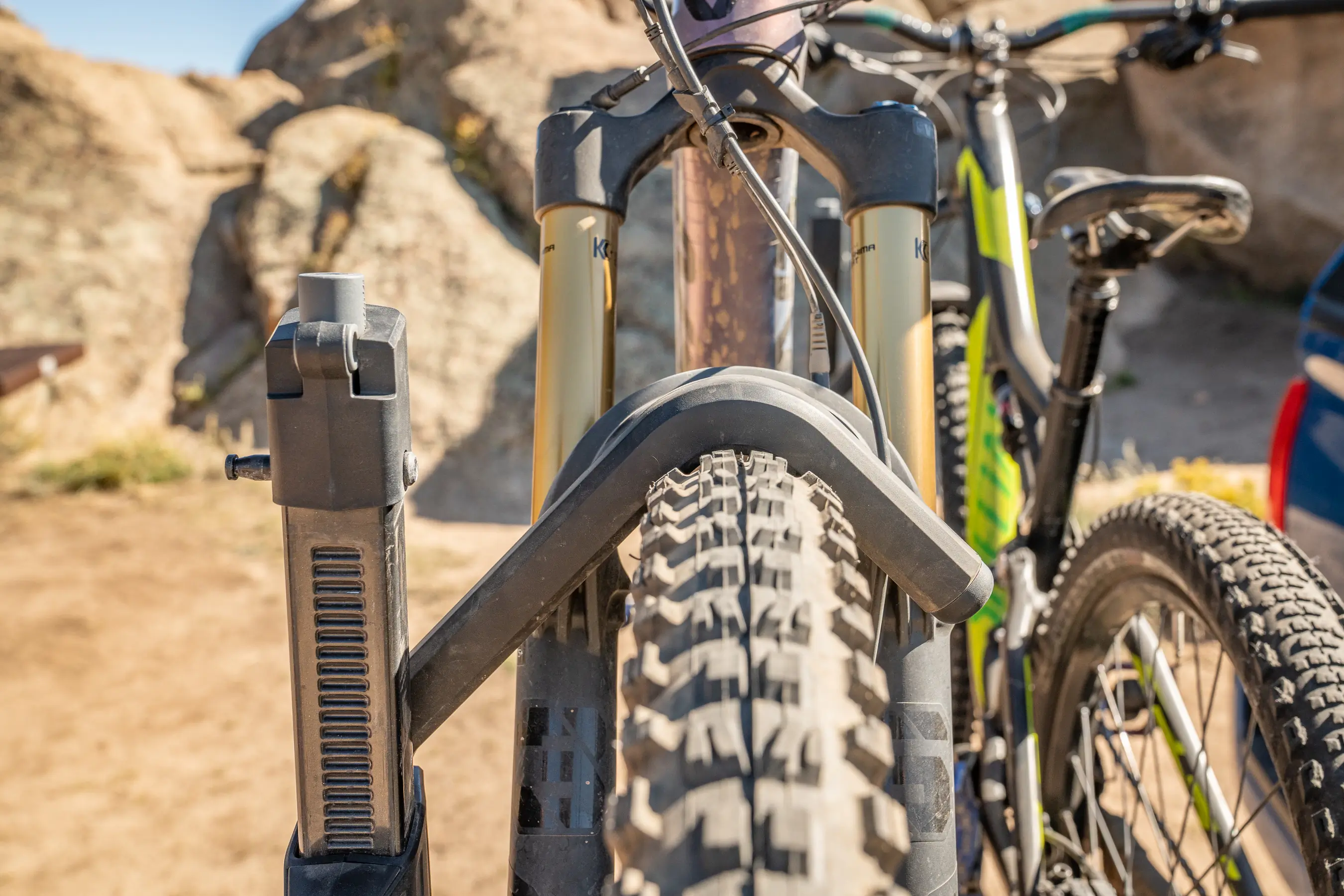



Wheel Hooks and Clamp Arms
Most platform racks use a front wheel clamp that is also often referred to as a shepherd’s hook. On these racks, a pivoting arm with an adjustable hook captures the front wheel and presses it down into a cradle while the rear wheel is secured with a ratcheting strap that wraps over the rear rim.
This attachment system avoids frame contact by using the front tire and rear rim to secure the bike on the rack. Not only is this system easy to use, but in our experience, it holds bikes very steady while preventing them from making contact with each other (if carrying multiple bikes).
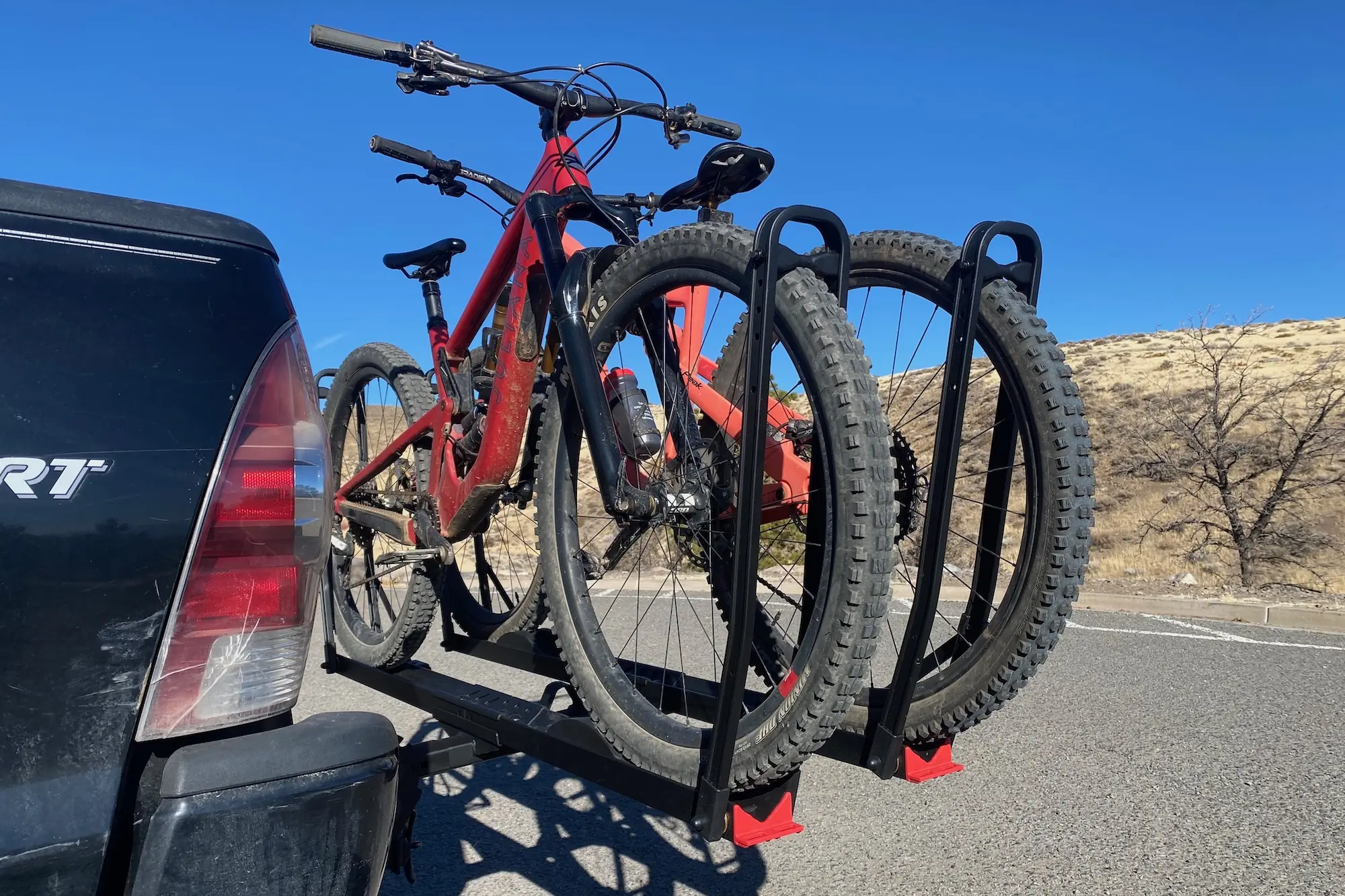



Other platform racks use opposing clamp arms that essentially sandwich the bike from both ends. This style of attachment was popularized by 1UP-USA and has since been employed by most other major rack manufacturers.
By holding bikes in contact with the tires only, these racks won’t even scuff up your fancy carbon rims. This system also allows for a huge range of bike fits, along with the ability to shift the bikes laterally to avoid bike-on-bike interference.
Vertical
Vertical racks support bikes by the fork, front wheel, or handlebar and typically have a strap or bungee that holds the rear wheel in place. Regardless of attachment style, vertical racks hold bikes in such a way that the bikes don’t contact each other.
Fork mount vertical racks, like the North Shore Racks, capture bikes by the crown of a suspension fork, and as such, they only work with mountain bikes, but they can cause abrasion damage to the paint on the fork crown over time.




Vertical racks with front-wheel cradles hang the bike by the front wheel and only make contact with the tire. These are a bit more versatile as they don’t rely on a suspension fork, so they can often be used with bikes with rigid forks (road, gravel, kids, and fat bikes), but you may need different cradles for different wheel sizes and tire widths.
Handlebar-mount vertical racks, like the Lolo Racks, hang bikes from the handlebar and are surprisingly versatile as a result. They can fit a wide variety of bike styles regardless of wheel and tire size, fork type, or handlebar style.
Number of Bikes
One of the first things to consider when choosing the style of rack that will work best for you is how many bikes you need to transport. Racks generally carry anywhere from two to six bikes, so you have some options. Remember, you can always carry fewer bikes than a rack’s capacity, but never more than a rack’s capacity. And you never know when you’re going to pick up a few more buddies to ride with.
Platform racks come in varying capacities, with most providing two spots for bikes (some come as single or three-bike racks, too). Many platform racks can also be expanded with add-ons that can be attached to increase capacity by one or two bikes to carry up to four.
Hanging racks also come in various carrying capacities, typically between two and five bikes. The Yakima Ridgeback and Allen Sports Deluxe can both carry up to four but can also be purchased for two bikes.
Vertical racks can typically handle the most bikes with the models we tested being offered in four-bike and six-bike versions.
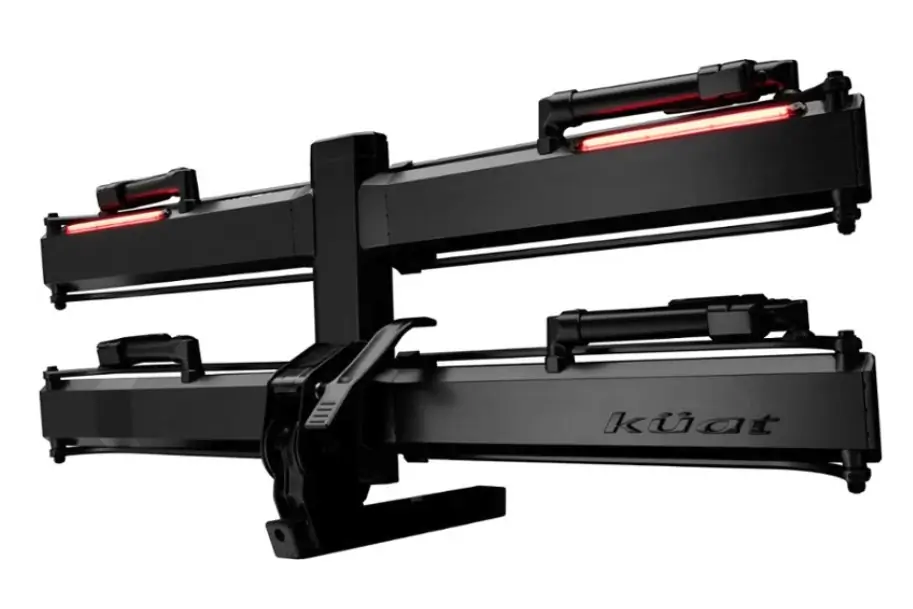



Bike Weight
Most good hitch bike racks can handle the weight of regular, non-electric bikes without any issues. Many modern racks are now rated to handle bikes up to around 60 pounds, which is great news for everyone who has e-bikes, which often weigh upward of 50 pounds. It is very important to know how much your bike(s) weigh when considering a new rack and make sure that the rack you choose is capable of handling the weight.
In general, platform racks often have the highest weight capacities, with models like the Yakima StageTwo, Kuat Piston Pro X, and the Hollywood Racks CrossTrack claiming up to 70 pounds, 67 pounds, and 66 pounds per bike, respectively. Other racks, like the Thule T2 Pro XTR and the RockyMounts BackStage, can handle bikes up to 60 pounds each.
Another thing to consider is loading heavy bikes. There are a few models designed specifically for use with e-bikes on the market nowadays. These are often clunky, and most secure bikes by clamping directly to the frame. Other racks, like the Kuat Piston Pro X, Yakima StageTwo, Hollywood Racks CrossTrack, and the 1UP-USA Super Duty, are all compatible with aftermarket loading ramps sold by their respective manufacturers.
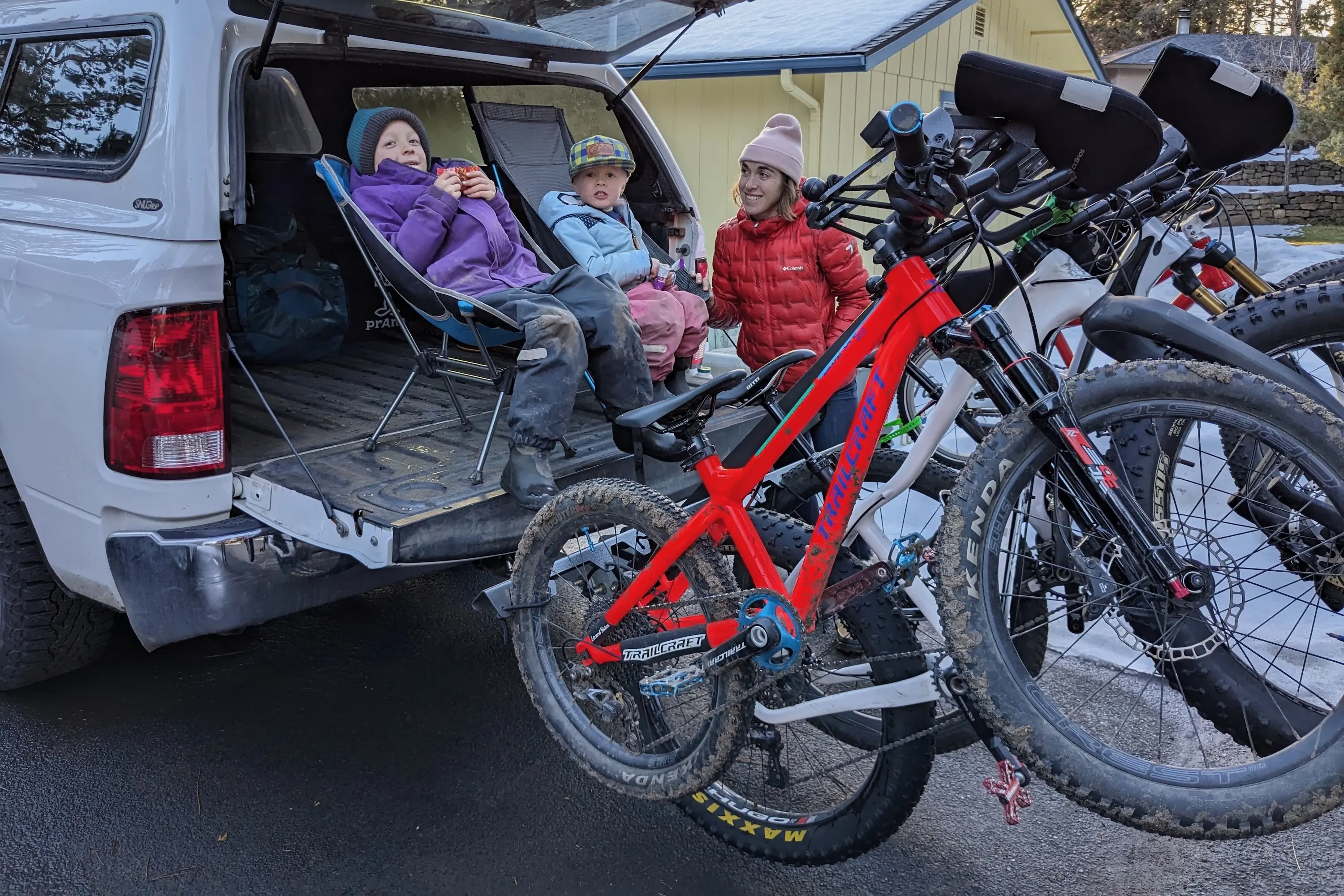



Tilt and Swing-Away Features
The “tilt” and “swing-away” features refer to how the rack adjusts to allow access to your vehicle. Tilt features are super common and allow the rack to be tilted away from the vehicle at an angle to open a hatchback or drop down a tailgate. This makes it possible to lean in and grab a backpack or let your dog hop out. It also makes it possible to fold the rack up when not in use to keep it out of the way.
One thing to consider is whether you can tilt the rack while the bikes are still on it. It can be a pain to take the bikes off when you need to get into your car. Also, consider how far it tilts away. This will make a huge difference if you’re pulling out something unwieldy, like a cooler.
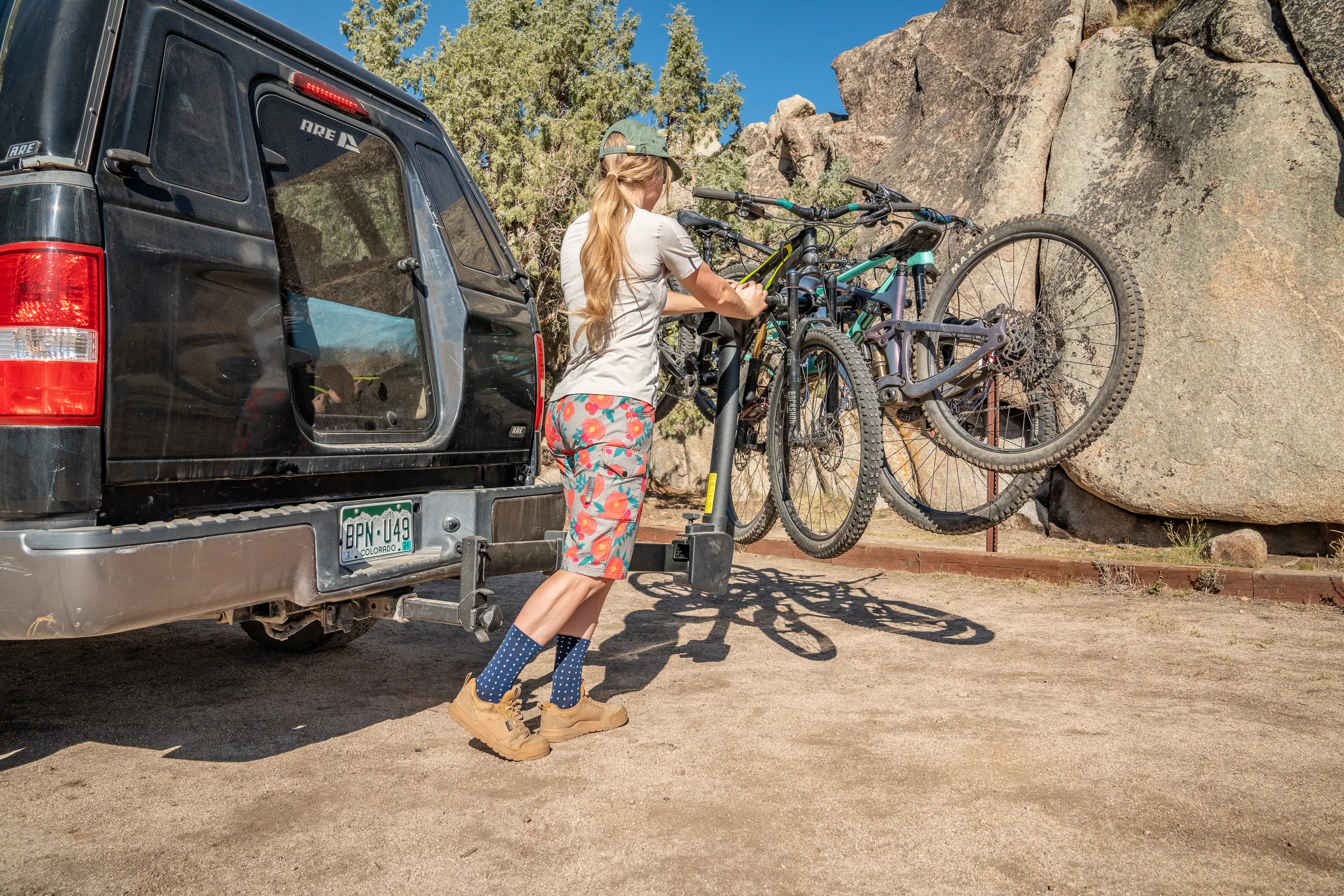



“Swing-away” refers to racks with the ability to pivot away from the vehicle to allow completely open access to the rear of the vehicle. This feature is available on some platform and hanging racks, and many brands sell swing-away attachments that can be added to the rack of your choice. These attachments can be expensive and add to both the price and weight of an already expensive and heavy rack, but the convenience can be hard to beat for some users.
Our favorite swing-away rack is the BackStage from RockyMounts. It swings a full 180 degrees away from your vehicle — even with bikes loaded — giving you unobstructed access to whatever’s back there. This is a great option for those with camper vans or who use their trucks for camping.
Wheel Size, Tire Width, and Bike Length Compatibility
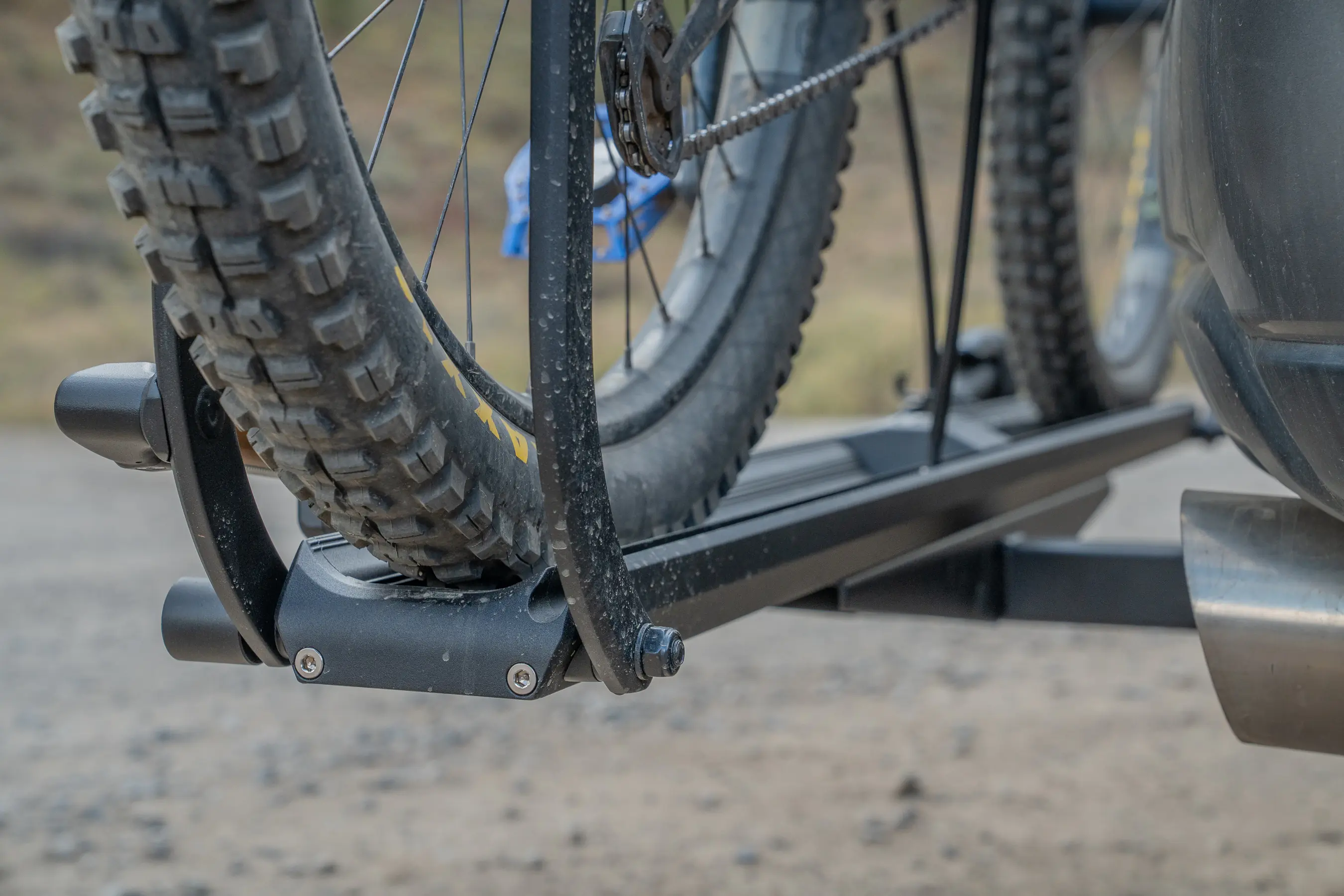



A bike rack is useless if it can’t hold your bike, so make sure your bike will fit. Important things to consider here are the size of the wheels, the width of the tires, and the wheelbase length of your bike(s). Most platform racks fit a range of tire widths and wheel diameters, but some are more versatile than others.
Because platform racks secure the bike via the tires, it’s important to make sure that your bike’s tire width, wheel size, and wheelbase all fall within the rack’s parameters. When shopping for a platform rack, check the technical specs listed on the rack brand’s website. Most companies will list a range of wheelbases, tire widths, and wheel sizes that fit that rack’s specs. In some cases, brands will also sell adapters or kits to accommodate fatter tires.
Since hanging racks support bikes by the frame, their tire width, wheel size, and wheelbase are not an issue. The bigger concern with hanging racks is unique frame types like BMX bikes, step-through frames, and full-suspension mountain bikes. These can prove a pain (or impossible) to hang on a hanging rack.
Fortunately, several of the racks we mention will work with fat tires and long wheelbases. Peruse our list and make sure that the one you’re considering will work with your bike.
Hitch Receiver Size
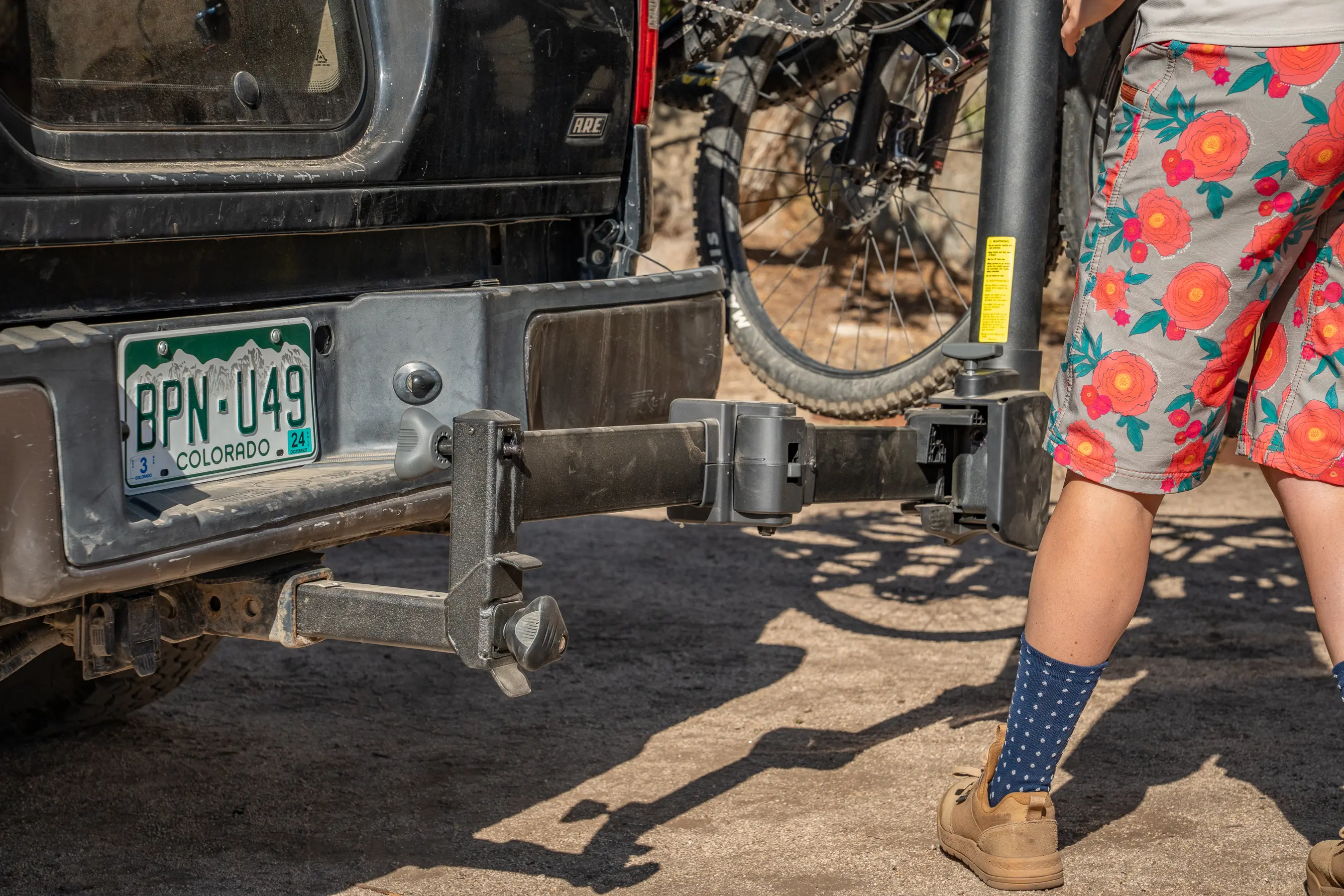



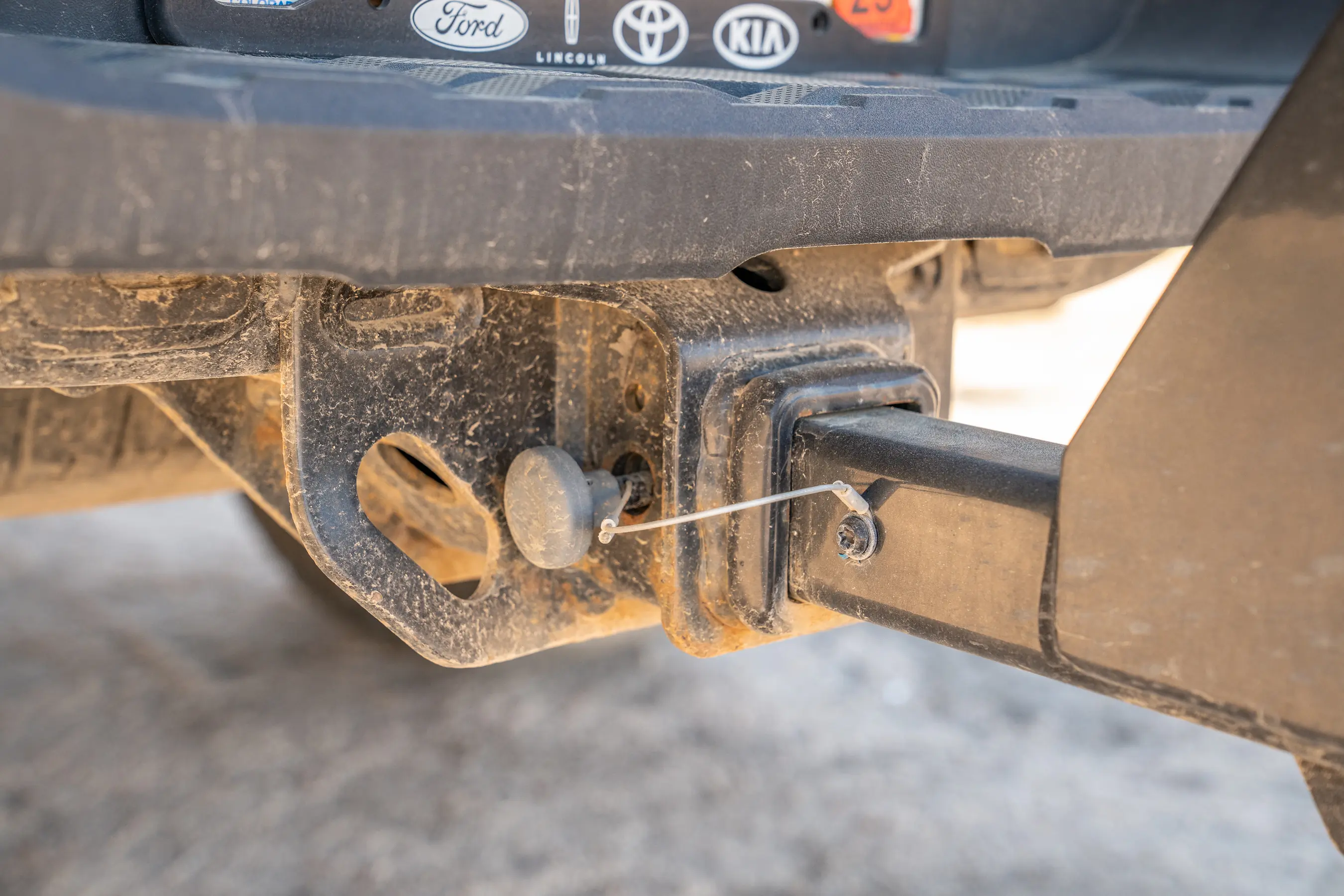



Hitch receivers on passenger vehicles will be either 1.25″ or 2″ sizing. It’s important that you verify which size your vehicle has prior to purchasing a bike rack. The two sizes are visually very different, so it is fairly obvious which is which. If in doubt, measure!
The larger, 2-inch hitch receiver is generally preferred because it can handle heavier loads, which is great if you plan to carry several heavy e-bikes. It’s also worth noting that some racks come with an adjustable system to fit either size.
Don’t have a hitch receiver? They can be ordered online to fit most vehicles and be installed at home if you’re willing or able to do it yourself. Otherwise, check out a local U-Haul or vehicle mechanic who will probably be able to take care of it for you.
Security
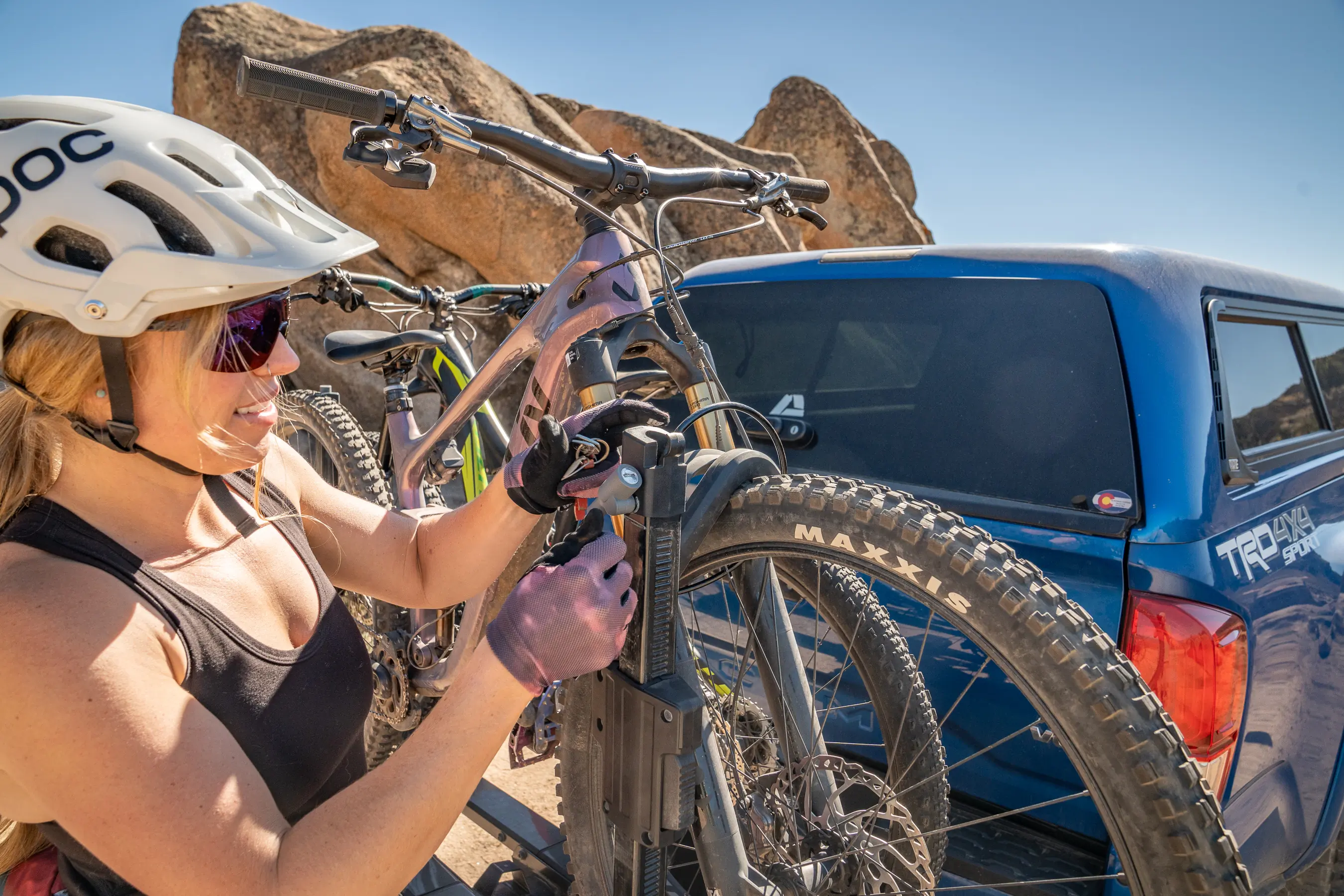



Bike racks have two main points of vulnerability when it comes to theft: the bikes can be stolen off the rack, and the rack itself can be removed. This isn’t just an issue if bikes are on it; the racks themselves can be coveted items for potential thieves.
Remember, if you have to head into a store or you’re spending the night away from home, it only takes a few seconds for a thief to pull your bike off the rack and pedal off with it. If they’re prepared with tools (or not, for mounts with hand-tightening hitch mounts), someone can take your entire rack. This can be a huge issue if you don’t have a garage to park in, particularly if you don’t want to put on or take off your rack every time you ride.
Fortunately, many racks come with a locking hitch mount, which makes it impossible to unscrew when engaged. If your rack doesn’t come with one, many companies sell mount locks separately. There are also plenty of aftermarket hitch locks available for purchase.
As for your bikes, integrated or included locks are a nice feature to have and are often found on higher-end racks — companies like Thule, Kuat, and Yakima usually offer this. The lock is integrated into the rack itself, retracting into the rack when not in use. When you need it, simply pull it out and thread it through the bikes. It then locks to another part of the rack, so you can lock and unlock your bikes in seconds.
Even if a rack has integrated locks, they are still little more than a theft deterrent, so we always recommend adding an aftermarket lock as another layer of security.
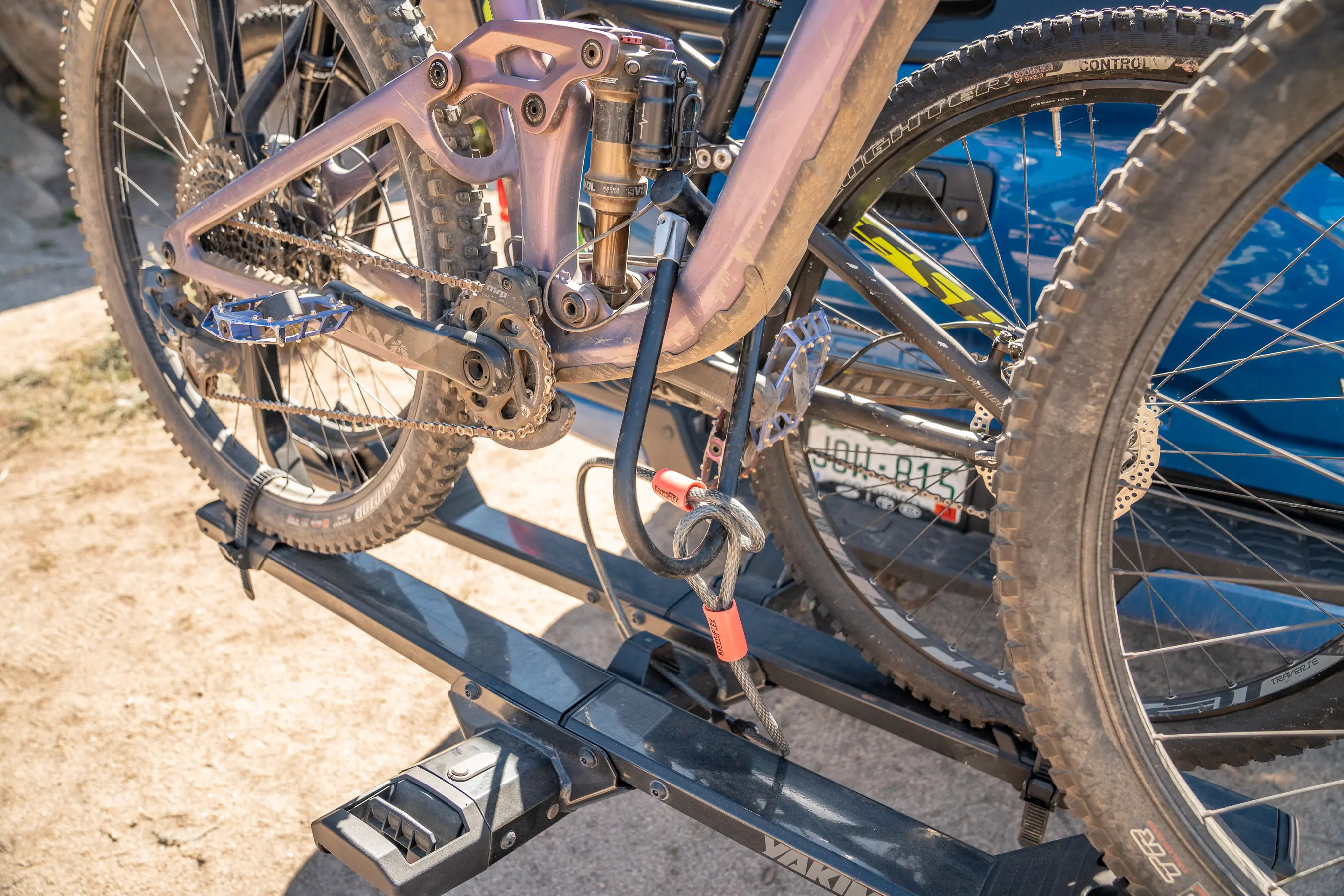



Ease of Use
If you’ve ever had to wrestle a full-suspension mountain bike onto a hanging rack or find a way to Tetris four bikes onto a poorly designed rack, you know that ease of use is a huge factor in choosing the right bike rack.
For a traditionally shaped frame — triangular in shape — hanging racks provide a simple option. Lift the bike, slide it onto the rack, strap it down, bungee the front wheel, and you’re good to go. (Plus, it gives you a chance to get some bicep curls in before your ride.)
However, if you’ve got a heavier bike or one with a unique frame style, a platform rack may be the better option for mounting bikes. Because it has a lower loading height, you don’t have to lift the bike as far. And once you have it on, you don’t have to lift it much to adjust. Hanging racks can take a bit of fiddling to get the bike into the cradle.
It’s also important to consider other factors like tilt-release and swing-away features that may impact your experience, as well as the bike attachment systems themselves.
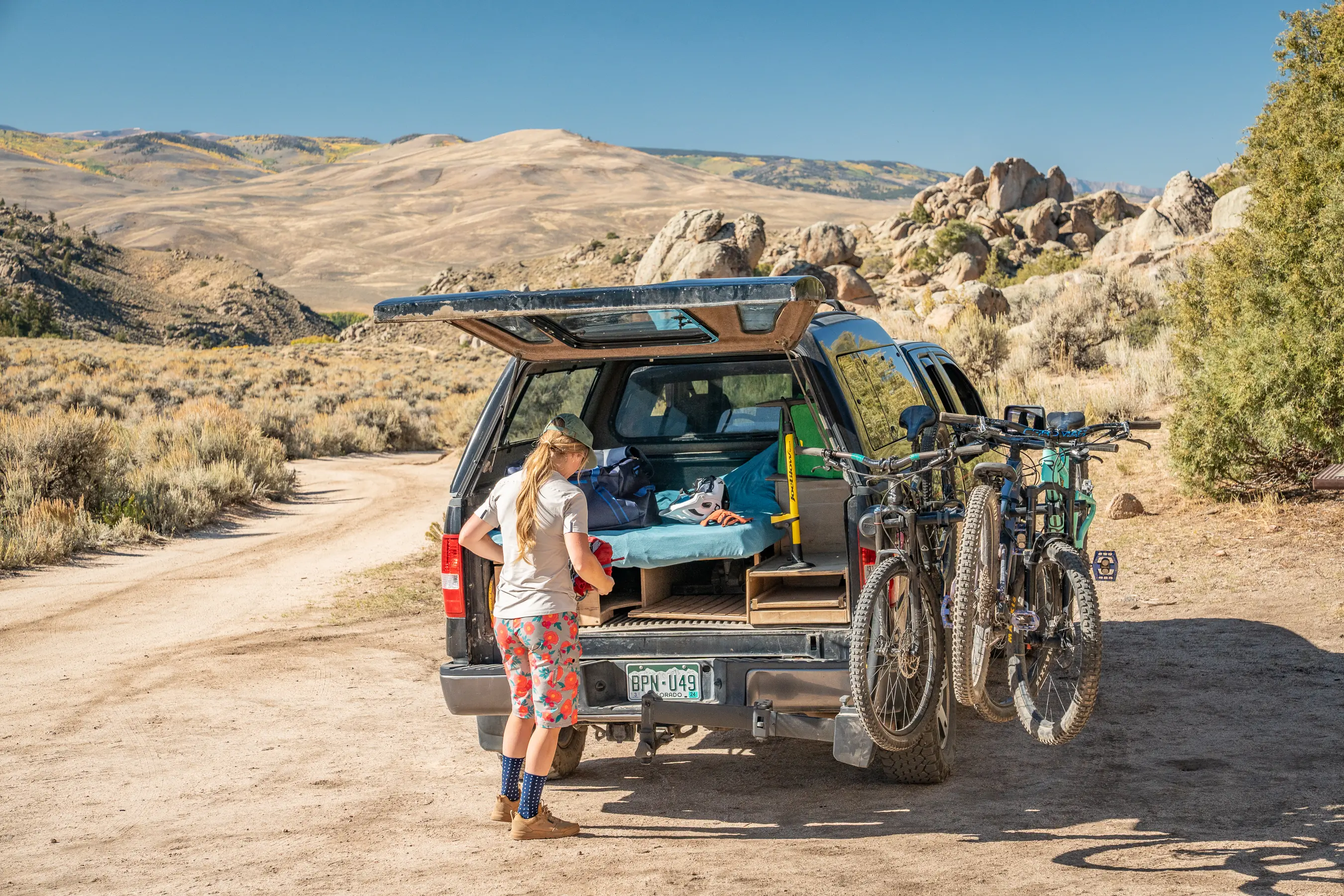



Durability
Durability is a huge consideration when it comes to hitch racks. The single attachment point puts a lot of pressure on racks as they carry loads over rough roads. Because they’re usually made from sturdy material like steel, breaks very rarely occur at the hitch’s attachment point.
Issues usually occur at the attachment point of the bike — the shepherd’s hook or the straps. Fortunately, the most common failure is the least disastrous and easiest to fix — the straps. Elastic straps tend to dry out, especially if exposed to the sun, which leads to cracking and eventually snapping.
The same goes for the hard plastic straps on ratcheting systems. Though they tend to be more sun-resistant than elastic ones, hard plastic straps can also dry out and crack. Again, it’s not usually a huge issue, as they’re inexpensive and easy to replace.
Shepherd’s hook breaks, meanwhile, are very rare. These systems use one hook per wheel, so if one breaks, you’ll be dragging your bike to your destination. Replacement shepherd’s hooks are much more expensive and more complicated to replace. They’re also much bigger than a strap, so it’s not likely you’ll have a spare sitting in your car.
The most durable racks typically have more metal in their construction. Racks made by 1UP-USA are renowned for their durability, mostly due to their all-metal constructions. And, if something should break, they sell every part you could ever need to replace it.
When shopping for a bike rack, do your research. Check out the user reviews or talk to your local shop pro to see what experiences others have had.
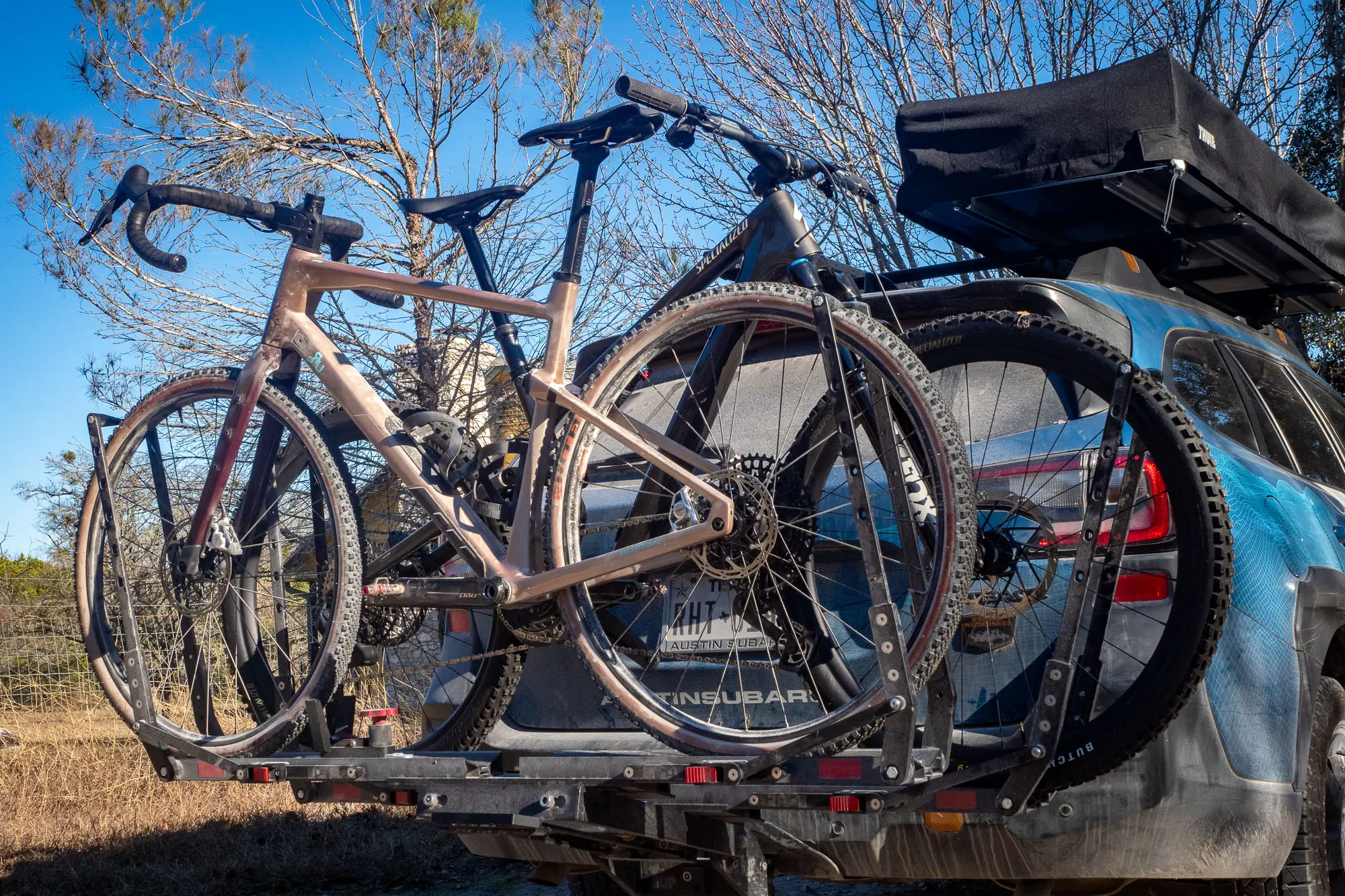



Price & Value
The price of bike racks varies from less than $100 to more than $1,000, depending on the model and features. The general trend we’ve seen is that the more expensive the rack, the easier it is to use, the more durable it is, and the safer it’ll keep your bikes.
Budget
In the hitch bike rack market, anything under around $400 is in the budget category. Typically, these are hanging-style racks that support bikes by the top tube of the frame. While they are a bit less refined, they are perfectly functional for infrequent users or even frequent users, assuming you aren’t too concerned about your bike frame contacting the rack or the bikes potentially coming into contact with each other.
The least expensive rack we’ve tested is the Allen Sports Deluxe Hitch Bike Rack ($190), which can carry four bikes up to 35 pounds each. If you’re on a tight budget, there’s no more affordable rack to transport four bikes that we’ve seen.
Similarly, the Swagman XC2 ($150) is a fraction of the cost of other tray-style hitch racks. Again, it isn’t the most refined and the clamps make contact with the top tube of the frame, but otherwise, it carries two bikes, works well, and is easy to load.
Mid-Tier
Between $400 and $800 is the sweet spot for most users. The rack quality and ease of use are greatly enhanced compared to the budget options. These are mostly tray-style or platform racks that are easy to load, have a wide range of bike fit, and secure the bikes with no frame contact.
In this price range, the Kuat Transfer V2 ($549) strikes us as one of the best values out there. It can carry everything from road and mountain bikes or e-bikes up to 60 pounds, and the rack itself only weighs 37 pounds.
As we climb the price ladder, racks with special features like the swing-away capability of the Rocky Mounts BackStage ($800) can add serious convenience by providing wide-open access to the back of your vehicle. Or, in the case of the Thule T2 Pro XTR ($800), the rack is not only easy to use, but it has wheels to roll it and a tool-free system for installation and removal.
Premium
As you approach and go beyond the $1,000 mark, we get into premium bike rack territory. Most high-end racks either provide a more user-friendly experience, have more features, or carry more bikes. Most vertical hanging racks fall into this price bracket like the Lolo 6-Bike Rack with Foot Activated Tilt ($1,185).
While the price seems very high, you’d be hard-pressed to transport that many bikes at once any other way. The per-bike cost is actually quite reasonable, and it can carry virtually any bike you might have.
The most expensive hitch rack we’ve ever tried is the Kuat Piston Pro X ($1,389), which only carries two bikes. Fortunately, the finish of the rack, features, and ease of use are also better than any other rack we’ve tested. That doesn’t mean everyone should go out and buy it, but if you’re willing and able to afford it, we highly doubt you’ll be disappointed.
While less expensive than those racks, the 1Up Super Duty ($950) still isn’t cheap. Still, this bombproof rack is overbuilt and extremely sturdy. Not only is it made of all metal parts, but every part is replaceable. So, while the price of entry may be high, the durability of this rack means that you’ll still probably be using it in 10 to 20 years.
The new Thule Verse ($1,000) also fits nicely here. This rack builds on the legacy of the T2 Pro XTR but has refined ergonomics, greater bike compatibility, and is even more user-friendly. It costs significantly less than the Piston Pro X, which helped it earn our top rating, and we think it’s the best choice for most users.
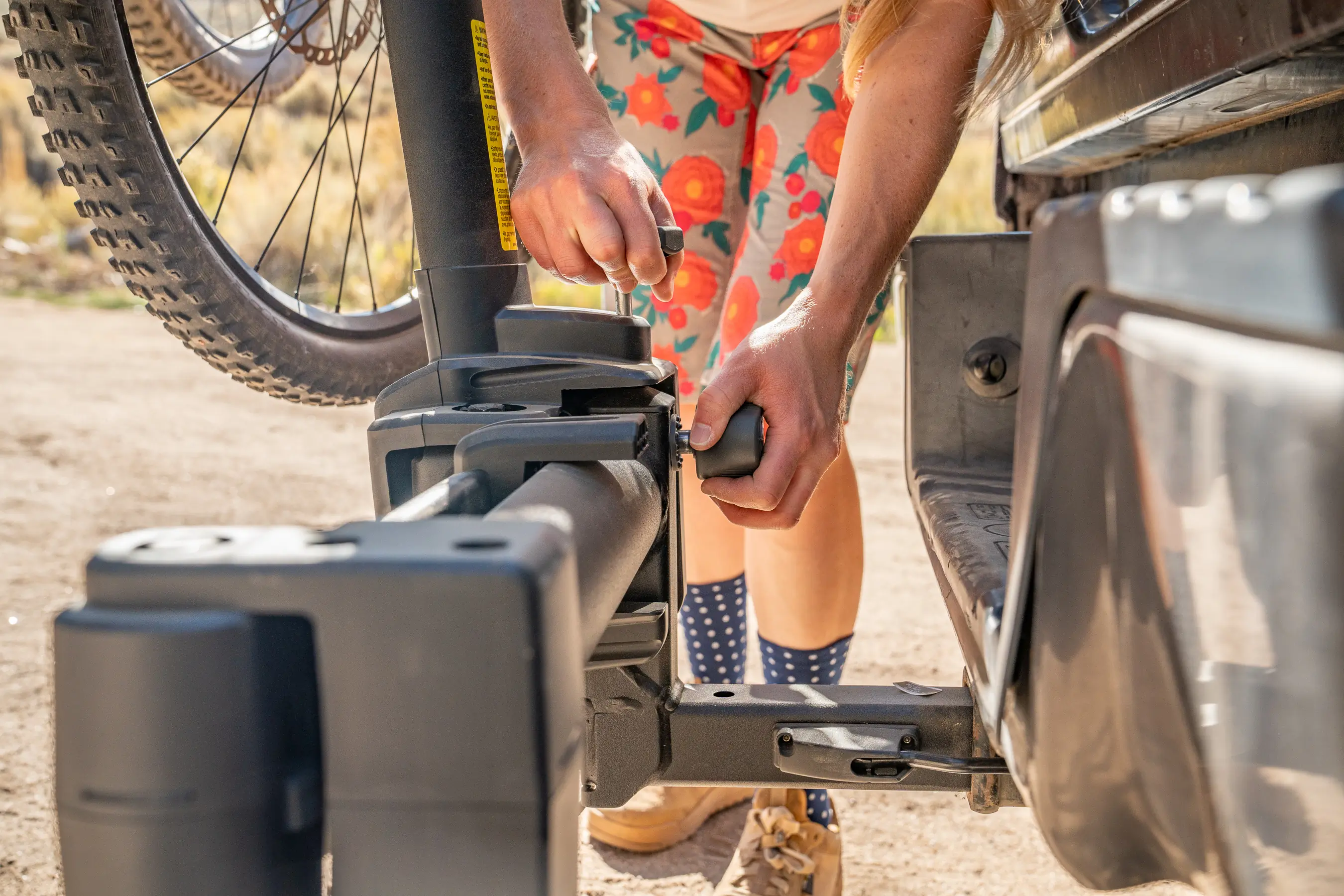



Frequently Asked Questions
The best hitch bike rack varies from person to person. With so many variables between each rider, it’s nearly impossible to choose one bike rack for every situation.
The best option is to decide what your needs are and pick a rack that works best for you. If your priority is finding a good, cost-effective rack, and you can pick up your bike and move it around without struggle, you can get a functional hanging rack for $100-200.
If keeping your bike safe and scratch-free is your main concern, a platform rack is a good choice. Platforms also sit lower to the ground, so it’s good for people who struggle to pick up their bikes.
The higher you go in price, the more features you get. High-end racks add security features, levers, and buttons that make them easier to use. They usually also offer ways to let you access your trunk without removing the bikes.
When choosing a rack, consider the features you’re willing to do without and which ones you need. Balance those needs with how much you’re willing to spend, and you’ll find the perfect rack for you.
Both hanging and platform racks have versions that can hold four bikes. Hanging racks require a little bit more finesse to keep your bikes safe, as they secure your bikes from the top. This makes it possible for the bikes to swing and hit each other during travel.
Fewer bikes can be spaced out, which minimizes the risk. But space is limited with four bikes, so ensure that the cradles are spaced out enough that the bikes won’t hit each other, even with minimal swing.
This is less of an issue with platform racks, as the bikes are locked into place via both wheels, adding a good amount of stability. It’s also easier to put the bikes on platform racks because the cradles are set so much lower. That aid, they cost a bit more, but we feel it is usually worth it.
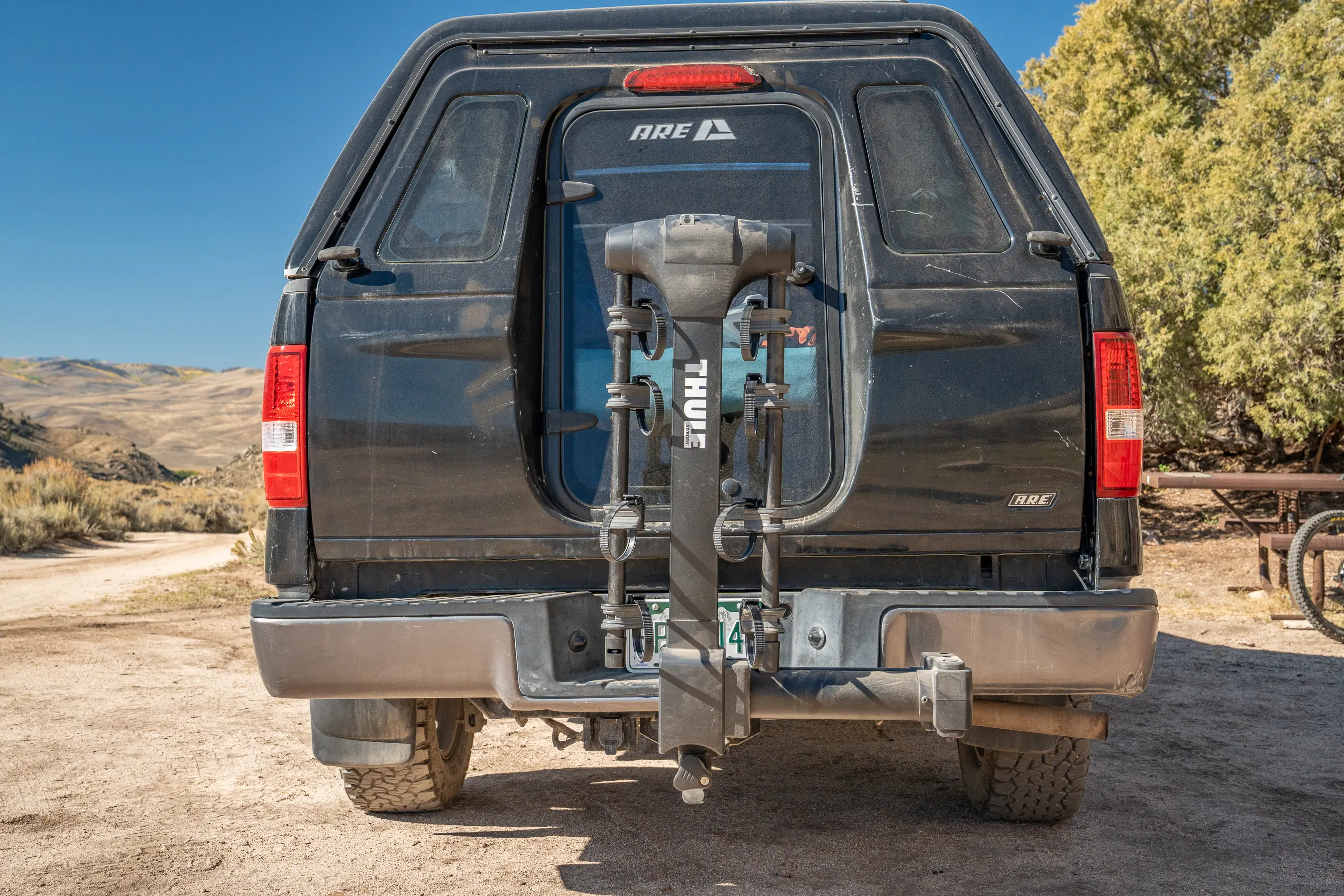



One of the reasons that so many people choose a hitch-mounted rack over a trunk-mounted rack is that the hitch doesn’t have any contact with the body of the car. This decreases any rubbing against the paint. It also generally keeps the rack away from anything on the body that it can dent or shatter.
However, no matter what precautions a company makes when designing a rack, there’s always the issue of user error. Opening your hatchback while the rack is on and upright can drive the hatch right into the rack.
This can cause denting and scratching to the rack or the car. Make sure the rack is out of the way when you access the rear of your vehicle.
Bikes can also contact your vehicle if you’re not careful. Platform racks sometimes carry the bike close to a vehicle’s back window. This can increase the odds of the handlebar going through that window on an especially bumpy road.
You can solve this by adjusting the cradles to make the bike sit farther away from the window. Hanging racks let the front tire hang free, which can lead to bumping and grinding up against your car.
It’s not as dire an issue as breaking a window, but it can damage the finish over time. It’s an easy fix, though. Secure the wheel with a strap or bungee cord to solve the problem.
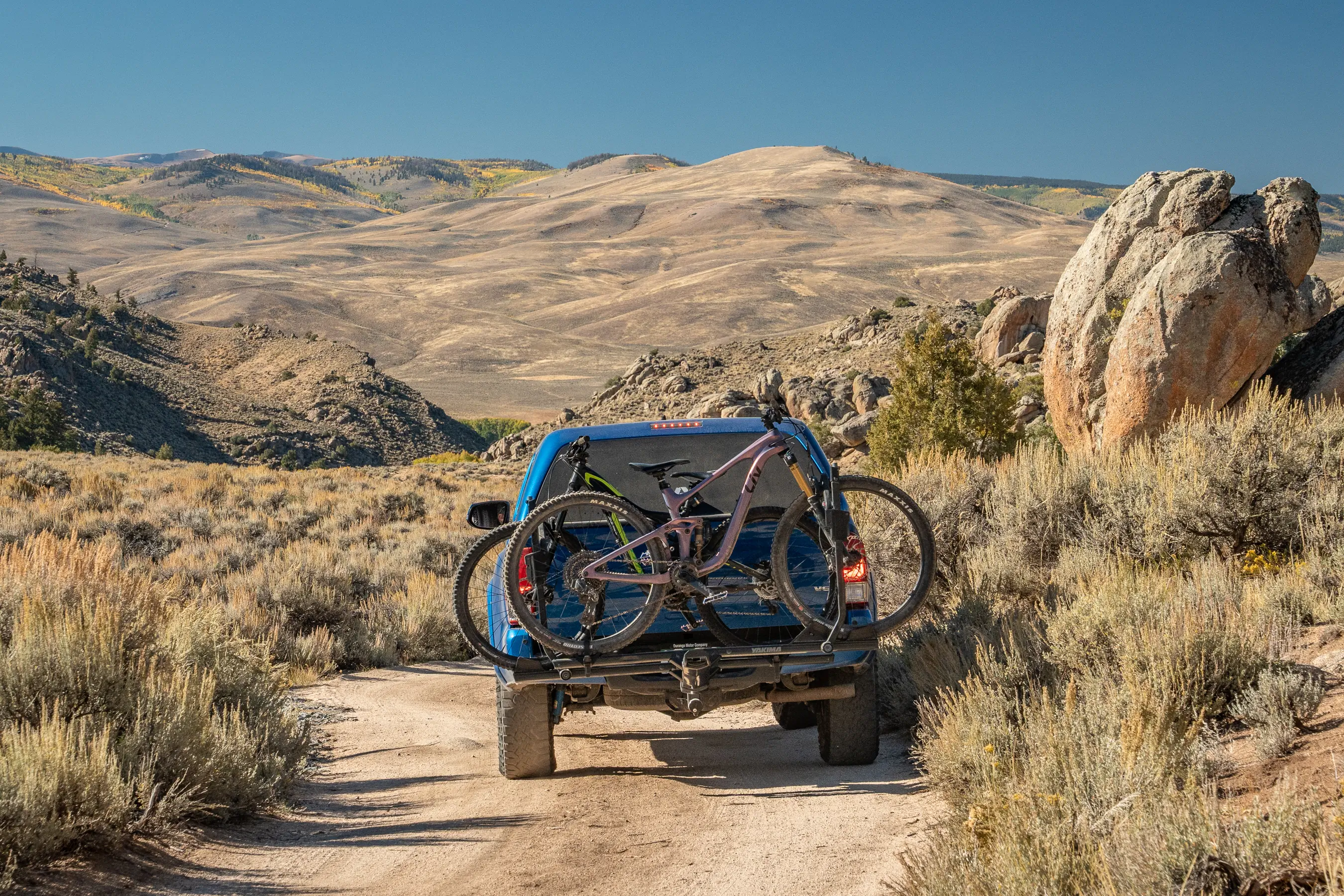



All types of hitch racks have their advantages. That said, platform-style racks are generally the easiest to use. They have a lower loading height and the attachment systems are typically straightforward, secure, and user-friendly.
Overall, we’ve found that brands like Thule, Yakima, Kuat, and 1Up tend to include little tweaks like lever-adjustable tilting and integrated locks. Details like these go a long way in making a rack easier to use. Of all the models we’ve tested, the Kuat Piston Pro X is the easiest to use, but it’s also the most expensive.
If your vehicle has the capability, hitch racks are arguably the best option. Having the mount attach to your hitch receiver versus trunk racks or roof racks not only protects your car’s finish from damage, but it’s also extremely secure, as the mounts are made of heavy-duty steel.
They’re also much easier to install than other options, which is a huge perk for people who don’t want a rack on their car every day. Because it’s secured with a steel pin, it only takes one step to put it on a trailer hitch when you are going out for a ride, and one step to remove it when you’re done.
Other types of racks require more steps to attach them to a vehicle and may require you to lift the bike higher to load them.
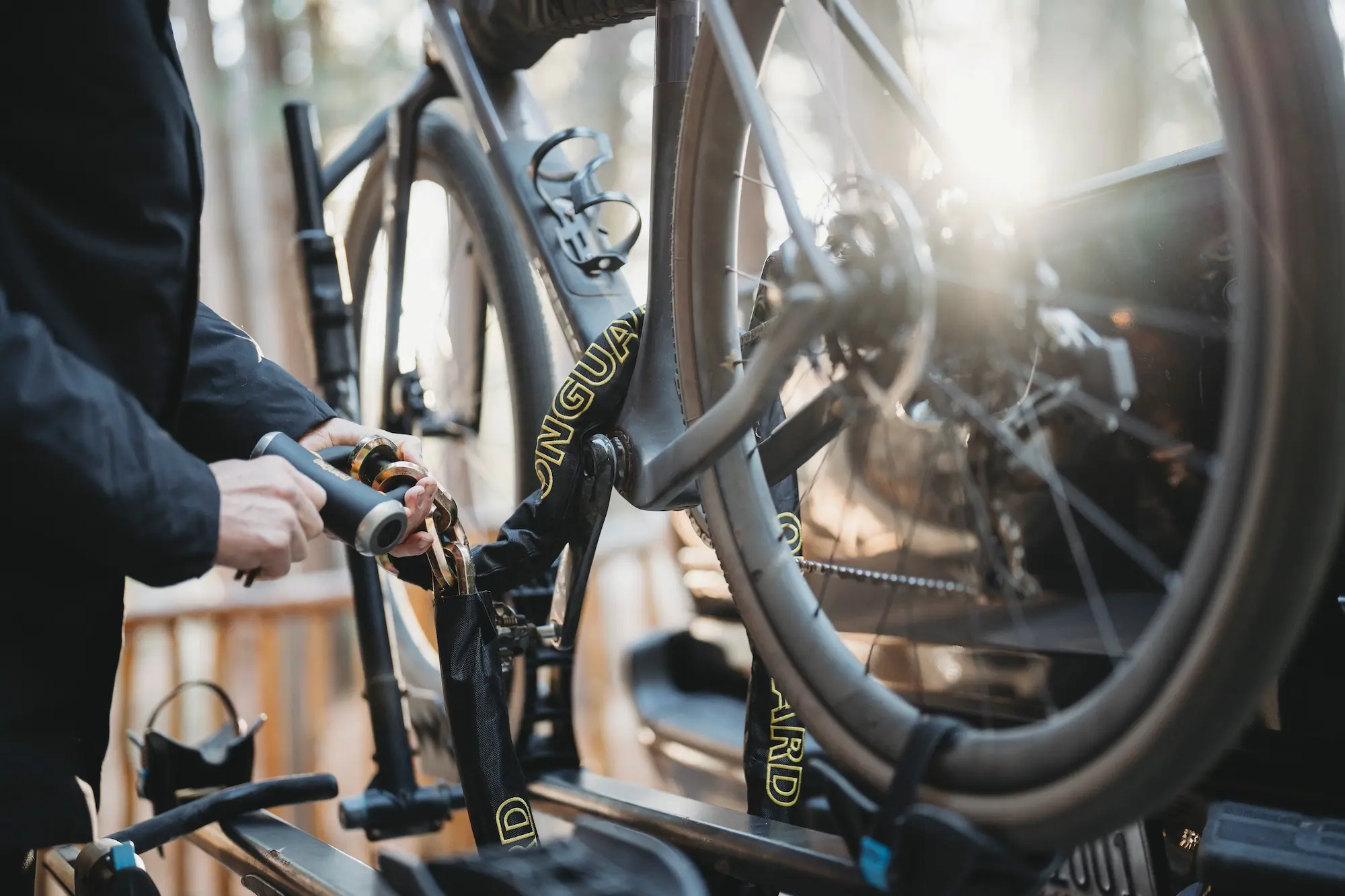

The Best Bike Locks of 2025-2026
We tested 18 bike locks from top brands like OnGuard, Kryptonite, Hiplok, LITELOK, and more to find the best.
